|
Publications and Activities
2016 - 2020 |
|
|
December 30, 2020 New Monthly E-Newsletter is Launched
December 30, 2020 Outreach to California Supreme Court on Disability Terminology
December 29, 2020 Team is Assembled to Review How Courts Award Conservatorship Attorney Fees
December 29, 2020 Op-Ed Article Calls on Supreme Court to Set New Tone on Disability Terminology
December 24, 2020 The Spirit of Giving: Tina Baldwin is Volunteering and Networking for Disability Rights
December 23, 2020 Podcast Internships Were Posted Today at Washington State University
December 22, 2020 Retired California Judge Writes to 58 Presiding Judges About Conservatorships
December 21, 2020 California Court of Appeal Publishes Opinion and Removes Antiquated Terminology
December 21, 2020 Different Abilities Group Reaches Out to Spectrum Institute
December 20, 2020 Outreach to California State Assembly's Commitee on Aging and Long-Term Care
December 19, 2020 Washington State University Students Invited to Apply for Internships
December 18, 2020 Op-Ed: Ending Disability Stigmas in Judicial Opinions
December 16, 2020 Request Filed to Remove Stigmatizing Terminology from a Court of Appeal Opinion
December 15, 2020 Request to Publish Opinion Filed with the California Court of Appeal
December 14, 2020 Donation Received Today -- There's Still Time to Get a 2020 Charitable Tax Deduction
December 13, 2020 Tina Baldwin Appointed to Abuse Workgroup of the Idaho Living Well Project
December 9, 2020 California State Bar Public Hearing on Competence and Discipline
December 7, 2020 A Request to the California Supreme Court to "Depublish" an Appellate Opinion
December 4, 2020 ABA Article on the
Right to Counsel in Guardianship Restoration of Rights Proceedings
December 1, 2020 Spectrum Institute
Has a New Facebook Page
Visit our Facebook page, hit "like" and leave a comment: click here.
November 24, 2020 Reaching Out to the
California Lawyers Association
November 19, 2020 Spectrum Institute
is Launching a Mental Health Project
November 18, 2020 Daily Journal Makes
Coleman Commentaries Available to the Public
November 18, 2020 Attorney Lanny
Davis Sends a Note of Appreciation
November 17, 2020 Daily Journal
Publishes Op-Ed on Jury Trials for Proposed Conservatees
November 16, 2020 Recognizing the Litigants and Attorneys Who Are Champions for Justice
November 14, 2020 Jury Instruction Guidebook Available for California Probate Conservatorship Cases
November 8, 2020 Interview with Thomas F. Coleman Added to the Disability, Abuse, and Therapy Page
November 6, 2020 Legal Newspaper Publishes Op-Ed Inspired by #FreeBritney Movement
November 5, 2020 Free Britney Rally Prompts a New Commentary on Capacity to Retain Counsel
November 3, 2020 Records Request on Conservatorships Sent to the California Department of Aging
November 2, 2020 Public Defender Goes the Extra Mile for Conservatorship Client with Down Syndrome
November 1, 2020 Bibliography of
Reports and Articles by Spectrum Institute's Legal Director is Now
Available A bibliography of reports and commentaries written by Thomas F. Coleman, legal director of Spectrum Institute, is now available online. These documents, published since 2013, focus on a wide range of issues, including: access to justice in conservatorship and guardianship proceedings, assessment of legal capacity, supported decision-making, disability and abuse, and the right to mental health therapy for individuals with cognitive disabilities. Each listing has a link to the book or commentary online. To access the bibliography, click here.
October 28 2020 Another Success in
Securing Counsel on Appeal for a Conservatee in California
October 25, 2020 Print and Broadcast
Journalism Focuses on Disability and Voting Rights
October 14, 2020 Presentation to
Washington State Legislative Committee
October 8, 2020 California Law
Revision Commission Needs a Legislative Nudge
September 30, 2020 Capacity Assessment
Webinar by Long Beach Bar Association
* Elder law attorney Cheryl Mitchel
says: “This report is a
must-read for anyone who wants to have a better understanding of why the
current conservatorship system is broken and the steps that must be
taken to improve it.” National reform advocate Dr. Sam Sugar,
calls the report a “landmark document” which “offers a sobering and
cogent analysis of how this ‘system’ intended to assist those in need
has instead become a tool of government overreach.” Rick and
Terri Black, founders of the Center for Estate Administration Reform
say: “This report addresses a critical component of adult
conservatorship adjudication. What process should be used to fairly and
appropriately remove a person’s rights?” Writing to the author,
Kevin Bigelow of the National Adult Protective Services
Association said: “You have pursued this topic with the same combination
of professionalism and ability to explain complex issues clearly that I
have seen in your other work.”
September 1, 2020 New Webpage: Disablity & Abuse / Disability & Therapy
August 1, 2020 Compendium of Commentaries is Updated
July 1, 2020 Capacity Assessment Report Sent to California Government Officials
In Memory of Jim Stream
June 8, 2020 Tina Baldwin Added to Board of Directors of Spectrum Institute
June 8, 2020 Washington Certified Professional Guardianship Board to Consider Spectrum Institute Materials
June 3, 2020 Capacity Report Distributed to Agency Officials in All 50 States The report titled "Capacity to Consent to Sex: Legal Standards & Best Practices for Adult Protective Services" has been sent to agencies that oversee Adult Protective Services programs in all 50 states. Officials have been asked to share the report with personnel who develop education and training programs for APS professionals. For a sample copy of the email, click here. For the list of officials recieving the request, click here. May 19, 2020 Oral Argument Today in Conservatorship Case Before California Supreme Court
The case is scheduled for oral argument on Tuesday, May 19, 2020 at 1:30
p.m. It is the second case on the afternoon calendar.
Argument can be viewed online. https://www.courts.ca.gov/35333.htm
The link to the webcast will go live about 30 minutes before the time of
oral argument. Counsel will appear remotely.
Amicus Curiae Brief of Spectrum Institute,
Tash, and Siblings Leadership Network,
May 12, 2020 New Report Released on Capacity to Consent to Sex
A
new report on capacity to consent to sex has received excellent reviews
from an adult protective services training professional and from a
former prosecutor with decades of experience in cases of abuse of elders
and dependent adults. The report is titled Capacity to Consent
to Sex: Legal Standards & Best Practices for Adult Protective Services.
Written and published by attorney Thomas F. Coleman, the report is being
made available without cost on the website of Spectrum Institute.
In addition to guiding APS workers, the report may help organizations
and agencies assisting sexual assault victims. Since the issues of
sex and capacity may arise in guardianship and conservatorship
proceedings, the report is also a resource for lawyers, court
investigators, guardians ad litem, and capacity assessment professionals
who are involved in such cases. To read or download the report, go
to:
https://spectruminstitute.org/aps-capacity-sex.pdf
April 23, 2020 Bettys' Hope Seeks Records from Superior Court in Los Angeles
April 22, 2020 Daily Journal Published Op-Ed on Capacity to Litigate The Daily Journal legal newspaper published a commentary today focusing on constitutional issues involved in the appointment of a guardian ad litem when a judge is concerned that a party to a case is “an incapacitated person” or lacks legal capacity to make decisions. The article mentions the work of the Capacity Assessment Workgroup of Sectrum Institute. It also references the case of Brad Lund as an example of the need for more clarity in California law concerning the criteria for incapacity to litigate and the procedures to be used in making such a determination. To read the commentary, click here.
April 13, 2020 Capacity to Litigate: New Reading Materials for Capacity Assessment Workgroup
April 3, 2020 Amicus Curiae Letter Filed in the California Supreme Court
February 18, 2020 Due Process Requires a Proposed Conservatee to be Present in Court
Congratulations to Gerald and Lisa for excellent advocacy in this appeal. To read the opinion, click here. The opinion was written by Court of Appeal Justice Kenneth R. Yegan (photo). Justice Tangeman and Presiding Justice Gilbert concurred.
February 18, 2020 California Civil Rights Agency Asked to Strengthen New Regulations
February 14, 2020 California Bill
Clarifies the Role of Appointed Attorneys in Limited Conservatorship
Proceedings
The bill would not help adults with developmental disabilities when
judges do not appoint an attorney for them – something that is happening
all too often in some courts in California. This gap should be fixed
with an amendment to the bill. Also, the bill seeks to strengthen
the process of exploring alternatives to conservatorship but misses the
mark on this score. It should be amended to define a pro-active role for
appointed attorneys in investigating less restrictive alternatives and
advocating for them in these proceedings.
January 27, 2020 Autism and
Conservatorships: Upcoming Lecture at UCLA
January 26, 2020 Final
Commentaries Sent to Capacity Assessment
Workgroup
January 20, 2020 Memo on
Assessment of Fiancial Capacity Sent to
Workgroup
January 19, 2020
Outreach to the California State Bar Board of Trustees
January 15, 2020
Memo on Medical Capacity Sent Today to Capacity Assessment
Workgroup January 13, 2020 Two Elder Rights Champions Become Advisors to the Guardianship Project
January 12, 2020 Personal Essay: Inspired to Include Abuse and Therapy in Guardianship Project Thomas F. Coleman heads up the Disability and Guardianship Project of Spectrum Institute. In this essay, Coleman explains how he was recently inspired to include the issue of abuse and the right to mental health therapy in the agenda of the Guardianship Project. Many people with intellectual and developmental disabilities are in guardianships and conservatorships. Many have been abused and are experiencing the lingering effects of that abuse. Others have mental health problems not associated with abuse but which nonetheless need to be addressed in therapy. Starting with a focus on California, the Guardianship Project will promote the civil right to mental health therapy for people with developmental disabilities, especially for those who are in conservatorships and who therefore must depend on others to locate qualified professionals and obtain such therapy for them. To read the essay, click here.
Legislative Outreach in Sacramento on
Right-to-Counsel Bill January 10, 2020 Spectrum Institute to Address the California Judicial Council Thomas F. Coleman, legal director of Spectrum Institute, will make a presentation at the January 17 meeting of the California Judicial Council in Sacramento. He will urge this rule-making body of the judicial branch to establish a pilot project for the management of appointed attorneys who represent seniors and other adults with disabilities in probate conservatorship proceedings. He will suggest that the project be modeled after a highly successful test program that centralized management of appointed attorneys representing children and parents in juvenile dependency proceedings. In that program, some 20 superior courts throughout the state surrendered management of these attorneys to the Judicial Council, thereby allowing local judges to adjudicate cases rather than spending time and resources to recruit, train, appoint, pay, and supervise attorneys who appear before them in dependency cases. For a copy of Coleman’s written submission, click here.
January 9, 2020 Op-Ed: Conservatees Are Legally Entitled to Better Therapy Options The Daily Journal has published a commentary by Thomas F. Coleman, legal director of Spectrum Institute, explaining how conservatees with developmental disabilities have the legal right to receive prompt and effective mental health therapy to treat trauma and other mental health conditions. Applied behavior analysis (ABA) procedures that attempt to change conduct are not a substitute for therapy that addresses the underlying causes of troubling symptoms. The denial of access to such therapy services can give rise to civil and criminal liability for conservators and are providers. To read the commentary, click here. January 6, 2020 Two More
Endorsements for Our Right-to-Counsel Bill
Valley
Mountain Regional Center and the Autistic Self Advocacy Network have
endorsed
the right-to-counsel bill developed and
promoted by Spectrum Institute.
VMRC
serves the following counties in California: San Joaquin,
Stanislaus, Amador, Calaveras, and Tuolumne.
January 4, 2020
A
communication was sent today to the Chairperson of the Fair Employment
and Housing Council of the State of California.
The Council establishes regulations to
guide the implementation of civil rights laws enforced by the Department
of Fair Employment and Housing.
One of those laws is Government Code
Section 11135 which applies the requirements of the Americans with
Disabilities Act to state funded entities.
Section 11135 and Title II of the ADA
apply to probate conservatorship proceedings and to the courts that
operate the state’s conservatorship system.
At a recent meeting of the Council,
Thomas F. Coleman presented the agency with several ways in which it
could exercise its jurisdiction to help ensure access to justice for
conservatees and proposed conservatees in these legal proceedings.
The communication today gives the
Council examples of how the ADA applies to various types of legal
proceedings and how it should apply to conservatorships.
For a copy of the email,
click here. January 2, 2020
December 27, 2019 A commentary written by Thomas F. Coleman a few years ago cited the heightened risk of abuse of people with disabilities as a rationale to use trauma-informed justice in guardianship and conservatorship proceedings. Further research has revealed that statistics comparing rates of abuse for children and adults with and without disabilities are both complex and nuanced. Coleman has written a new commentary calling for educators and advocates to use current and complete evidence-based data on disability and abuse as they make presentations to those who formulate or implement public policy in order to more effectively reduce risk and improve responses to abuse when it does occur. For a copy of the new commentary, click here. For an abstract of the commentary, click here. For an addendum regarding data from the Bureau of Justice Statistics, click here.
December 14, 2019 Many adults with intellectual and developmental disabilities are living under orders of conservatorship or guardianship. A high percentage of them need mental health counseling or therapy to address prior trauma or current psychological and emotional challenges. A growing body of literature on the subject holds promise for adults with I/DD who would benefit from such therapy. What is needed, however, is for more mental health professionals to become trained on how to provide therapy services to individuals with intellectual and developmental disabilities. To access a bibliography of 60 books written by 112 authors and co-authors on a variety of theraputic modalities, click here. For a bibliography of 49 articles and other educational materials written by 110 authors and co-authors, click here. Update (1-11-20): With the assistance of project advisor Barbara Imle, we were able to identify more than 460 professionals who have been approved by California’s 21 regional centers to provide mental health counseling and therapy for children and adults with intellectual and developmental disabilities. For access to our findings, click here.
December 7, 2019
December 5, 2019
Spectrum Institute issued a report today calling for new legislation to
be enacted in California to ensure that seniors and other adults with
disabilities receive proper legal representation when they become
entangled in probate conservatorship proceedings.
The report contains the draft of a
statute that would mandate appointment of counsel, clarify the role of
counsel, and direct the California State Bar to develop performance
standards to ensure that attorneys provide ethical and competent legal
services to this vulnerable class of involuntary litigants.
The protections promoted by the bill
are supported by several state and national organizations.
For a copy of the report,
click here.
November 29, 2019 A recent conversation between Thomas F. Coleman, legal director of Spectrum Institute, and Leah Wilson, executive director of the California State Bar, prompted Coleman to write a commentary titled “Making the State Bar Complaint System ADA Accessible.” The article cited several legal authorities that individuals other than a client may file complaints with the State Bar about attorney misconduct. Members of the public and other attorneys are authorized to do so. It encourages the board of trustees of the bar association to direct staff to receive and investigate such complaints. It also suggests that random audits should be done of the performance of court-appointed attorneys for conservatees and proposed conservatees as a way of making the benefits of the complaint system more accessible to litigants with cognitive disabilities. To read the commentary, click here.
November 20, 2019
The
Daily Journal legal newspaper published a commentary today written by
Thomas F. Coleman, legal director of the Disability and Guardianship
Project of Spectrum Institute.
The
article emphasizes the need for better legal services for seniors and
other adults with disabilities who are caught up in probate
conservatorship proceedings in California.
Current methods of providing counsel in conservatorship
proceedings are riddled with cronyism, incompetece, profit motives, and
violations of judicial and legal ethics.
A program used in juvenile dependency proceedings (called
“DRAFT”) may be a model worth considering for conservatorships.
The DRAFT program includes competitive bidding, caseload
standards, compensation rules, performance standards, and comprehensive
training programs.
For a
copy of the commentary, click here.
November 19, 2019
The
Disability and Guardianship Project of Spectrum Institute has notified
the ADA coordinator of the California Supreme Court of a conservatee who
needs an ADA accommodation in the form of the appointment of counsel to
represent her in a pending proceeding in the Court of Appeal.
A method is suggested whereby the
Supreme Court can transfer the case to itself, appoint counsel, and
transfer the case back to the Court of Appeal to process the appeal.
A previous ADA request to the Court of
Appeal was not acted on by that court, thus the outreach to the Supreme
Court.
For a copy of the notice and
supporting documents,
click here.
November 19, 2019
Thomas
F. Coleman, legal director of the Disability and Guardianship Project of
Spectrum Institute is having a phone conversation today with Leah
Wilson, Executive Director of the California State Bar.
The conversation is occurring in
response to outreach by Spectrum Institute to the State Bar on numerous
occasions over the past several years, the most recent of which was a
letter to the Board of Trustees last week.
Topics that Coleman is hoping to
discuss include: a lack of information about probate conservatees; the
denial of legal services to seniors and other adults with disabilities
in conservatorship proceedings; deficient legal services by
court-appointed attorneys; deficient legal education programs for these
attorneys; deficient judicial education programs and inexperienced
judges presiding over conservatorship proceedings; and the
inaccessibility of the complaint program of the State Bar to clients
with cognitive and communication disabilities.
For
a copy of these “talking points,”
click here.
November 14, 2019 Thomas F. Coleman, legal director of the Disability and Guardianship Project, is making a presentation today to the Judicial Council of California. His remarks include: (1) a reminder that courts have a duty, even without a request, to provide accommodations to people with disabilities to assist them in having effective communication and meaningful participation in court proceedings; (2) a notice that court rules and judicial education materials do not accurately reflect this obligation and are therefore not in compliance with federal law; (3) an admonition to act with all deliberate speed to correct these problems; and (4) a request to conduct a survey of all 58 superior courts to determine the number of adults in open probate conservatorship cases in California, the number of conservatees who cannot be located, the caseloads of court investigators, and the backlog of biennial investigations. The Judicial Council should take these actions for two reasons: (1) to show the judiciary cares about seniors and other adults with disabilities who are under the protection of the courts in conservatorship proceedings, and (2) to fulfill its legal obligations to this vulnerable population. For a copy of Coleman's written presentation and supporting materials, click here. As Chief Justice of California, the Honorable Tani Cantil Sakauye (photo) is Chairperson of the Judicial Council.
November 10, 2019
November 1, 2019
The
Daily Journal published a commentary today urging all three branches of
government in California to support a bill affirming the right to
counsel for probate conservatees, both in the trial court and on appeal.
The bill would recognize the right to retain an attorney of choice.
If counsel is not retained then the appointment of counsel would be
mandatory. These attorneys would act as zealous advocates to protect the
rights and interests of conservatees and proposed conservatees and would
have to adhere to performance standards to ensure access to justice for
their clients. To read the commentary,
click here. October 29, 2019 The Daily Journal legal newspaper published a commentary today written by Thomas F. Coleman, legal director of the Disability and Guardianship Project of Spectrum Institute. The article is titled “We Count What We Care About.” It admonishes the chief justice and the California Judicial Council for not keeping track of the number of seniors with cognitive challenges and adults with developmental disabilities who are under the “protection” of the 58 superior courts in California. It calls attention to the problem of “missing” conservatees -- vulnerable adults whose whereabouts are not known to the courts that are supposed to be protecting them. It also puts a spotlight on the unreasonably high caseloads of court investigators and the backlog of home visits they are supposed to make in each conservatorship case every two years. For a copy of the commentary, click here. To review the data gathered by Spectrum Institute, previous commentaries on this problem, and a letter to the presiding judge of the Los Angeles probate court, click here.
October 29, 2019 Spectrum Institute sent a communication today to the presiding judge of the Superior Court of the State of California for the County of Alameda. It questioned the ethics of the court allowing a legal services organization to provide advice to people planning to file conservatorship petitions against seniors and other adults with cognitive disabilities and then appointing the organization to represent some of the individuals who are the target of the petitions. Since the court itself is responsible for allowing this “dual role” to occur, this practice may constitute a violation of judicial ethics by the presiding judge as well as a violation of legal ethics by the attorneys who ae appointed. For a copy of the communication, click here.
October 14, 2019
Update: On November 19, 2019, a letter was
received from the Sacramento County Superior Court in response to our
letter to them. We were informed that as a result of our outreach to the
Judicial Council and to the superior courts, the problems we identified
regarding rule 1.100 and training materials on the ADA were being
studied by the Judicial Council. The Executive Officer of the Sacramento
court said that the information we provided to that court would be
shared with the presiding judge, other judicial officers, and staff of
the probate division. Whether this will translate into attorneys being
appointed to represent all conservatees and proposed conservatees
remains to be seen. For a copy of the letter,
click here. October 12, 2019
Several months ago, the Disability and
Guardianship Project of Spectrum Institute convened a
Capacity
Assessment Workgroup to review the capacity assessment process
currently used in California in probate conservatorship proceedings.
The workgroup will identify deficiencies in the process and,
after considering federal and state legal requirements, professional
best practices, and international trends, will make recommendations for
improvements to the system in California.
The legal director periodically has been sending reading
materials to workgroup members.
The materials are being posted online.
Readings for the remainder of the year have just been added to
the website.
To access these
materials,
click here.
October 10, 2019
October 4, 2019
Spectrum
Institute formed a Capacity Assessment Workgroup in April 2019. The
Workgroup,
consisting of 25 individuals from a variety of professions, regions of
the state, and life experiences, will assist the Disability and
Guardianship Project develop proposals to improve the capacity
assessment process used in probate conservatorship proceedings in
Califoria. Those proposals will have national relevance. The
Workgroup periodically receives
reading
materials to assist members understand the deficiencies in the
current process and to formulate ideas for improvements. For the
latest set of materials,
click here.
October 2, 2019 Spectrum Institute has written to the President and the Chair of Disability Rights California with a call for the organization to become involved in the conservatorship reform movement. Since the board of directors is searching for a new executive director, we thought this was a good time to focus on future possibilities for the organization. DRC has a $26 million annual budget, most of it coming from state and federal governmental sources. Considering its statutory authorizations and contractual mandates, it would be appropriate for DRC to participate in conservatorship reform advocacy activities. For a copy of the report we have sent to DRC requesting the organization to participate in the conservatorship reform movement, click here. October 1, 2019
The
Daily Journal, California’s premier legal newspaper published a
commentary today written by Thomas F. Coleman, legal director of
Spectrum Institute.
The
article focuses on actions of the Judicial Council of California which
run contrary to requirements of Title II of the Americans with
Disabilities Act.
The
rule-making body of the judicial branch has adopted a court rule and
published educational materials that misinform judges, court staff,
attorneys, and the public regarding the duty courts have to provide
accommodations for people with disabilities even when no request for
such has been made.
To read
the commentary, click here.
October 1, 2019
Spectrum
Institute has asked the State Bar of California to take appropriate
steps to ensure that new training requirements just adopted by the
Judicial Council of California are implemented effectively.
Unless training programs are pre-screened by the State Bar, the
proper education of court-appointed conservatorship attorneys will be
left to chance.
Since the
ultimate beneficiaries of the new training requirements are seniors and
people with developmental disabilities – individuals who generally won’t
know whether or not their attorneys are performing deficiently – the
State Bar should take pro-active steps to ensure that these attorneys
receive accurate and complete trainings.
This is part of the State Bar's duties under the Americans with
Disabilities Act to ensure effective advocacy services for clients with
cognitive disabilities. For a copy of the letter sent to
the State Bar,
click
here.
September 30, 2019
As
part of its investigation into how the Judicial Council is instructing
judges and court staff on their duties under the Americans with
Disabilities Act, Spectrum Institute filed a
records request asking for all
educational materials on the subject that have been developed or used by
the Center for Judicial Education and Research (CJER).
The Judicial Council
responded and gave us access to booklets, PowerPoint presentations,
videos, and other instructional materials.
We have reviewed all of the
materials that were provided.
None of them advise judges and court staff of their duties to
provide accommodations for known disabilities that interfere with
effective communication or meaningful participation in legal
proceedings, even if no request is made.
All materials imply that ADA duties only arise when a request is
made.
That implication is
contrary to federal law which is very
clear on the subject.
Spectrum Institute has written a
letter
to the Judicial Council to bring to its attention the omissions
misleading nature of these educational materials.
September 30, 2019
Spectrum
Institute sent a notice today to the ADA Coordinator of the Second
District Court of Appeal in California.
We informed the court that a autistic litigant with intellectual
disabilities was not being represented by counsel in a pending appeal
from an order of conservatorship.
We alerted the court to its duties under the ADA to ensure that
such a litigant will have effective communication and meaningful
participation in appellate proceedings.
The only way that can be accomplished is by the court appointing
counsel to represent her on appeal.
For a copy of the notice and supporting materials
September 25, 2019
The
draft of a bill securing the right to counsel for seniors and people
with disabilities in conservatorship proceedings was submitted to
California State Senator Thomas J. Umberg for consideration.
Attorneys Thomas Coleman and Lisa MacCarley met with Senator
Umberg’s senior policy analyst Zack Keller in Sacramento.
Coleman and MacCarley requested Senator Umberg to author the
bill. If enacted, the measure
would require that counsel be appointed for all conservatees and
proposed conservatees during active legal proceedings, clarify that
counsel should act in the role of a zealous advocate, and direct the
State Bar to develop performance standards for these attorneys.
September 24, 2019
September 24, 2019
September 24, 2019 In
response to requests made by Spectrum Institute nearly five years ago,
the California Judicial Council is adopting new rules on mandatory
training for court-appointed attorneys in probate conservatorship
proceedings.
While this new framework is good, more
action is necessary in order for the intended beneficiaries of the new
rules -- clients with disabilities -- to actually benefit.
As matters now stand, lawyers
representing seniors and people with disabilities will be free to
utilize or ignore the information they learn.
To make the new rules meaningful and
effective, the contents of the training programs must be carefully
scrutinized by the State Bar, performance standards must be adopted by
the Supreme Court, and monitoring mechanisms put in place.
For an op-ed article recently
published on this subject,
click
here.
September 5, 2019
July 17, 2019 Juliette Fairley: Noted Journalist Educates the Public About Guardianship Abuses and the Need for Major Legal Reforms
July 1, 2019 Brief Educates California Supreme Court Justices about the State’s Dysfunctional Probate Conservatorship System and the Need for Reform
UPDATE: (7-16-19) The Chief Justice signed an order granting permission for our brief to be filed with the Supreme Court. As a result, the justices will learn about the systemic flaws and systematic injustices in the probate conservatorship system. Hopefully, once they absorb this information, the court will use its administrative authority to make some changes to the system, over and above whatever they may do in this individual case.
June 2, 2019 Michigan Attorney General Focuses on Guardianship Reform Michigan Attorney General Dana Nessel (photo) recently announced the formation of an Elder Abuse Task Force to investigate deficiencies in and recommend reforms to the adult guardianship system in that state. Two members of the Michigan Supreme Court will serve on the Task Force. With the support of the Chief Justice, these justices are focusing on three issues: (1) whether there are proper legal procedures being followed; (2) whether the system is sufficiently transparent and accountable; and (3) whether there is appropriate education and support for judges, attorneys, and guardians so they can fulfill their respective roles. After learning of this action in Michigan, Spectrum Institute has written to the California Attorney General to follow up with prior requests to him by a variety of organizations for action by his Department of Justice to investigate systemic deficiencies in the probate conservatorship system in California.
May 22, 2019 California Judge Orders Gay Conservatee Removed from Abusive Spouse The Orange County Register reports that a judge in Riverside County has issued an order removing Sean Spicer as the conservator of Ryan Morris. Ryan is a young adult with serious intellectual disabilities who was placed into a conservatorship several years ago. When mounting evidence indicated that Sean was abusing and manipulating Ryan, relatives of Ryan filed a petition to have Sean removed as conservator. After taking extensive testimony over several months, Judge Sunshine Sykes has just issued a ruling in the case. She found that ongoing abuse was in fact occurring. She also found that Ryan, who was married to Sean in a ceremony a few years ago, does not understand what a marriage is. Evidence at the hearing showed that at the time it occurred, Ryan thought the ceremony was a baptism. The judge has appointed the Public Guardian to act as temporary conservator and has given that office instructions to find a suitable place for Ryan to live.
May 4, 2019 O's Appeal: A Rare Chance to Educate the California Supreme Court
April 21, 2019 Washington Gov. Jay Inslee Can Stop Bad Guardianship Legislation The Washington Legislature is poised to pass a bill that repeals and replaces the existing statutory scheme regulating adult guardianships in the state. Unfortunately, the bill is retrograde. It dilutes protections for seniors and people with disabilities who are ensnared in these liberty-encroaching proceedings and gives more power over their lives to guardians. Spectrum Institute has exposed flaws in the measure and shared them with the governor and his staff. Guardianship reform advocates throughout the nation are contacting the governor’s office, and his presidential campaign staff, to ask Inslee to stop this bill in its tracks and send it back to the Legislature to rework it in the next legislative session. For more information about the bill and its flaws, click here. For an email to the governor from Cheryl Mitchell, a legal expert in Washington probate and guardianship law, click here. UPDATE: On May 21, 2019, the governor signed this bill into law. It becomes effective on January 1, 2021.
April 19, 2019 ADA Complaints Against Los
Angeles Superior Court Still Under Review by DOJ
April 18, 2019
Updates Requested from Chief Justices in California, Missouri, and
Washington
April 5, 2019 Lecture on "Conservatorships: Theory vs. Reality" at Stanford Law School Thomas F. Coleman, legal director of Spectrum Institute, will speak at Stanford Law School on April 25, 2019. He will be a guest lecturer in the Mental Health Law class which is co-taught by Professors Joseph Bankman and Alison D. Morantz. Coleman’s presentation is titled “California Probate Conservatorships: Bridging the Gap Between Theory and Reality." Students will learn how probate conservatorship proceedings are supposed to work in theory. Statutory and constitutional protections that should apply to these proceedings will be explained. With this legal framework in mind, students will learn the reality of how many judges, lawyers, and other participants are actually processing these cases – much to the detriment of seniors and people with disabilities. Finally, students will hear of efforts to close this gap between theory and practice. (Outline of Presentation)
April 2, 2019 Capacity Assessment Workgroup is Formed
Spectrum
Institute has formed a Capacity Assessment Workgroup to examine current
capacity assessment policies and practices used in California probate
conservatorship proceedings.
A report to elected official will
identify deficiencies and recommend ways to maximize the independence
and dignity of seniors and people with disabilities.
The report will also identify methods
to ensure that individuals whose rights are threatened receive due
process of law and have meaningful access to justice throughout the
proceedings.
For more information on the
workgroup’s mission and membership,
click here.
Diverse regions of the state are represented, with members living in the
following counties: Sacramento, Riverside, Nevada, Los Angeles, Santa
Barbara, Orange, San Diego, Contra Costa, Alameda, and Mono. March 2, 2019 Suggestions Given to Officials at Alameda County Superior Court On February 11, 2019, attorneys Tom Coleman and Tony Chicotel met with the Presiding Judge and the Executive Officer of the Alameda County Superior Court. Reforming probate conservatorship policies and procedures was the topic of our conservation. We suggested to the court that it should revamp ADA policies so that court personnel would be pro-active in assisting seniors and people with cognitive disabilities to participate in these proceedings. A follow-up email shared policies from the judicial branch in Georgia. We also discussed the need for a new court rule on appointment of counsel for conservatorship respondents. As a follow-up, we sent the court a framework for such a rule.
February 20, 2019 National Forum on Guardianship Reform Held in Florida Today
February 17, 2019 Austria Adopts Comprehensive Supported Decision-Making Law The government of Austria has replaced guardianship with supported decision-making as the primary form of protection and assistance for people with cognitive disabilities who face major challenges to their decision-making capabilities. The new legislation was adopted in response to prompting by the United Nations. Measures to reduce the risk of abuse are included in the legislative scheme. For a report on the new law, click here. Thanks to the International Guardianship Network for bringing this development to our attention.
January 20, 2019 Spectrum Institute Board Approves 2018 Annual Report
Spectrum Institute released its 2018 Annual Report today. For a copy of the 2018 Annual Report, click here.
January 16, 2019 Report Issued in Response to Film Screening and Forum in Oakland On January 11, 2019, Alameda County Supervisor Nate Miley sponsored a film screening and panel discussion on the need for conservatorship reform in California. He also convened a roundtable meeting of local agency officials to begin a conversation about systemic problems in conservatorship proceedings. The roundtable was opened by Miley, who then turned the meeting over to attorneys Thomas F. Coleman and Tony Chicotel to guide the discussion. As a follow up to the morning panel and the afternoon roundtable, Spectrum Institute has issued a report to Supervisor Miley to suggest a path forward to ensure access to justice for seniors and people with disabilities in conservatorship proceedings. For a copy of the report, click here. We are hoping that similar events will be held in other counties in 2019, especially in Los Angeles County where violations of the rights of seniors and people with disabilities in conservatorship proceedings are especially egregious. As Nate Miley has shown, all it takes is for one county supervisor to provide leadership on this issue in order to encourage movement down the path to reform.
January 9, 2019
Guardianship Used to Isolate Elderly Woman in Washington State
The NPR story describes how Jeanne Southall,
now 98, became entangled in a guardianship in Washington State and how
the guardian – a complete stranger – manipulated the law to separate
Jeanne from Catherine Gavin, her best friend of 20 years. The
court did not give Jeanne a lawyer during the guardianship proceedings.
Neither was she given a lawyer or even asked by the court what she
wanted when the guardian sought a “protective order” to prevent the two
friends from ever seeing each other. Isolation is a form of abuse.
Disability & the Law: A Compendium of Commentaries To read or download the commentaries, click here. December 27, 2018
Request for Civil Rights Hearings into Probate Conservatorship
System in California December 23, 2018
Alameda Supervisor Shines Light on Conservatorship Problems in California
December 21, 2018
ASAN Files Brief in Rare Conservatorship Appeal in California
December 19, 2018
A new law is needed in California to address these issues. To read the commentary, click here for a pdf version. A bill has been drafted and organizational sponsors are stepping forward.
Op-Ed Published Today in California's Legal Newspaper The Daily Journal legal newspaper published a commentary today questioning why more lawyers are not involved in advocacy for guardianship and conservatorship reform. The article, written by attorney Thomas F. Coleman, calls California's conservatorship process and guardianship procedures in other states a "rigged system" that oppresses seniors and people with disabilities. He compares it with the "rigged" criminal law system in the 1970s that ensnared and oppressed gay men who were entrapped by overzealous undercover police officers and convicted by judges who willfully ignored blatant constitutional abuses. For a copy of the article, click here. The Daily Journal is read by judges and lawyers throughout California.
December 4, 2018 Report on Guardianship Issued by Congressional Committee
Among its 13 recommendations, the report suggests that all parties to a guardianship proceeding should be trained on the signs of abuse. For highlights from the report, click here. The report was released after a hearing which culminated a year-long examination of ways in which state guardianship systems can be improved to better protect individuals subject to these and similar arrangements from abuse, neglect, and exploitation. One witness at the hearing was Karen Buck, Executive Director of the Senior LAW Center in Pennsylvania. She emphasized the need for judges to appoint attorneys to represent guardianship respondents and the need for more training of judges and attorneys on the importance of exploring less restrictive alternatives to guardianship. In response to the investigation and report, Senators Susan Collins (R-ME) and Bob Casey (D-PA) have introduced new legislation (S3669) titled the Guardianship Accountability Act. Among other things, the bill would establish a National Online Resource Center on Guardianship to be operated by the Elder Justice Coordinating Council. The Resource Center would publish model standards for state guardianship proceedings that are being formulated by the Department of Justice pursuant to the Elder Abuse Prevention and Prosecution Act enacted by Congress in 2017. The Resource Center would also promote the use of less restrictive alternatives to guardianship.
November 26, 2018 Reply to Sacramento Superior Court's Response to ADA Complaint
November 26, 2018 Administrative Appeal Filed with California Civil Rights Agency
November 17, 2018 Pursuit of Justice Receives Film Festival Award
November 12, 2018 Requests Made to the Chief Justice of California
A
letter and report were sent today to the Honorable Tani Cantil-Sakauye.
She was requested to use her positions as Chief Justice of the Supreme
Court and Chairperson of the Judicial Council to initiate actions
designed to improve the probate conservatorship system in California.
October 25, 2018 World Conference Delegates Hear that California Needs Major Reforms
Thomas F. Coleman, legal
director of Spectrum Institute, spoke at a plenary session of the World
Congress on Adult Guardianship today.
The conference was held in Seoul,
South Korea.
Coleman praised the
progress being made in Australia to bring its guardianship system into
conformity with Article 12 of the United Nations Convention on the
Rights of Persons with Disabilities.
He contrasted the legal improvements
in that nation with the antiquated conservatorship system in California
and the resistance of the state's judiciary to embrace proposals for
major reforms. For a summary of
his remarks, click here.
September 24, 2018 California Supreme Court Asked to Update Code of Judicial Ethics Spectrum Institute has asked the California Supreme Court to revised the Code of Judicial Ethics to clarify that judges should not control or direct legal services programs involving attorneys who appear before them in specific cases. A detailed report was submitted along with the request. The report explains how judicial management of legal services programs or judicial coaching of the advocacy methods of attorneys improperly interferes with the ability of judges to be impartial in deciding cases involving these attorneys. Judicial interference of this nature also has a tendency to contribute to ethical breaches by court-appointed attorneys who may be influenced by such judicial conduct. For access to the request and supporting materials, click here. Update: On September 25, 2018, the court referred the request to its Advisory Committee on the Code of Judicial Ethics for evaluation.
August 15, 2018 California Court is
Target of Disability Discrimination Complaint The Sacramento County Superior Court will
receive a package in the mail tomorrow. It contains two
complaints, several affidavits, and multiple exhibits to support
allegations that the court is violating the Americans with Disabilities
Act and the equivalent California state law. At issue is the failure of the court to appoint
attorneys to represent people with disabilities who are summoned to
court to defend their freedoms in conservatorship proceedings. At
stake in these cases is the right of adults to make important life
decisions – where to live, what to do with their money, what medical
care to receive, whether to marry, who to socialize with, etc.
Knowing that these individuals have actual or perceived mental and
communication disabilities, the court fails to appoint an attorney to
assist many of these involuntary litigants with their legal defense.
In many cases, seniors and people with developmental disabilities are
left to defend themselves – which, of course, the court knows they
cannot do because of the nature and extent of their disabilities.
So individuals representing themselves usually lose their cases and
their rights are taken away. The complaint and supporting materials argue
that an attorney must be appointed in order for the court to comply with
the ADA’s requirement that it provide “access to justice” to litigants
who have significant disabilities that would deprive them of meaningful
participation in their cases.
For more information about this matter and to
access the complaint, affidavits, and exhibits, go to:
http://www.spectruminstitute.org/Sacramento/
August 13, 2018 Conservatorship Reform: An Invitation to Disability Rights California Spectrum Institute has been at the forefront of conservatorship reform advocacy for some six years now. Over these years, we have invited various disability rights groups to participate in advocacy activities designed to achieve much needed reforms. The most well-funded of these organizations is Disability Rights California. We have just sent a commentary, and supporting materials, to the board of directors of DRC for its consideration. We would like to have an opportunity to meet with board members so that we can share with them our request that DRC put the issue of conservatorship reform on the organization's agenda. DRC could play a major role in protecting the rights of people with developmental disabilities who find themselves entangled in conservatorship proceedings in California. There is room for DRC and its staff to join a growing network of individuals and organizations at a conservatorship reform roundtable. Taking a role in conservatorship reform would be consistent with federal mandates for protection and advocacy agencies such as DRC. Priority should be given to ensuring that counsel is appointed for all conservatorship respondents and that court-appointed attorneys are properly educated on issues and procedures essential to providing effective advocacy in such proceedings. These are positions supported by national organizations and agencies such as TASH, The Arc and AAIDD, and the National Council on Disability.
Update: 9-5-18
Tom Coleman had a phone conference with staff at
Disability Rights California today.
He shared with them what Spectrum Institute is doing to promote
disability rights in conservatorship proceedings and to seek systemic
reforms to the state’s conservatorship system.
He invited DRC to join us in these efforts.
The invitation was met with silence.
He asked what DRC is doing to protect the rights of tens of
thousands of people who are already in conservatorships in California
and to ensure access to justice for the thousands who are targets of new
conservatorship petitions each year.
He learned that these areas are not on DRC’s agenda.
DRC staff said they may seek legislation next year to
require appointment of counsel for proposed conservatees in all cases.
We were told that DRC does educational outreach to groups
throughout the state to promote supported decision-making (SDM) as an
alternative to conservatorship.
After the phone call ended, we sent the staff a
link to our educational
program and materials on SDM and asked them to share their materials
with us.
No response.
We sent a follow-up request.
No response.
Therefore, we have concluded that despite receiving millions of dollars
in federal and state funds to protect the rights of people with
disabilities, and despite legislative, regulatory, and contractual
obligations to work in the area of conservatorships, DRC is not
allocating resources to protecting the rights of conservatees or to
promoting conservatorship reform.
July 27, 2018 Pursuit of Justice: Official Selection at Another Film Festival Our docmentary film has been selected for inclusion in the Docs Without Borders International Film Festival. It is one of several films selected to compete in the "Rev-Reform" category. Other films in this category are from Serbia, Switzerland, Turkey, and the USA. This web-based competition is dedicated solely to documentaries and docu-dramas. Winners will be announced on October 22, 2018.
Just Released: Digital Law Library on Guardianship and Disability Rights An updated compendium of more than 300 articles, reports, and educational materials on access to justice in guardianship proceedings has just been released by Spectrum Institute. The collection contains more than 2,500 pages of materials written by or produced by attorney Thomas F. Coleman over the last five years. The collection is dedicated to the memory of Mickey Parisio, the man whose alleged abuse by his conservators in 2012 was reported to Dr. Nora Baladerian who then referred it to Coleman, thus starting him down the guardianship reform path. To read the preface to the compendium, click here. To access the library materials, click here.
July 18, 2018 Official Poster Released for Pursuit of Justice Film
July 14, 2018 Thomas Coleman Scheduled to Speak at Autism Conference in Georgia
Spectrum Institute's legal director, Thomas F. Coleman, has been invited to speak at the Matthew Reardon Center Autism Conference in Savannah Georgia on Feburary 28, 2019. He will present at two breakout sessions. One will focus on the application of ADA rights and legal protections to guardianship proceedings. The other will explore safe and legal supported decision-making arrangements as an alternative to guardianship. For a description of the presentations, click here.
Colorado Film Festival Shows Pursuit of Justice Film Today
Our documentary film --
Pursuit of
Justice -- will be shown tonight at the Colorado
International Activism Film Festival in Denver, Colorado.
The film is a contender for one of the awards to be
announced later this evening. For more information about
the festival, and their summary of our film, click
here.
World Congress to Feature Our Pursuit of Justice Film
June 26, 2018 Precedent Set for Right to Appointed Attorney in Conservatorship Appeal The Second District Court of Appeal set an administrative precedent yesterday. It appointed counsel to represent a young woman in her appeal from an order placing her under a limited conservatorship. Limited conservatorship proceedings are reserves solely for adults with developmental disabilities. General conservators are available to any adult with cognitive problems (due to illness or accident) that deprive them of the ability to make major life decisions. There are virtually never any appeals by limited conservatees in California (see commentary), because no one will help them file an appeal and they don’t know that they can or that they should or how to do it. Therefore, this may be the first time the Court of Appeal was asked to appoint counsel in such an appeal. With the help of my colleague Jay Kohorn at the California Appellate Project, and the excellent groundwork done by public defender Susan Sindelar on the case, the issue came to the court’s attention in a positive framework. I supplied a commentary that hopefully played a role as well. A copy of the commentary is attached. Now we can get
to the substance of the appeal and make some good case
law on the rights of people with developmental
disabilities in these proceedings. This case involves a 19
year-old autistic woman who wants to return to her lifelong
home in Santa Barbara County and to make many, if not
all, of her own decisions. She does not want a
conservator. This appeal is rich with issues that, if
decided properly, can reshape how the cases are handled
in trial courts in the future. What a great
opportunity to make new case law.
June 3, 2018 New Missouri Law Makes Minor Changes to State's Guardianship System Senate Bill 806 was signed into law last week in Missouri. The bill makes a few minor changes in the state's guardianship system. It fails to address the major systemic flaws identified in a report distributed by Spectrum Institute to a statewide policy conference last year. That report was cited in a complaint filed by Spectrum Institute with the Supreme Court of Missouri. The complaint is under review by the court. For a short commentary analyzing SB 806, click here.
TASH Calls for Civil Rights Summit on California Conservatorships TASH, an international disability rights organization, has sent letters to both of the major contenders for California Attorney General. The letters call on the next Attorney General to convene a Civil Rights Summit on Probate Conservatorships, to be followed up with a Civil Rights Task Force on Probate Conservatorships. The summit and the task force would identify civil rights violations that are occurring in conservatorship proceedings and would offer solutions to better protect the rights of seniors and people with disabilities who are involuntarily drawn into such proceedings. Similar letters have been sent to these AG candidates by The Arc of California, the California Siblings Leadership Network, and the Coalition for Elder and Disability Rights. The campaign was initiated by Spectrum Institute.
May 21, 2018 Nancy O'Malley Shows Leadership on Conservatorship Reform Alameda County District Attorney Nancy O'Malley has decided to investigate claims that seniors are victims of financial and other abuses being systematically perpetrated by the conservatorship system in Alameda County. She has assembled a team of lawyers and financial exerts to conduct the investigation. This appears to be the first time that any elected official in California has taken a serious interest in the problem of abuses in the conservatorship system. For more information about what O'Malley is doing, click here to read a recent news story in the Oakland Post.
May 21, 2018 Teresa Anderson Becomes An Advisor to the Disability and Guardianship Project
Essay:
Sacramento Superior Court Has a Duty to Appoint Attorneys
to
Click here for an essay titled "Compliance with the ADA Requires the Sacramento County Superior Court to Appoint Lawyers for All Proposed Conservatees." As a public entity the court has obligations under regulations implementing Title II of the Americans with Disabilities Act which it is violating by not appointing lawyers to represent these litigants. The legal basis for the court's obligation to appoint counsel in these cases is spelled out in a section of the White Paper submitted by Spectrum Institute to the U.S. Dept. of Justice in 2015. Today we sent to the Sacramento Superior Court a request for records to verify whether the court has an ADA policy pertaining to its services, whether it has a complaint procedure for alleged violations of the ADA by the court, and whether the court has ever conducted a self-evaluation of services as mandated by ADA regulations. We will report the response when we receive it.
May 14, 2018 Response from Missouri Supreme Court Spectrum Institute received a letter today from the Clerk of the Supreme Court of Missouri indicating that our ADA complaint regarding the state's guardianship system is under review by the Supreme Court. Today we also mailed a request for records to the custodian of records of the Missouri Supreme Court seeking documents pertaining to the court's duties under federal ADA regulations.
California Siblings Group Joins Our Call for Civil Rights Summit The California
Siblings Leadership Network has sent letters to both of
the major candidates for California Attorney General
asking them to convene a Civil Rights Summit on Probate
Conservatorships next year. For the letter to
candidate Becerra, click here.
For the letter to candidate Jones, click here.
April 27, 2018 Spectrum Institute Director to Speak at International Conference
Attorney Thomas F. Coleman has been invited to make presentations at the Fifth World Congress on Adult Guardianship. The conference will be held on October 23-25 in Seoul, South Korea. For an abstract of Mr. Coleman's presentation, click here. The World Congress occurs every two years and is generally attended by about 450 delegates from dozens of nations
April 26, 2018 Letters Sent to Candidates for California Attorney General In May 2014, we sent a letter to the California Attorney General Kamala Harris reporting civil rights violations in the limited conservatorship system and asking for her, as chief law enforcement officer of the state, to take corrective action. No reply. In January 2017, we wrote a letter to the Attorney General nominee Xavier Becerra, asking him to open an investigation into these civil rights abuses once his nomination was confirmed. After delays and avoidance, we were told the AG's hands were tied because his office represents the officials who allow or participate in these civil rights violations. Today, we are writing to Dave Jones (above) and Xavier Becerra (left) -- the two major candidates for the office of California Attorney General in the November election. We are asking the winner of the election to sponsor a Civil Rights Summit on Probate Guardianships and to convene a Civil Rights Task Force on Probate Guardianships to study systemic civil rights problems in the conservatorship system and to make recommendations on how the state can better protect the rights of seniors and people with disabilities who become involved in these proceedings. Update (May 8, 2018): The Arc of California has sent a letter to candidate Becerra and a letter to candidate Jones to express support for our requests.
April 24, 2018 Records Request Sent to Texas Supreme Court Spectrum Institute sent a records request today to the Justice Nathan L. Hecht, both in his capacity as Chief Justice of the Supreme Court of Texas and as Chair of the Texas Judicial Council. The purpose of the request is to determine whether either entity has conducted a self-evaluation of the state's guardianship system to determine if it is in compliance or out of compliance with the mandates of the Americans with Disabilities Act or Section 504 of the Rehabilitation Act of 1973. This information will be useful in connection with the ADA complaint filed with the Supreme Court by Spectrum Institute a few days ago. To read the request, click here. Update (May 16, 2016): A letter from the Supreme Court of Texas indicates that the court has not conducted a self-evaluation of judicial services to determine if they comply with the requirements of the ADA.
April 22, 2018 Texas Official Tells Congress about Guardianship System's Failures David Slayton (left) is the Executive Director of the Texas Judicial Council. He testified last week before the Special Committee on Aging of the U.S. House of Representatives. Mr. Slayton's testimony disclosed serious deficiencies in the adult guardianship system in Texas and the documented failure of the judicial branch to stop financial abuses and lack of reporting by guardians. Spectrum Institute has taken excerpts from that testimony and supplied commentary explaining that Slayton's disclosures are tantamount to an admission by the state judiciary that it is failing to provide access to justice for people with disabilities as required by the Americans with Disabilities Act. To read the excerpts and our commentary, click here. Update: Two newspapers in Texas published stories on April 23 about the testimony of this official and how it relates to the ADA complaint filed by Spectrum Institute with the Texas Supreme Court. To read the story in the San Antonio Current, click here. To read the story in the SE Texas Record, click here.
April 16, 2018 Reaching Out Again
to the Department of Developmental Services A letter was sent today by Spectrum Institute to Diana Dooley, Secretary of the California Health and Human Services Agency -- the agency to which the Department of Developmental Services reports. Secretary Dooley is a member of the Cabinet of California Governor Jerry Brown. The letter, and enclosed materials, are an effort to prod DDS into fulfilling its responsibilities to provide guidance to and oversight of regional centers as they evaluate and prepare reports on adults with developmental disabilities in conservatorship proceedings. Spectrum Institute is attempting to get DDS to voluntarily comply with mandates of Title II of the Americans with Disabilities Act. Prior attempts over the past four years have been met with avoidance and resistance. We hope that Secretary Dooley can provide the incentives needed by DDS to get the director to work with us toward the goal of ADA compliance by the department. For a report on the responsibilities of DDS under the ADA in connection with regional centers and conservatorship proceedings, click here. Update: On April 23, we received a reply from the Assistant Secretary of HHS informing us that DDS is now reviewing the material we submitted to them last year and that the Assistant Secretary will get back to us in a month or two.
April 13, 2018 New Rule Proposed for Conservatorship Attorneys in California On November 17, 2014, leaders of Spectrum Institute and a small group of our supporters made a presentation to an advisory committee of the California Judicial Council at its headquarters in San Francisco. We had a big ask: adopt new rules to ensure access to justice for people with cognitive and communication disabilities who find themselves entangled in conservatorship proceedings. Although it is not as comprehensive as we had wanted, the Probate and Mental Health Advisory Committee released its proposal this week. The deadline for public comment is June 8. Did we get everything we wanted? No. Would this rule change, if implemented effectively, ensure access to justice for people with disabilities in conservatorship proceedings? No. But is the proposal a step in the right direction and an improvement over the status quo? Yes. Today the Los Angeles Daily Journal published a commentary by Thomas F. Coleman about the proposed new rule. It compliments the committee on its work, asks for two changes, and notes that there is much work ahead for conservatorship reform advocates in order to secure access to justice for seniors and people with disabilities in these proceedings. Work with the California State Bar on the details of training programs should be at the top of the agenda. For a copy of the commentary, click here. Correction: The commentary states that the proposal restricts the authority of local courts to impose greater training requirements. That is erroneous. In fact, such authority is retained by local courts. The Daily Journal editor and the advisory committee have been notified of the error and received our apology for the mistake. Follow-up: A letter was sent to the advisory committee today recommending that two issues be added to the training: disability and sexuality, and alternatives to conservatorship. For a copy of the letter, click here.
April 9, 2018 Guardianship Reform: An ADA Complaint to the Supreme Court of Texas
The complaint asks the Supreme Court to investigate documented deficiencies in the guardianship system, to acknowledge that litigants with disabilities are not being provided access to justice as required by the ADA, and to make modifications to policies and practices in order to bring the state's guardianship system into compliance with these federal nondiscrimination laws. "Access to justice" for people with disabilities is required by the ADA. The denial of such in Texas guardianship proceedings stems in large measure from two problems. First is the failure of the courts to appoint an attorney in about 10 percent of cases to represent respondents who have significant cognitive and communication disabilities, thereby precluding them from meaningful participation in their cases. The nature of their disabilities prevents them from advocating for or defending their rights. The second problem has been raised by some judges who report that even when attorneys are appointed, they are not prepared or qualified. They therefore do not provide effective representation (as required by the ADA). These ADA violations infect the entire case and call into question the fairness of the result as well as the process. Decision-making rights are sometimes surrendered or lost due to the failure of proper advocacy and defense. Less restrictive alternatives are sometimes not explored because an unprepared attorney does not make the system seriously consider such alternatives. A press release was issued today to call the attention of the media to these civil rights violations and our attempt to correct them. To review the complaint and related exhibits, click here. An informational copy of the complaint was sent to the United States Department of Justice. To read the letter to the DOJ, click here. Similar ADA complaints have been filed by Spectrum Institute with the Supreme Court of Washington and the Supreme Court of Missouri.
April 2, 2018 Screening of Pursuit of Justice at Autfest International Film Festival
The Second Annual Autfest International Film Festival will occur in Los Angeles on Saturday, April 28 and Sunday, April 29, 2018. The festival is sponsored by the Autism Society of America. The festival will be held at the Writers Guild Theater in Beverly Hills. Pursuit of Justice -- a new documentary film by Greg Byers on our advocacy for guardianship reform -- will be shown at the festival. Pursuit of Justice will be part of a block of short films shown on Saturday, starting at 10am. A ticket for this block of films costs $10. For information on how to buy a ticket online, click here. A reception, to be held on Sunday evening at 7:00 p.m., will honor the ABC series The Good Doctor, the Netflix comedy series Atypical, and Sony Pictures. For more information about the festival, click here.
Follow-up Letter Sent to Supreme Court of Missouri On September 25, 2017, Spectrum Institute sent a letter to the Supreme Court of Missouri complaining that the guardianship system in that state is not in compliance with the requirements of the federal Americans with Disabilities Act. State and local courts are public entities subject to Title II of the ADA. They are required to take steps to ensure that litigants with disabilities have effective communication and receive access to justice in these proceedings. With its administrative and supervisory authority over state and local courts, the Supreme Court has ultimate responsibility to make sure that these requirements are being met in guardianship proceedings. We never received a response from the Supreme Court. As a result, today we sent a follow-up letter to Chief Justice Zel M. Fischer (photo). For a copy of the letter, click here.
March 29, 2018 Materials Sent to California State Senate Spectrum Institute sent an email and attachments to Ms. Nora Lynn, a policy analyst for California Senator Hannah-Beth Jackson. Senator Jackson (photo) is the chair of the Senate Judiciary Committee. The materials document serious deficiencies in California's conservatorship system. Among the attachments are materials submitted to the Judiciary Committee in 2015: report, exhibits, commentary, letter of Dr. Nora J. Baladerian, and an article summarizing an oversight hearing conducted by the committee. The California Legislature has not yet addressed the issues raised by Spectrum Institute in 2015. Perhaps this will change in 2018.
March 22, 2018 Federal Agency Issues Report Calling for Guardianship Reform
News Story Focuses on Impact of "Incompetence Laws" on Voting Rights The Pew Charitable Trusts published a story today reporting that thousands of people with disabilities have lost the right to vote due to "incompetence" laws in many states. Gregory Demer, a 31-year old autistic man who lives in Los Angeles, was featured in the story. His photo appears below. The story was also published in Governing Magazine, the Huffington Post, and the Seattle Times.
March 15, 2018 Pursuit of Justice Included in Virtual Film Festival Our new documentary has been included in the Virtual Film Festival sponsored by THINK+change, a project of The Arc of Aurora in Colorado. To visit the film festival's webpage, click here.
National Council on Disability Considers Promoting Guardianship Reform
Release of Our Documentary Film on Guardianship Reform A press release was issued today announcing the release of our new documentary film on the need for reforms of the guardianship and conservatorship systems in all 50 states. For more information about the film -- Pursuit of Justice -- click here.
UPDATE (April 30, 2018): The film is being viewed in many parts of the word. The documentary has been watched by 1,292 people online. This includes more than 1200 people in all 50 states in the the United States, where it has been viewed the most in (top 10 areas): California, Virginia, New York, Texas, Wisconsin, Ohio, Missouri, Oregon, Utah, and the District of Columbia. About 70 people in 22 other nations have also viewed the film. These counties are Canada, Argentina, Honduras, Australia, Germany, Peru, United Kingdom, Israel, India, South Korea, Philippines, Poland, Sweden, Kazakhstan, Vietnam, Mexico, Netherlands, New Zealand, India, Yemen, Estonia, and Portugal.
February 16, 2018 Another Commentary on the ADA Obligations of Guardianship Courts The United States Department of Justice has not yet issued a guidance memo to assist state courts and their appointed agents in fulfilling their duties under the Americans with Disabilities Act. Mounting evidence throughout the nation that the rights of guardianship respondents are being violated by state courts underscores the need for such guidance. Until the DOJ publishes a memo specifically on guardianship proceedings, the best we can do is to direct state courts to ADA guidance memos issued by the DOJ to state courts in other types of proceedings. Today, we are releasing a commentary titled "The ADA and Guardianship Courts" which is based on a memo issued by the DOJ in 2015 in connection with the ADA obligations of courts in child welfare proceedings. A previous commentary -- based on a DOJ guidance memo regarding criminal justice proceedings -- was recently sent to the Chief Judge of the Maryland Court of Appeals.
Op-Ed: When Freedom from Abuse and the Right to Marry Collide A commentary was published today in the Los Angeles Daily Journal focusing on the need for all marriages to be premised on valid consent. The marriage discussed in the article involves a same-sex couple where one of the parties has intellectual and developmental disabilities. The Daily Journal is California's premier legal newspaper -- a publication read by judges, legislators, and attorneys throughout the state. Marriage is a personal relation arising out of a contract that may have significant financial consequences. The commentary was prompted when Spectrum Institute learned of a same-sex marriage involving a young man with serious multiple disabilities. A video of the marriage ceremony posted on YouTube depicts a situation where the young man does not seem to understand the significance of what is happening. At one point in the video he seems to think that it is a baptism ceremony. He is coached and coaxed through the ceremony. As a result of the marriage, the young man lost all of his federal SSI and Medicaid benefits. The commentary, which appeared on the front page of the paper, calls on the Riverside County Superior Court to evaluate the facts of the case to determine whether the marriage may be invalid due to mental incapacity to understand the nature and consequences of the marriage contract or due to lack of consent because of undue influence. The freedom to marry, as important as it is, must be balanced with the right of vulnerable adults to be free from abuse and exploitation. To read the commentary by Thomas F. Coleman, click here. Update: February 16, 2018. Following the filing of documents by Spectrum Institute providing the court with information relevant to the marriage and other matters in this case, the court entered an order directing Adult Protective Services to conduct an investigation and report back to the court. Update: June 5, 2018: After a trial that lasted more than two weeks, Judge Sunshine Sykes took the matter under submission on April 19, 2018. Having reviewed the evidence for more than a month, the judge entered an order on May 24, 2018 calling for more evidence. In her order, Judge Sykes directed that an evaluation of Ryan's capacity to consent to marriage be conducted by a qualified professional and she called for a home evaluation to be done.
January 31, 2018 Letter Received Today from DOJ Civil Rights Division Today we received a letter from John M. Gore, Acting Assistant Attorney General of the United States Department of Justice. Mr. Gore (depicted in the photo) heads up the Civil Rights Division of the DOJ. The letter responds to our outreach to the DOJ, both in person and in writing, asking the Department to issue a guidance memo to the states explaining how state guardianship proceedings should be conducted in order to comply with the Americans with Disabilities Act. The letter concludes: "We will keep your comments and proposals under consideration when developing future guidance." For a copy of the letter, click here.
January 29, 2018 Letter Sent Today to Chief Justice of Washington State A letter was sent today to Washington Supreme Court Chief Justice Mary E. Fairhurst in response to her letter of December 22, 2017 acknowledging receipt of a formal complaint filed by Spectrum Institute in November 2017 alleging that the state's guardianship system is not in compliance with the Americans with Disabilities Act. Along with the complaint we sent a commentary on how the ADA applies to guardianship proceedings. We also sent information on a specific case in which a 98-year-old woman has been denied access to justice by the judicial system in a guardianship proceeding and a protective order proceeding in Washington State. We included a summary of the facts of the case of Bonnie Jeanne Southall as well as excerpts of relevant provisions of the ADA that apply to her case.
January 23, 2018 Letter Sent Today to Maryland Chief Judge A letter was sent today by Spectrum Institute to Maryland Chief Judge Mary Ellen Barbera (in photo). The letter compliments the Maryland Court of Appeals for adopting rules governing performance standards and training requirements for court-appointed attorneys in adult guardianship proceedings. It also calls attention to the omission in the new rules of any reference to the Americans with Disabilities Act and the applicability of this federal law to the performance of judges, investigators, and court-appointed attorneys in these proceedings. The letter urges the court to amend the rules to make such a reference. Included with the letter is an essay on the topic written by attorney Thomas F. Coleman and a guidance memo issued by the United States Department of Justice on the application of the ADA to participants in the criminal justice system.
January 20, 2018 New Legislative Proposals in Missouri on Abuse and Disability The Missouri Association of County Developmental Disabilities Services has developed a set of legislative proposals aimed at abuse of people with disabilities. Some of the proposals emerged from presentations on disability, abuse, and guardianships last year by Dr. Nora J. Baladerian and attorney Thomas F. Coleman at a summit on victimization convened by The Arc of Missouri. To view the legislative package, click here.
December 29, 2017 Chief Justice Responds to ADA Complaint in Washington State Spectrum Institute has received a letter from the Chief Justice of the Washington Supreme Court acknowledging the ADA complaint filed with the court on November 8, 2017. Chief Justice Mary E. Fairhurst (photo) says she is discussing the issues raised in the complaint with the other eight justices on the court. She will get back to us after she has had an opportunity to gather information about these issues.
December 12, 2017 California Judiciary Working on Spectrum Institute's Proposals In November 2014, board members and project advisors traveled to San Francisco and met with the Probate and Mental Health Advisory Committee of the California Judicial Council. We brought to the committee's attention the many ways in which the limited conservatorship system in California is dysfunctional. We urged the committee to conduct a thorough review and to recommend that the Judicial Council adopt court rules and judicial standards to effectuate systemic changes that would ensure access to justice for people with disabilities who are caught up in these proceedings. http://disabilityandabuse.org/conservatorship/judicial-council.htm The committee did not recommend the creation of a task force to look into the entire limited conservatorship system, as we had requested, but it did initiate a review of how to improve the system through new court rules on education of judges as well as qualifications and continuing education requirements for court-appointed attorneys who represent conservatorship respondents. This review has been ongoing throughout 2015, 2016, and 2017. The committee's work agenda for 2018 suggests that new rules could be released for public comment in a few months and perhaps be adopted by the Judicial Council for implementation by January 1, 2019. The wheels of justice move slowly. According to the staff attorney for the committee: "The committee has reviewed the Institute’s proposals carefully. The committee has accepted, in principle, many elements of those proposals; it is working, under the procedures established by rule 10.22, to incorporate those elements into broader proposals related to appointment of counsel in all guardianship and conservatorship proceedings." Here is a link to this portion of the the committee's work agenda for 2018. http://disabilityandabuse.org/2018-project-pmhac.htm
December 7, 2017 Appointment of Counsel as an ADA Accommodation The annual conference of the National Legal Aid and Defenders Association will have a panel focusing on appointment of counsel as an ADA accommodation for litigants with significant cognitive disabilities. Spectrum Institute has been advocating for appointment of counsel as an ADA requirement in guardianship and conservatorship cases -- proceedings in which the respondents are alleged to have such significant cognitive and communication disabilities that they need someone else to make major life decisions for them. If the disabilities are that significant, then surely these respondents cannot represent themselves in court. They would need an attorney to ensure meaningful participation in their cases -- a requirement of the ADA. One of the participants on this panel, John Pollock, will distribute our Due Process Plus brochure explaining the ADA requirements for court-appointed counsel in guardianship proceedings. John is the coordinator of the National Coalition for a Civil Right to Counsel. For a copy of the brochure, click here.
New Decision on Facilitated Communication, Abuse, and Court Testimony
November 8, 2017 Preview of Pursuit of Justice Film in Seattle Today
We plan a nationwide release of the film in early 2018. The film will be used to generate greater public awareness of guardianship abuses. It will also be used to educate public officials, judges, attorneys, and disability rights advocates about the need for specific reforms to bring state guardianship systems into compliance with the access-to-justice requirements of the Americans with Disabilities Act. For a summary of the film, click here. November 7, 2017 ADA complaint to be filed with the Washington Supreme Court
The complaint invokes a procedure authorized by a federal regulation implementing Title II of the Americans with Disabilities Act. The regulation imposes a duty on the court to process the complaint pursuant to its administrative authority over the state guardianship system. An informational copy of the complaint is being sent to the Department of Justice in Washington DC, with a copy being hand delivered to the office of the United States Attorney in Seattle. Pursuant to his request, a copy is also being sent to the Washington State Deputy Attorney General who represents the Supreme Court and the Administrative Office of the Courts. The AOC operates under the direction and supervision of the Supreme Court. Representatives of Spectrum Institute will meet with the United States Attorney's Office on November 8 to brief the Assistant Attorney General on ADA violations occurring in the guardianship system in Washington State and the complaint being filed with the Washington Supreme Court. A similar meeting will be held that day with staff at the Seattle office of Disability Rights Washington. For more information, go to: http://spectruminstitute.org/Washington/ November 3, 2017 The Arc sends a letter to the Missouri Supreme Court A letter was sent today from The Arc of Missouri to the state supreme court calling its attention to perceived ADA violations in the guardianship system. The letter, signed by chapter president Ed Thomas (photo), encourages the court to convene an advisory committee to develop ways to bring the guardianship system into compliance with federal law. The letter asks the court to include self-advocates and advocacy organizations as members of such an advisory committee. To read the letter, click here.
November 1, 2017 Letter sent to DOJ Civil Rights Division A letter was sent today from Spectrum Institute to John Gore, acting head of the Civil Rights Division of the United States Department of Justice. The letter requests that, in view of the enactment of S.178 into law (elder abuse and guardianship), now would be an appropriate time for the DOJ to issue a guidance memo to the states on the application of the Americans with Disabilities Act to guardianship proceedings. To access the letter, click here.
October 24, 2017 Lectures Today at UCLA Class on Autism Attorney Thomas F. Coleman has been invited to lecture today at the University of California at Los Angeles. His presentation will follow a lecture on legal issues by Dr. Linda Demer. The class is titled Perspectives on Autism and Neurodiversity. Mr. Coleman will give an overview of advocacy efforts to reform state guardianship and conservatorship systems -- legal proceedings in which people with autism often find themselves entangled. Coleman, Demer, and Baladerian are depicted in this photo. Coleman's presentation will be filmed by Greg Byers for a documentary on guardianship reform. The documentary film -- Pursuit of Justice -- will be released next year. In addition to his presentation on guardianship reform, Coleman will give students a written commentary titled "Living on the Autism Spectrum: Legal Issues Over a Life Span." For a copy of the commentary, click here.
Complaint filed today with the Supreme Court of Missouri Based on research conducted by attorney Thomas F. Coleman in preparation for his presentation at the Educational Summit on Victimization sponsored by The Arc of Missouri, Spectrum Institute has filed a complaint with the Missouri Supreme Court alleging that the state's guardianship system does not give adults with developmental disabilities access to justice as required by the federal Americans with Disabilities Act. The court is being asked to take appropriate actions to remedy the situation. An informational copy of the complaint was sent to the United States Department of Justice. These materials, and an essay about the court's duties under the ADA, are available at http://spectruminstitute.org/Missouri/. The filing of this complaint begins Phase Two of our Access to Advocacy Outreach Project. (http://spectruminstitute.org/outreach/)
Arc of Missouri Educational Summit on Victimization is a Success Attorney Thomas F. Coleman's afternoon keynote discussed the need to administer trauma informed justice for adults with intellectual and developmental disabilities who are involved in guardianship proceedings. He identified ways in which persons who are in charge of or participating in Missouri's guardianship system can reduce the risk of abuse and provide an effective response if and when maltreatment is suspected or reported. His presentation and supporting materials are found at: http://spectruminstitute.org/Missouri/ Many thanks to Ed Thomas, President of The Arc of Missouri, for the speaking invitation.
ABA Commission on
Law and Aging Emphasizes Right to The American Bar Association's Commission on Law and Aging has issued an "action tool" document suggesting ways in which state WINGS groups can promote the right to counsel for respondents in adult guardianship proceedings. WINGS is an acronym for Working Interdisciplinary Network of Guardianship Stakeholders. Such workgroups now exist in several states. For a copy of the action tool, click here. July 15, 2017 ABA Report on
Restoration of Rights in Guardianship Proceedings The American Bar Association has published a new report on the restoration of rights in adult guardianships. The report shares the results on an ongoing study by the ABA of how several states are handling restoration requests, including who is making such requests and whether the person under an order of guardianship is being represented by counsel in these proceedings. The fact that nearly 43 percent of adults were not represented by counsel in restoration proceedings should be of great concern. An order terminating a guardianship will eliminate court oversight of the guardian (usually a relative) and may expose the adult to a higher risk of abuse. A court-appointed attorney could investigate this possibility and have confidential communications with the client about any abuse that may have occurred or be occurring. Also, without an attorney, the adult may not truly understand the proceedings and be able to have meaningful participation in the case. A court-appointed attorney would serve as an ADA accommodation to ensure the client has access to justice in the proceedings. To access a copy of the report, click here.
A new documentary film – Edith and Eddie – provides yet another example of what the film’s executive producer calls a “broken and predatory” guardianship system. As it chronicles the love story of an interracial couple in their nineties, the film also provides a dramatic example of how state guardianship proceedings can be easily abused. See review at: http://www.columbiatribune.com/691b9492-fc3d-11e6-8c72-5b9f448a87e3.html
In collaboration with NBC Universal, AFI has chosen the producers of Edith and Eddie to participate in an “Impact Lab.” The Lab is described as follows: “This two-day intensive program is designed for filmmakers with issue-driven films who aim to create broader social and political change through the power of story and film. The Lab provides a select group of AFI DOCS filmmakers with unique training opportunities in the areas of advocacy, grassroots communications and grasstops engagement. In addition to exclusive training with some of Washington's most sought-after tacticians, Lab participants are connected with policymakers and Congressional aides working on legislation relevant to their films.” https://www.afi.com/afidocs/impact_lab.aspx Congratulations to Laura and Tom and the entire crew and cast who worked on this important film. The movie will increase public awareness of the critical need for guardianship reform. We hope that our own documentary film – Pursuit of Justice – will be able to expand public awareness even further, by focusing attention on the problem of guardianship abuses involving people with cognitive and other disabilities of any adult age and help clarify that guardianship abuse is not limited to seniors. http://disabilityandabuse.org/seniorsplus.pdf Our filmmaker, Greg Byers, will be gathering video footage for the Pursuit of Justice as he follows members of our team at various events and locations in Washington DC and vicinity while we attend a conference on guardianship reform and as we hold meetings with attorneys at the Department of Justice and with members of Congress. With this new footage added to that already gathered by Greg over the past three years, he should be able to complete post-production activities once we return to California. We look forward to the release of the film once Greg finishes working his magic on it.
Spectrum Institute received a letter today from Ralph Edwards (left), President of TASH, along with a resolution adopted by the organization's Board of Directors acknowledging and supporting the efforts of Spectrum Institute and its Legal Director, Thomas F. Coleman, in advocating for reform of state guardianship systems. The commendation notes their efforts to promote the mandatory appointment of counsel for all guardianship and conservatorship respondents, and advocating for the use of less restrictive alternatives to guardianship, such as supported decision-making, whenever that is feasible. TASH is an international leader in disability advocacy, promoting human rights and inclusion for people with significant disabilities and support needs, and seeking to eliminate injustices that diminish human rights. Many thanks to Dr. Linda Demer and other members of the Human Rights Committee of TASH for bringing the guardianship reform activities of Spectrum Institute and Thomas F. Coleman to the attention of the organization's Board of Directors. April 21, 2017
Richard
Black has become an advisor to the Disability and
Guardianship Project. Richard lives in Charlotte,
North Carolina. He is a director of Americans
Against Abusive Probate Guardianship. Richard was drawn into the
guardianship reform movement because of systemic abuse of
his father-in-law by the guardianship system in
Nevada. April 20, 2017
Spectrum Institute sent a letter and several enclosures today to the California Supreme Court urging the justices not to approve a proposed amendment to Rule 1.4 of the Rules of Professional Conduct for attorneys. The rule specifies the duties of lawyers to communicate with their clients. However, it is silent on how to fulfill that duty when the client has cognitive and communication disabilities. We are asking the Court to send the proposal back to the State Bar for further review, perhaps by the State Bar Commission on Access to Justice. We believe it is important for the Court and the State Bar to emphasize to attorneys the need to provide accommodations, even without request by the client, when it is apparent that the client has disabilities that impair the client's ability to understand or communicate. For a copy of the packet of materials sent to the Court, click here. Individuals and organizations are encouraged to send a letter to the Court to support our request. An original and seven copies should be mailed to the court and two copies should be mailed to the State Bar. Update (May 10, 2018) The court entered an order denying our request to send the proposed rule back to the State Bar for further consideration. However, the court did reject a rule on Representing Clients with Diminished Capacity -- thereby giving the State Bar an opportunity to address our concerns in the context of that rule.
For a little more than two years, attorney Thomas F. Coleman has been writing commentaries about disability rights and conservatorship reform that have been published in the Daily Journal -- California's premier legal newspaper. They are being released today in one booklet. To access the articles, click here.
The report focuses on the statutory and contractual provisions regulating the role of regional centers in conservatorship proceedings in California. It calls on DDS to provide necessary guidance and oversight, noting that the failure to do so is adversely affecting the rights of adults with intellectual and developmental disabilities. Click here for the
report The report was written in the days following a trip to Sacramento by people associated with the Disability and Guardianship Project and the Disability and Abuse Project of Spectrum Institute. During the trip, some of them attended the Public Policy Conference of The Arc and United Cerebral Palsy California Coalition. We dropped off a letter to the office of Gov. Jerry Brown and met with officials of the Health and Human Services Agency, the Department of Developmental Services, the Assembly Judiciary Committee, the Business, Consumer Services and Housing Agency, and the Department of Fair Employment and Housing. Among those participating in one or more of these events were: Attorney Thomas F. Coleman, Dr. Linda Demer, Ron Simandle, Barbara Imle, and our documentary filmmaker Greg Byers. Spectrum Institute Directors and Advisors in Front of the Office of Gov. Jerry Brown
April 1, 2017
Attorney Thomas F. Coleman made a presentation on Supported Decision-Making at the Public Policy Conference of The Arc and United Cerebral Palsy California Collaboration in Sacramento on March 26, 2017. The presentation was filmed by attorney Stephen Dale. The video has been added to a page on our website devoted to this topic. To see the video or access other materials on SDM, click here.
A letter was sent today to DDS Director Nancy Bargmann regarding the duty of the department to provide guidance to and oversight of regional centers in connection with their conservatorship assessment and reporting services. Representatives of Spectrum Institute met with DDS staff on March 27 in Sacramento to begin a conversation on this topic. We hope the letter and the supporting materials will help Director Bargmann understand the value of working with us to improve these guidance and oversight services by DDS.
Attorney Thomas F. Coleman received an award today from The Arc and United Cerebral Palsy California Collaboration in recognition of his years of advocacy for justice for people with developmental disabilities. The presentation of the award occurred at the annual public policy conference of the collaboration. The award ceremony followed Coleman's presentation on Supported Decision-Making. To view the PowerPoint slides and access the reference materials on which it is based, click here.
March 20, 2017 Spectrum Institute has received a letter from the Legal Services Director at the Alta California Regional Center describing ongoing violations of constitutional and statutory rights of its adult clients who become involved in conservatorship proceedings. We have forwarded the letter to the Civil Rights Division of the United States Department of Justice, the Civil Rights Enforcement Section of the California Department of Justice, and the State Bar of California. To read the letter, click here.
An op-ed article on third-party advocacy in appellate proceedings was published today in the Daily Journal -- California's premier legal newspaper. The commentary recommends changes in law and appellate practice to allow a third party to advocate for the rights of a litigant with an intellectual and developmental disability in an appeal when the litigant is not able to advocate for himself or herself. Advocacy by a surrogate would function as an ADA accommodation to ensure that people with such disabilities have access to justice in appellate proceedings. Otherwise, they may be locked out, especially if the attorney who represented them in the trial court was ineffective or otherwise failed to vigorously defend the client's rights. Obviously, a negligent attorney will not be appealing to challenge his or her own incompetency. To read the article, click here.
The Arc of California holds its Annual Public Policy Conference later this month in Sacramento. Thomas F. Coleman, legal director of Spectrum Institute, will make a presentation on supported decision-making. Finding the proper balance between respect for individual freedom and providing societal protection will be a theme running throughout the presentation. For more information on supported decision-making, click here.
March 1, 2017 A new commentary on supported-decision making has been added to the website. It was written by attorney Thomas F. Coleman for distribution later this month at the Public Policy Conference of The Arc of California in Sacramento. The commentary explains cautionary concerns about SDM and gives practical suggestions on how to develop safe and legal SDM arrangements and agreements. To read the commentary, click here.
Earlier this month Spectrum Institute wrote letters to U.S. Senators Grassley (S. 178) and Klobuchar (S. 182) suggesting they should amend their bills intended to stimulate reforms in state guardianship and abuse-response systems. The bills focus on elder abuse (people over 60). (See posts under Feb. 17 and Feb. 21 below.) Today the Daily Journal legal newspaper published my commentary giving examples of how vulnerable adults with disabilities under the age of 60 have been victims of state guardianship systems. All vulnerable adults with disabilities should reap the benefit of any federally-funded reforms to state-operated guardianship and abuse-response systems. To read the op-ed article, click here. The article is a condensed version of a longer "seniors plus" commentary that I have written on the same subject and which was sent to the senators sponsoring these bills. To read the longer version, click here.
In August 2015, the Daily Journal published my op-ed article titled "Legal Services Program Appears to Violate the ADA." In it I described how the court-appointed attorney program operated by the Superior Court in limited conservatorship proceedings violates the Americans with Disabilities Act. I placed the blame on the Superior Court judges who operate the program. I later had second thoughts about who is primarily responsible for these ongoing and systematic violations of federal disability rights laws. The admonition to "Follow the Money" caused me to think twice about this. While the court operates the program, it is the county that funds it. The county has choices as to who is selected to run the program and whether quality assurance controls are required and implemented or not. So I have added a comment at the end of the article, noting "the County of Los Angeles is ultimately responsible for these ADA violations." To read the amended commentary, click here. -- Thomas F. Coleman
Today Spectrum Institute sent a letter to Alexis Podesta, Acting Secretary of the Business, Consumer Services, and Housing Agency of the State of California. The agency oversees several government departments, including the Department of Fair Employment and Housing (DFEH) which is the largest state civil rights agency in the nation. We have asked for a meeting with her to discuss the role that her agency and DFEH can play in protecting the rights of people with intellectual and developmental disabilities in limited conservatorship proceedings. DFEH has jurisdiction to investigate violations of the Americans with Disabilities Act committed by state and local public entities in California. For a copy of the letter, click here.
Today Spectrum Institute sent a letter to Senator Amy Klobuchar regarding S. 182 -- Court-Appointed Guardian Accountability and Senior Protection Act. The letter suggests two amendments which would strengthen the measure. The bill authorizes HHS to award grants to states for demonstration projects that improve guardianship systems. For a copy of the letter, click here.
Today Spectrum Institute sent a letter to Senator Charles Grassley asking him to consider broadening the scope of S. 178 on elder abuse to include protections for vulnerable and dependent adults under the age of 60. A copy of the letter was also sent to Sen. Dianne Feinstein who is a co-sponsor of the bill and to staff members of the Senate Judiciary Committee. The bill was approved by the committee on February 9, 2017. The letter refers to a 2013 National Survey conducted by NAPSA (National Adult Protective Services Association) showing that APS agencies in virtually all states focus on elder and dependent adult abuse and not just elder abuse. The benefits of this bill (data collection, trainings, and development of best practices) should be extended to adults under the age of 60 who are vulnerable to abuse and exploitation. Others should send a printed letter to Senator Grassley (with an e-mail copy to staff members) to express their opinions about and reasons why this bill should be amended so that it includes elder and dependent adult abuse. Email addresses for
committee staff are:
February 9, 2017 Thomas Coleman made a presentation today to students in a class on "Current Perspectives on the Autism Spectrum and Neurodiversity,” part of the undergraduate Disability Studies Department. Each week the class concerns a different theme. Today's theme is “Legal Issues." Coleman will discuss abuses by legal institutions such as the courts in the context of guardianship and conservatorship proceedings.
Despite our best efforts, no agency would conduct that investigation. The parents then had the gall to sue the county for violation of their civil rights in removing Mickey from the home so he could be treated at the hospital. The superior court ruled against the parents. The parents appealed and oral argument in that case is scheduled for February 2 in Division Seven of the Second District Court of Appeal. Spectrum Institute has asked for permission to file an amicus curiae brief. We plan to attend oral argument. We also plan to do a film about Mickey's case to show the need for education and training of judges and attorneys about abuse of people with developmental disabilities and the need for proper investigations into such allegations. To read our request for permission to file an amicus curiae brief, click here. Update (Jan, 31, 2017): Our letter to the Court of Appeal has caused the court to cancel oral argument on February 2 and postpone it for one month. The court apparently realizes that the parties to the case did not fully inform them of the laws applicable to investigating and responding to allegations of abuse against a dependent adult who is under an order of conservatorship. It will be interesting to see what the court does with the information we provided to it. Will the parties be asked to file additional briefs? Will Spectrum Institute be invited to file a formal friend-of-the-court brief? Stay tuned. For a copy of the court's order, click here.
Spectrum Institute sent a letter today to Gavin Newsom, Lt. Governor of California, requesting a meeting to discuss how he could use the prestige and visibility of his office to promote improved access to justice for people with developmental disabilities in limited conservatorship proceedings. To read the letter, click here. Update: Lt. Governor Newsom declined our request for a meeting.
Spectrum Institute sent a letter today to Xavier Becerra, currently a member of Congress and soon to be California's next Attorney General. Senate confirmation of his nomination is expected to occur next week, perhaps as soon as Monday. In anticipation of his confirmation, the letter asks that once he assumes office that he authorize the Civil Rights Enforcement Section of the Department of Justice to work with Spectrum Institute to protect the civil rights of people with developmental disabilities in limited conservatorship proceedings. To read the letter, click here. Update 1: We received a reply letter from the Attorney General's office on February 17, 2017. It said: "Your letter and the concerns you raise are being preliminarily reviewed by the Civil Rights Enforcement Section. Let us now if you are aware of specific violations that illustrate your larger concerns that you'd like to bring to our attention." Update 2: We responded with a letter and several attachments that document civil rights violations in specific cases as well as additional evidence of a pattern and practice of violations of state and federal statutes and constitutional provisions by official participants in the limited conservatorship system. Click here to read that letter (which has links to the attachments).
Letters were sent to three public officials today asking for meetings with them in Sacramento on March 27, 2017. One is a letter to Justice Harry Hull who chairs the Rules and Projects Committee of the Judicial Council of California. Another is a letter to Assemblyman Mark Stone who chairs the Judiciary Committee of the California State Assembly. The third is a letter to Diana Dooley who is the Secretary of the California Health and Human Services Agency. Each of these meetings would focus on ways to improve access to justice for people with intellectual and developmental disabilities in limited conservatorship proceedings. Update: Will will be meeting with Representative Stone. We also will be meeting with the Assistant Secretary of the HHS agency.
January 17, 2017 A letter was sent today
to Nancy Bargmann, director of the Californa Department
of Developmental Services. It requests a meeting
with DDS officials on March 27, 2017, to discuss the
department's functions in regulating and monitoring the
21 regional centers throughout the state in connection
with their role in limited conservatorship
proceedings. These proceedings assess the capacity
of adults with developmental disabilities to make major
life decisions and care for their own basic needs.
Seniors and others with cognitive disabilities are
assessed in general conservatorship proceedings. To
read the letter and reference materials contained in this
booklet, click here.
Update:
We will be meeting with Nancy Bargmann. January 16, 2017 Lori Brown, an advisor to the Disability and Abuse Project, alerted us to a new publication by the U.S. Department of Justice about Title II of the ADA and how it applies to agencies and participants in the criminal justice system. Thomas Coleman, legal director of Spectrum Institute, reviewed the publication and wrote a commentary on how the information in it would also apply to agencies and participants in guardianship and conservatorship systems. To read the commentary, click here. It will be distributed to bar associations, lawyers, judges, and disability rights organizations.
A previously written essay on the need of judges and attorneys to administer trauma-informed justice in conservatorship and guardianship proceedings involving adults with intellectual and developmental disabilities has been revised to incorporate new data on the rate and prevalence of abuse of people in this population. To access the revised essay, click here. A one-page synopsis of the importance of vetting prospective conservators in newly-filed limited conservatorship proceedings, and investigating allegations of abuse in open cases, has been added to the website. To read it, click here.
January 12, 2017 A letter has been received from the Ohio State Bar Association indicating that an Access to Justice Committee and a Probate Law Section are reviewing materials sent to the bar association by Spectrum Institute. To read the letter, click here.
Today the Daily Journal published an article on its op-ed page that encourages attorneys to use form MC-410 to make disability accommodation requests to assist clients with cognitive and communication disabilities receive access to justice in court proceedings. The Daily Journal is California's premier legal newspaper. Use of the form is especially important in conservatorship proceedings but appears to be generally overlooked by lawyers in those cases. To read the article, click here. The court form is based on Rule 1-100 of the California Rules of Court. The judicial branch has published a brochure about the rule and has an information sheet with answers to commonly asked questions about it.
Current and Planned Activities of the
Disability and Guardianship Project
Spectrum Institute has become a member of the National Coalition for a Civil Right to Counsel. The coalition is comprised of organizations and individuals supporting the right to counsel in civil proceedings in which significant liberty interests are at stake. This includes cases involving domestic violence disputes, civil forfeiture, parental termination, eviction from rental housing, and guardianships and conservatorships. For more information on NCCRC, click here.
The Los Angeles County Superior Court mandates that court-appointed attorneys who represent limited conservatorship respondents with developmental disabilities attend a training program every three years. A limited conservatorship training seminar is offered each year by the Los Angeles County Bar Association. Coleman has been attending and auditing the trainings for the last few years. Click here for reviews of some prior trainings. The most recent training occurred on November 12, 2016. A review has been written of two portions of the that training. Click here to read the review. Click here for a paraphrased transcript of the second presentation.
Follow Up Letters
Sent to Supreme Courts and
State Bar Associations in Several States As part of our Access to Advocacy Outreach Project, intern Ashley Fortier sent out letters today to supreme courts and state bar associations in several states that had not yet responded to our initial letters. Ashley is a student at UCLA who is working with our project under the supervision of Dr. Linda Demer. Click here to read these "follow up" letters. November 14, 2016 Nevada Commission Recommends Mandatory Counsel for Respondents in Guardianship Proceedings The final report of a commission on guardianships convened by the Nevada Supreme Court has come out firmly in support of the appointment of counsel for guardianship respondents being mandatory for all "proposed protected persons." Spectrum Institute sent a letter to the commission on January 19, 2016 asking its members to adopt such a position. The recommendation appears on page three of the report (Legislative Recommendations - #1)
Petition to
Washington State Supreme Court Filed Regarding
Commentary
Published in California Legal Newspaper: The Daily Journal legal newspaper published a commentary today written by Thomas F. Coleman, legal director of Spectrum Institute. The front-page "guest column" focuses on the need of the Supreme Court, Judicial Council, and State Bar to take steps to make complaint procedures accessible to litigants who have cognitive disabilities. All states have a variety of administrative and judicial procedures through which clients can complain about the misconduct of their attorneys. For all practical purposes, these procedures are not available to clients with intellectual disabilities because they won't recognize the misconduct and won't have the ability to file complaints. The commentary suggestions potential solutions. To read the article, click here.
Digital Law Library on Disability and Guardianship is Released The Disability and Guardianship Project has published a compendium of more than 200 reports and essays on legal and political issues involved in making guardianship proceedings comply with Due Process and the Americans with Disabilities Act. The compendium will be of particular interest to lawyers, judges, legislators, and disability rights advocates. To access the Digital Law Library, click here.
The Aljazeera Network Broadcasts a Show on Disability and Voting Rights A half-hour show on disability and voting rights is now available to be viewed online through the website of the Aljazeera Network. Four disability rights advocates -- including attorney Thomas F. Coleman -- engaged in a lively discussion of voting rights in the United States. Coleman was also able to raise two other important issues during the show -- abuse of people with disabilities and the need to apply the ADA to state guardianship proceedings so that respondents with cognitive disabilities receive access to justice. To view the program on the Aljazeera website, click here.
The Arc of the
United States Adopts Policy on Guardianship At
its annual meeting over the weekend, The Arc of the
United States adopted a policy on guardianship. The
policy has a position statement that attorneys should be
appointed to represent respondents in all guardianship
proceedings. Click here to read the policy
statement. The same policy has been approved by the
Board of Directors of the American Association on
Intellectual and Developmental Disabilities. October 31, 2016 The Center for
Investigative Reporting Releases a Story A story on disenfranchisement of people with disabilities -- and their fight to have voting rights restored was released today on Reveal, the website of the Center for Investigative Reporting. Click here to read the story.
October 21, 2016 Disability and Voting Rights on HBO Tonight
The segment that was aired was a human interest story about the quest of David Rector, a former NPR producer who now has locked-in syndrome, to regain his right to vote. He was stripped of that right in 2011 by the San Diego Superior Court when he was placed in a conservatorship. Spectrum Institute and our Disability and Guardianship Project and its supporters recently teamed up with David, his fiancée Roz and their family and friends to spearhead a protest in San Diego to pressure the court to reinstate his voting rights. Spectrum also filed a complaint with the U.S. Department of Justice asking for its assistance to help David and tens of thousands of others in California who were stripped of their right to vote in conservatorship proceedings. Our efforts were successful for David – who will cast his vote by absentee ballot later this month. As for the others, we will see.
September 7, 2016 Judge Restores Voting Rights / Regional Center Outreach The Associated Press released a story today about the voting rights of David Rector being restored by a judge in San Diego. To read the story, click here. In response to requests from Spectrum Institute, several regional centers are sending letters and emails to adult clients in conservatorships to inform them how to request their voting rights to be restored. To read the letter from Westside Regional Center, click here. A similar letter was sent to clients by the San Diego Regional Center. The Lanterman Regional Center put information about the restoration process on its website, click here. Based on information from Spectrum Institute, the Special Needs Network included information in a voting booklet about how conservatees can regain their right to vote. A sample letter to the court is included. See pages 5, 9, and 21. To read the booklet, click here. We are pleased that our efforts on behalf of David Rector and thousands of people with disabilities are having an effect.
KPBS Radio Airs Segment on Voting Rights Restoration KPBS Radio in San Diego carried a story on its website today about the activities of Spectrum Institute to educate people with disabilities about the voting rights of conservatees and the ability to have those rights restored for those who had them taken away in the past. The webpage also contains a link to a segment on "The Midday Edition" about voting rights of conservatees. To read the article or listen to the audio segment, click here.
August 26, 2016 Daily Journal Publishes Op-Ed Article on Voting Rights The Daily Journal published a commentary today, written by attorney Thomas F. Coleman, calling on California officials and organizations to move more quickly to restore the voting rights of thousands of conservatees. The Daily Journal is the leading legal newspaper in the state. To read the article, click here.
August 23, 2016 Spectrum Institute and Supporters Demand Voting Rights Restoration Spectrum Institute filed a complaint with the United States Department of Justice today in San Diego asking for federal intervention to assist David Rector and tens of thousands of people with disabilities to have their voting rights restored. Following a press conference in front of the federal building, a group of supporters marched to the San Diego Superior Court where David Rector handed the clerk a request to have his voting rights given back to him. For more on the story, click here.
June 22, 2016 Video on Disability and Guardianship Project The Arc of Riverside
County has produced a two-minute video about the
Disability and Guardianship Project. In the video,
Legal Director Thomas F. Coleman discusses the goals of
the project and some of its recent successes.
Disabilities: Issues of Capacity and Waiver under the ADA."
April 29, 2016 Interview at the Arc of Riverside County Tom Coleman was interviewed at The Arc of Riverside County about the Disability and Guardianship Project of Spectrum Institute. A 20 minute video will become part of a series of educational videos being produced by Arc Riverside about various topics affecting people with intellectual and developmental disabilities. When the videos are released, we will provide a link to them from this website.
April 15, 2016 Letter Received from Chief Justice of Washington State A letter was received today from Honorable Barbara Madsen, Chief Justice of the Washington State Supreme Court. The Chief Justice acknowledged that the Supreme Court does indeed supervise the judicial branch. However, she explained that the court's administrative functions are performed with the assistance of the Administrative Office of the Courts and advisory bodies such as the Working Interdisciplinary Network of Guardianship Stakeholders (WINGS). She suggested that we share our concerns with the Superior Court Judges' Association. Click here for our reply letter.
April 8, 2016 Adina Zahradnikova Becomes a Project Advisor Adina Zahradnikova has become an advisor to the Disability and Guardianship Project of Spectrum Institute. An attorney and advocate for disability rights, Adina is the executive director of the Disability Law Center in Salt Lake City, Utah. Prior to her work in Utah, Adina taught law in China and served as a program director for the Peace Corps in Romania.
Letter Sent to Utah Judicial Council
April 4, 2016 New Materials Added to Website ADA and Guardianships: To view a page showing the participants and issues in the typical guardianship proceeding -- and the corresponding need for respondents to have an attorney to navigate through the proceedings -- click here. Project Activities: To view a page showing the highlights of the activities of the Disability and Guardianship Project, click here. Biography: To view a short professional biography of the legal director of the project, click here. Speaker Availability: For information on his availability as a speaker on the "The ADA and the Right to Competent Counsel in Adult Guardianship and Conservatorship Cases," click here.
April 4, 2016 Grassroots Support in Utah for Right to Counsel Today we received a petition from the Disability Law Center that was signed by more than 200 people who support the right to counsel for respondents in all guardianship proceedings in Utah. The petition urges the Governor of Utah to veto a bill that would allow judges to process a guardianship petition without appointing an attorney to represent the respondent when the petitioner is a parent. The Disability and Guardianship Project wrote to the Governor on March 14, 2016 expressing concerns about the bill. Scroll down to that date to review our letter. Unfortunately, we learned today that the Governor signed the bill into law. We have reached out to the Disability Law Center to develop a strategy to educate the Utah judiciary that if a court proceeds with a guardianship case without an attorney for the respondent, the court would be violating Title II of the Americans with Disabilities Act. The Utah Legislature may not authorize state courts to violate federal law.
April 1, 2016 Adults in Nevada Are Stripped of Rights without an Attorney A story published today in the Las Vegas Review-Journal reports that a recent review of guardianship cases in Clark County revealed that 85 percent of respondents in guardianship proceedings were not represented by an attorney. The startling statistics were presented to a Nevada Supreme Court commission studying the guardianship system in that state. According to the story, "That means those wards, most of whom have already been deemed unfit to handle their own affairs, face the potential loss of rights that comes with guardianships alone and without any knowledge of the system." The story adds: "The commission has bounced around the idea of recommending that all wards be given the right to an attorney, much like those facing criminal charges, but it has not made a formal decision yet." The Disability and Guardianship Project sent a letter to the Supreme Court about the issue of legal representation for guardianship respondents in Nevada on January 19, 2016. A letter was also sent to the commission on that date. Scroll down to that date to find the link to both letters.
March 30, 2016 TASH Supports Our Access to Advocacy Outreach Project Spectrum Institute received a letter today from Barbara R. Trader, Executive Director of TASH. The letter expresses the organization's support for our efforts to secure effective advocacy services for guardianship respondents in all 50 states. Founded in 1975, TASH is a volunteer-driven organization that advocates for human rights and inclusion for people with the most significant disabilities and support needs -- those most vulnerable to segregation, abuse, neglect and institutionalization.
March 29, 2016 Letter from Pennsylvania Administrative Office of the Courts Spectrum Institute received a letter today from Mr. Thomas B. Darr, Court Administrator of Pennsylvania. Mr. Darr (left) acknowledged receipt of our letter and materials to the Supreme Court regarding access to advocacy services in guardianship proceedings, especially for respondents with intellectual and developmental disabilities. He has asked the Advisory Council on Elder Justice in the Courts to add the issues we raised to their ongoing work as a "follow through" group which is implementing the recommendations of the Elder Law Task Force which studied the guardianship system from 2013 to 2015.
March 28, 2016 The Arc Considers Supporting our Guardianship Reform Efforts This week's Monday Morning Memo -- an informational email released each week by Tony Anderson, executive director of The Arc of California -- mentioned Spectrum Institute. Tony (left) reported that the position statements committee of The Arc of the United States, chaired by Ruth Luckasson, professor at the University of New Mexico, continued its work on updating the the organization's position on guardianship. As part of that review, the committee discussed ways to support the some of the work of Spectrum Institute related to guardianship and conservatorship reform.
March 21, 2016 Letter from Washington State Administrative Office of the Courts Spectrum Institute received a letter on March 15 from the State Court Administrator of the Washington Courts. The letter is dated March 10 and the envelope was postmarked March 12. It was received on March 14. The letter was sent in response to our communication to the Washington State Supreme Court on January 15, 2016. It was sent before the court received our new report titled The Justice Gap which was filed with the Clerk of the Court in Olympia, Washington on March 16, 2016. Click here to review our reply to the State Court Administrator.
March 17, 2016 WINGS Conference Receives New Report on Supported Decision-Making The Disability and Guardianship Project of Spectrum Institute distributed a new report on supported decision-making to participants at a conference of the Working Interdisciplinary Network of Guardianship Stakeholders (WINGS) held today in Seattle. The report -- Supported Decision-Making: A Critical Analysis -- calls attention to several concerns about supported decision-making that are often overlooked in conversations and presentations about SDM as an alternative to guardianship. To access the report and related reference materials, click here.
March 16, 2016 Report Filed Today with the Washington State Supreme Court The Disability and Guardianship Project of Spectrum Institute is filing a report today with the Supreme Court of Washington State. The report follows two previous letters filed by the Project asking the court to ensure access to justice for respondents in guardianship proceedings. The report documents that most respondents are not receiving court-appointed attorneys as specified in state law. Without the assistance of such attorneys, respondents are not receiving access to justice as required by the Americans with Disabilities Act. For a copy of the report and related materials, click here. Project members and advisors are also delivering materials on this subject to the Senate Law and Justice Committee and the House Judiciary Committee. In addition, they are stopping by the offices of all senators and representatives to share similar materials.
March 15, 2016 Filmmaker and Legal Director Travel to Seattle
Activities on the trip will be filmed for a documentary about the ongoing quest to reform the conservatorship system in California and the guardianship systems in other states. The goal is to ensure that litigants with cognitive and communication disabilities receive access to justice during these proceedings. The Disability and Guardianship Project of Spectrum Institute is placing heavy emphasis on making sure that attorneys are appointed to represent guardianship respondents and that courts require the attorneys to be properly trained and adhere to pre-established performance standards. In Seattle, Coleman will be joined by several local advisors to the Guardianship Project. The team will spend March 16 in Olympia where they will deliver materials to the offices of public officials in all three branches of government. The following day, some members will attend the WINGS Conference where they will network with others who are interested in improving the guardianship system in Washington State.
March 14, 2016 Utah Governor
Considers Bill to Deny Court-Appointed Attorneys HB 101 is on the desk of Utah Gov. Gary Herbert and he has until March 30 to sign or veto it. Under current law, a court must appoint an attorney to represent a respondent in a guardianship proceeding. Respondents have cognitive and communication disabilities that prevent them from representing themselves. Therefore, a court-appointed attorney is the only way they can have meaningful access to justice in these proceedings. HB 101 would eliminate that requirement when the guardianship petition is filed by a parent. Spectrum Institute sent Gov. Herbert a letter today advising him that the failure to appoint an attorney for vulnerable adults in these proceedings increases the risk of abuse. People with developmental disabilities are at a much higher risk of abuse than the generic population and perpetrators are likely to be relatives, household members, school personnel, or service providers. We also explain that if judges were to conduct proceedings without an attorney to advocate for these respondents, the court would be violating the Americans with Disabilities Act. To read our letter to Gov. Herbert, click here. To contact the governor's office to share your views on HB 101, click here.
February 29, 2016 Response from Michigan Supreme Court The letter we received today from the Michigan Supreme
Court was very guarded. Anne Boomer, administrative
counsel to the court, stated that the "current
statutory and rule framework" are adequate to
protect the rights of individuals subject to a
guardianship. In effect, the letter indicates that
no changes are necessary. As for our
recommendations for the adoption of training programs,
performance standards, and mechanisms to monitor the
services of attorneys who are appointed to represent
guardianship cases, the letter referred to "a
significant infusion of time and money" as a reason
to dismiss those suggestions. We replied to the
court and addressed the points raised in the letter, one
by one. To read our reply, click
here. February 26, 2016 Consideration of New Court Rules on Conservatorships in California The following item appeared on the agenda of the Probate and Mental Health Advisory Committee of the California Judicial Council for its meeting today. Item 17 Spectrum Institute Proposal: Discuss proposal from Spectrum Institute for rules of court and Standards of Judicial Administration concerning qualifications, continuing education requirements, and performance standards for court-appointed counsel in limited conservatorships (Information and Discussion) Also, at its meeting on January 29, 2016, the Rules and Projects Committee of the Judicial Council gave approval for the Probate and Mental Health Advisory Committee to work on two projects proposed by Spectrum Institute. One is a two-year project to develop new rules (see Item 17 above) governing attorney performance in limited conservatorship proceedings and the other is an ongoing project to improve the administration of justice in these proceedings. A summary of these projects is found in Item 5 and Item 6 of the 2016 Annual Agenda of the Committee.
February 23, 2016 Response from Oregon Supreme Court We received a letter today from the Oregon Supreme Court in
response to our outreach to the court on February 3,
2016. Writing at the direction of Chief Justice
Balmer, Lisa Norris-Lampe, appellate legal counsel to the
court, acknowledged that our letter "raises
important issues." The issues were referred to
internal advisory committees as well as to the Oregon
State Bar and the Office of Public Defense
Services. The tone of the letter was receptive and
the specific statements made in the letter were
responsive. We appreciate the consideration the
court is giving to the concerns we brought to its
attention. Another Letter Sent to the Washington Supreme Court A follow-up letter was sent today to the Supreme Court of Washington. It explains that subsequent to sending our first letter, we discovered that the problem with lack of counsel for guardianship respondents rests with the practices of judges, not with legislative policy. Along with the letter, we included an essay explaining that statutory law contemplates virtually every guardianship respondent having an attorney. If the respondent cannot afford one, the statute says the court "shall" appoint one. The statute affirms the right to counsel at "any stage of the proceedings." We have asked the court to remind judges of their duty to implement the statute, and to create a monitoring mechanism to ensure that they do.
February 9, 2016 Letter Sent to the National Council on Disability
February 9, 2016 Letter Sent to the Conference of State Court Administrators A letter was sent today to the Conference of State Court Administrators. The Conference is dedicated to the improvement of state court systems. In 2010, the Conference adopted a position supporting the mandatory appointment of counsel for guardianship respondents. We are asking the Conference to encourage states without mandatory counsel to revisit the issue. We are also asking the Conference to recommend that all states adopt ADA-compliant training and performance standards for attorneys who represent guardianship respondents. To read the letter, click here.
February 8, 2016 Letter Sent to the American Judges Association A letter was sent today to the American Judges Association. As the largest judges-only association in the nation, AJA calls itself the "voice of the judiciary." The association prides itself on being a leader in promoting "procedural fairness." We wrote to the AJA to acquaint its members with our Access to Advocacy Outreach Project -- a project that promotes procedural fairness for guardianship respondents. To read the letter, click here.
February 8, 2016 Letter Sent to the National Center for State Courts A letter was sent today to the National Center of State Courts. The Center is a nonprofit court improvement organization that acts as a clearinghouse for research information and comparative data to support improvement in judicial administration in state courts. We alerted staff at the Center that they may receive informational inquiries from state courts in response to our Access to Advocacy Outreach Project. To read the letter, click here.
February 8, 2016 Letter Sent to Conference of Chief Justices A letter and informational materials were sent today to the Conference of Chief Justices. The Conference provides an opportunity for the highest judicial officers of the states to discuss ways to improve the administration of justice. We ask the Conference to assist state supreme courts to develop methods to improve access to justice for guardianship respondents, especially access to effective advocacy services. To read the letter, click here.
February 6, 2016 Letters Sent to Uniform Law Commission A letter was sent on February 5 to the Uniform Law Commission asking that the comment to Section 5-305 of the Uniform Probate Code be expanded to explain that failure to appoint counsel for guardianship respondents may violate due process as well as the Americans with Disabilities Act. To read the letter, click here. A follow-up letter was sent today. To read that letter, click here.
February 4, 2016 Access to Advocacy Outreach Project Webpage Updated Last week we created a webpage for our outreach project promoting access to effective advocacy services for guardianship respondents in all 50 states. So far, we have sent letters to the supreme courts and state bar associations in 10 states: California, Washington, Nevada, Ohio, Michigan, Indiana, Colorado, Oregon, South Dakota, and Pennsylvania. To view the webpage, click here. Next week, we will be contacting the Uniform Law Commission to suggest that they revise its model guardianship law to include the mandatory appointment of counsel as an ADA compliance requirement. We also want the commission to add comments to the model law that remind judges, administrators, legislators, and attorneys that all aspects of guardianship procedures must comply with the access-to-justice requirements of the Americans with Disabilities Act. We will also be contacting the Conference of Chief Justices, the Conference of State Court Administrators, and the National Center for State Courts to suggest that they review the White Paper and its ADA-compliant training and performance standards. We will suggest that a coordinated effort among the states should be undertaken to ensure that guardianship respondents throughout the nation receive access to justice in such cases -- as required by federal law.
February 4, 2016 Outreach to Pennsylvania Supreme Court and State Bar A letter was sent today to the Supreme Court of Pennsylvania by the Disability and Guardianship Project, making Pennsylvania the tenth state to receive such a request under Title II of the ADA. The court's ADA Coordinator also received copies of the letter and reference materials. The Pennsylvania Bar Association received a separate letter inviting the association to support our request to the Supreme Court.
February 4, 2016 Outreach to South Dakota Supreme Court and State Bar A letter was sent today to the Supreme Court of South Dakota by the Disability and Guardianship Project, making South Dakota the ninth state to receive such a request under Title II of the ADA. The court's ADA Coordinator also received copies of the letter and reference materials. The South Dakota State Bar received a separate letter inviting the association to support our request to the Supreme Court.
February 3, 2016 Outreach to Oregon Supreme Court and State Bar A letter was sent today to the Supreme Court of Oregon by the Disability and Guardianship Project, making Oregon the eighth state to receive such a request under Title II of the ADA. The court's ADA Coordinator also received copies of the letter and reference materials. The Oregon State Bar received a separate letter inviting the association to support our request to the Supreme Court.
February 2, 2016 Outreach to Colorado Supreme Court and Bar Association A letter was sent today to the Supreme Court of Colorado by the Disability and Guardianship Project, making Colorado the seventh state to receive such a request under Title II of the ADA. The court's ADA Coordinator also received copies of the letter and reference materials. The Colorado Bar Association received a separate letter inviting the association to support our request to the Supreme Court.
February 1, 2016 Speaker Availability: ADA and the Right to Competent Counsel
January 26, 2016 New Webpage for Our Access to Advocacy Outreach Project A new webpage has been created for our outreach project promoting access to effective advocacy services for guardianship respondents in all 50 states. So far, we have sent letters to the supreme courts and state bar associations in California, Washington, Nevada, Ohio, Michigan, and Indiana. More states will be contacted each week. To view the new webpage, click here. Many thanks to UCLA graduates Tabitha Lin and Taylor Pedego for their assistance on the project.
January 26, 2016 Outreach to Indiana Supreme Court and State Bar Association A letter was sent today to the Supreme Court of Indiana by the Disability and Guardianship Project, making Indiana the sixth state to receive such a request under Title II of the ADA. The court's Adult Guardianship Office and its ADA Coordinator both received copies of the letter and reference materials. The State Bar of Indiana received a separate letter inviting the association to support our request to the Supreme Court.
January 25, 2016 Letters Sent to Michigan Supreme Court and State Bar Association The Disability and Guardianship Project sent letter today to the Supreme Court of Michigan as part of its Access to Advocacy Outreach Project. A copy of the letter was sent to the court's ADA coordinator. A separate letter was sent to the State Bar of Michigan. We invite guardianship reform advocates in Michigan, as well as disability services and disability rights organizations, to contact us to discuss how they can participate in these access-to-justice efforts in that state.
January 21, 2016 Letters Sent to Ohio Supreme Court and State Bar Association The Disability and Guardianship Project sent a letter today to the Supreme Court of Ohio as a public entity under Title II of the Americans with Disabilities Act. The letter asks the court, on its own motion, to exercise its responsibility to ensure that respondents in guardianship proceedings receive access to justice. It calls to the court's attention the fact that attorneys are not appointed to represent these respondents and that the lack of an advocate is depriving them of access to justice. It asks the court to adopt a rule requiring the appointment of counsel and to enact training and performance standards for such attorneys. A copy of the letter and support materials was sent to the court's Advisory Committee on Children and Families, for review by its Subcommittee on Guardianship. A letter was also sent to the Ohio State Bar Association encouraging the organization to support these reforms.
January 19, 2016 Washington State Officials Receive Guardianship Reform Proposals The Legislature, Supreme Court, and Washington State Bar Association all received requests today to adopt and implement reforms in the state's guardianship proceedings. Tina Baldwin, a guardianship reform advocate, testified before the Senate Law and Justice Committee today on SB 6235, a bill to protect guardianship respondents from undue restrictions on their freedom of association. Ms. Baldwin urged the committee to amend the bill to, among other things, require the appointment of an attorney to represent a respondent when a petition is filed to restrict decisions regarding visitation with friends and family members. She will testify on a companion bill (HB 2402) before the House Judiciary Committee tomorrow.
Also today, the Washington State Supreme
Court received a letter from
the Disability and Guardianship Project of Spectrum
Institute requesting the court to modify policies and
practices, per the requirements of the ADA and Section
504 of the Rehabilitation Act, to ensure that
guardianship respondents with cognitive and communication
disabilities receive access to effective advocacy
services from court-appointed attorneys. The State
Bar received a letter asking
the association to support this request and to take steps
to improve the training and performance of such
attorneys.
January 19, 2016 Letters Sent to Nevada Supreme Court and Guardianship Commission The Disability and Guardianship Project sent a letter today to the Supreme Court of Nevada asking the court to take pro-active steps to insure access to effective advocacy services for guardianship respondents. A letter was also sent to the Commission to Study the Administration of Guardianships in Nevada Courts. The commission was convened by the Nevada Supreme Court. The White Paper (Due Process Plus: ADA Advocacy and Training Standards for Appointed Attorneys in Adult Guardianship Cases) was sent to both agencies. Additionally, a letter was sent to the State Bar of Nevada, inviting the bar association to become involved in the process of improving the performance of attorneys who represent guardianship respondents.
January 17, 2016 New Standards for Attorneys Under Review in California
The Judicial Council of California has authorized its Probate and Mental Health Advisory Committee to develop training and performance standards for court-appointed attorneys in limited conservatorship proceedings. The Judicial Council is the rule-making body of the Judicial Branch. Limited conservatorships are guardianships for adults with developmental disabilities. The two-year project has been placed on the Advisory Committee's 2016 Annual Agenda. Its workplan specifies that rules developed by the committee, if adopted by the Judicial Council, would go into effect on January 1, 2018.
A few days ago, we sent committee members a report containing the findings of an audit of the performance of court-appointed attorneys in Los Angeles County. The report was the subject of an op-ed article published in the Daily Journal. A recent letter to the committee encouraged members to reach out to organizations providing services to and advocacy for people with developmental disabilities as it develops these training and performance standards. Collaboration with such organizations would only help to improve the end product. Our research indicates that if new rules are adopted by the Judicial Council, this would make California the second state in the nation to have explicit training and performance standards for court-appointed attorneys representing guardianship or conservatorship respondents. Massachusetts is the other state.
|
|


 Spectrum
Institute sent a letter today to the California Supreme Court. It asks
the justices to direct Lawrence W. Striley (photo) to include a section
on disability terminology in the California Style Manual when the 5th
Edition is published in the near future. Striley is the reporter of
decisions and was hired as such by the Supreme Court a few years ago.
The Daily Journal
Spectrum
Institute sent a letter today to the California Supreme Court. It asks
the justices to direct Lawrence W. Striley (photo) to include a section
on disability terminology in the California Style Manual when the 5th
Edition is published in the near future. Striley is the reporter of
decisions and was hired as such by the Supreme Court a few years ago.
The Daily Journal
 Spectrum
Institute has convened a workgroup to examine the policies and practices
being used in probate conservatorship proceedings to award attorney fees
in California's probate courts. The findings of the Attorney Fee Review
Team will be used in a report to be published by Spectrum Institute and
transmitted to the governor, chief justice, and legislature. The
organizations' legal director has been studying this issue for more than
a year. His preliminary analysis shows that fee awards are not
being guided by objective standards and that the procedures used by
judges to assess fees often do not comply with due process. Some
conservatees find that instead of the courts preserving their assets,
their finances are being depleted while attorneys for various parties in
these cases are being enriched. In addition to team members doing their
own research, we encourage victims of fee abuses to submit information
to us showing examples of unfair procedures or unjust results in the
awarding of attorney fees. To read the news release issued today about
the formation of the review team,
Spectrum
Institute has convened a workgroup to examine the policies and practices
being used in probate conservatorship proceedings to award attorney fees
in California's probate courts. The findings of the Attorney Fee Review
Team will be used in a report to be published by Spectrum Institute and
transmitted to the governor, chief justice, and legislature. The
organizations' legal director has been studying this issue for more than
a year. His preliminary analysis shows that fee awards are not
being guided by objective standards and that the procedures used by
judges to assess fees often do not comply with due process. Some
conservatees find that instead of the courts preserving their assets,
their finances are being depleted while attorneys for various parties in
these cases are being enriched. In addition to team members doing their
own research, we encourage victims of fee abuses to submit information
to us showing examples of unfair procedures or unjust results in the
awarding of attorney fees. To read the news release issued today about
the formation of the review team,
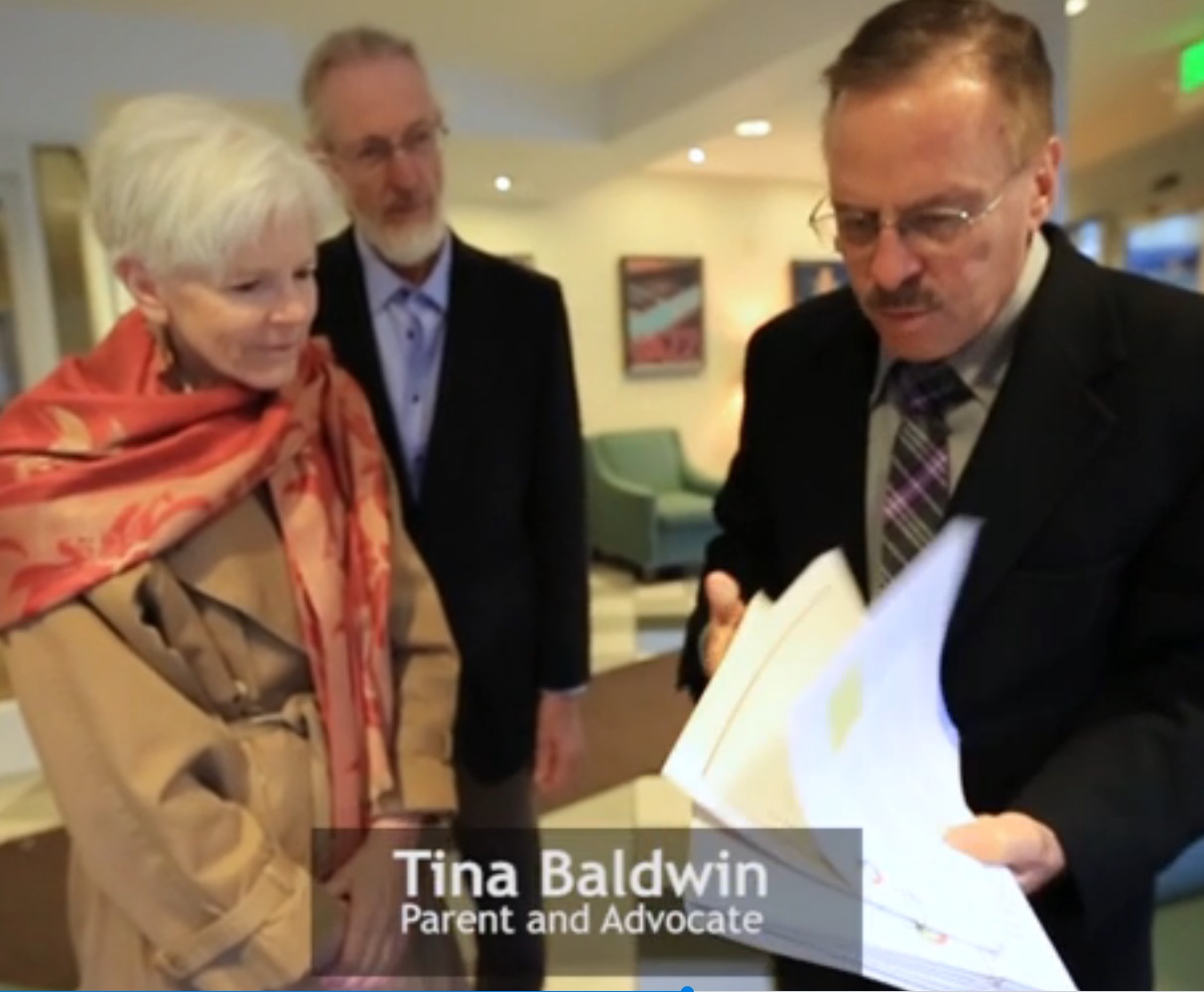 As
chairperson of the board of trustees of Spectrum Institute, Tina Baldwin
communicates frequently with the executive director about administrative
matters as well as activities pertaining to the organization’s projects.
As director of the newly-formed Mental Health Project, Tina is working
to develop a national network of mental health professionals to provide
ongoing advice and feedback to the project. Beyond her pro bono work
with Spectrum Institute, Tina volunteers with a variety of other
organizations and agencies. As a member of the ISAKI task force (Idaho
Sexual Assault Kit Initiative), Tina is the sole representative to that
agency promoting the interests of people with disabilities. Tina is also
a member of the Abuse and Neglect Reporting and Monitoring Workgroup.
This project is sponsored by a grant from the federal Administration on
Community Living and is done in partnership with the Idaho Council on
Developmental Disabilities, Disability Rights Idaho, and The Center on
Disabilities and Human Development.
As
chairperson of the board of trustees of Spectrum Institute, Tina Baldwin
communicates frequently with the executive director about administrative
matters as well as activities pertaining to the organization’s projects.
As director of the newly-formed Mental Health Project, Tina is working
to develop a national network of mental health professionals to provide
ongoing advice and feedback to the project. Beyond her pro bono work
with Spectrum Institute, Tina volunteers with a variety of other
organizations and agencies. As a member of the ISAKI task force (Idaho
Sexual Assault Kit Initiative), Tina is the sole representative to that
agency promoting the interests of people with disabilities. Tina is also
a member of the Abuse and Neglect Reporting and Monitoring Workgroup.
This project is sponsored by a grant from the federal Administration on
Community Living and is done in partnership with the Idaho Council on
Developmental Disabilities, Disability Rights Idaho, and The Center on
Disabilities and Human Development.  The
Freedom Files --
The
Freedom Files --  Retired
Superior Court Judge James P. Gray has written to the presiding judges
of superior courts in all 58 counties in California to remind them of
judicial duties to protect seniors and people with disabilities who
become involved in conservatorship proceedings. Judge Gray was the
presiding judge of the Orange County Superior Court before he retired a
few years ago. His letter was influenced by a book written by Dr. Sam
Sugar titled “Guardianships and the Elderly: The Perfect Crime.” Based
on his own personal experience on the bench, he reminded the judges that
probate courts have a “a great deal of potential for abuse by appointed
guardians and their counsel.” He warned that “the lifetime savings of a
senior can vanish in a matter of months if the judge allows predatory
and unmonitored guardians and their lawyers to engage in staged
litigation.” For a copy of his letter,
Retired
Superior Court Judge James P. Gray has written to the presiding judges
of superior courts in all 58 counties in California to remind them of
judicial duties to protect seniors and people with disabilities who
become involved in conservatorship proceedings. Judge Gray was the
presiding judge of the Orange County Superior Court before he retired a
few years ago. His letter was influenced by a book written by Dr. Sam
Sugar titled “Guardianships and the Elderly: The Perfect Crime.” Based
on his own personal experience on the bench, he reminded the judges that
probate courts have a “a great deal of potential for abuse by appointed
guardians and their counsel.” He warned that “the lifetime savings of a
senior can vanish in a matter of months if the judge allows predatory
and unmonitored guardians and their lawyers to engage in staged
litigation.” For a copy of his letter,  The
California Court of Appeal has responded to two letters from Spectrum
Institute. First, it has ordered that its opinion in Conservatorship of
Anna Navarrete be published in the official reports. In that opinion the
court ruled that a superior court judge lacks authority to order a
conservatee to visit with and undergo therapy with a parent against the
wishes of the conservatee. This ruling now becomes binding precedent
throughout the state. Second, the court ordered that the words “an
Incompetent Person” be removed from the caption of the case. Spectrum
Institute urged the court, on its own motion, to remove those words as
they are pejorative and unnecessary. The court agreed, stating that
doing this would “conform to current law and usage.” To read the court’s
order,
The
California Court of Appeal has responded to two letters from Spectrum
Institute. First, it has ordered that its opinion in Conservatorship of
Anna Navarrete be published in the official reports. In that opinion the
court ruled that a superior court judge lacks authority to order a
conservatee to visit with and undergo therapy with a parent against the
wishes of the conservatee. This ruling now becomes binding precedent
throughout the state. Second, the court ordered that the words “an
Incompetent Person” be removed from the caption of the case. Spectrum
Institute urged the court, on its own motion, to remove those words as
they are pejorative and unnecessary. The court agreed, stating that
doing this would “conform to current law and usage.” To read the court’s
order, 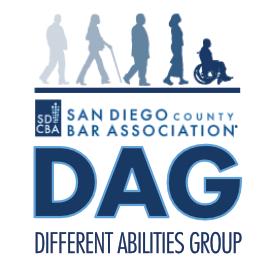 Peter
Lynch, chair of the Different Abilities Group of the San Diego County
Bar Association, sent a communication today to Spectrum Institute. We
were informed that the commentary recently published in the Daily
Journal – Time to End Disability Stigmas in Judicial Opinions –
caught the group’s attention. DAG was formed in 2016 and has been
working with a variety of agencies to include USDC SD CA, SDCBA, USD
School of Law, Cal Western Law School, SDSU, Lincoln H.S. and Mission
Bay H.S. on collaborative programming on unconscious bias, disability
etiquette, requesting accommodations, IEP’s, and health care related
issues. For a copy of a “Disability Etiquette Brochure” being
distributed by DAG,
Peter
Lynch, chair of the Different Abilities Group of the San Diego County
Bar Association, sent a communication today to Spectrum Institute. We
were informed that the commentary recently published in the Daily
Journal – Time to End Disability Stigmas in Judicial Opinions –
caught the group’s attention. DAG was formed in 2016 and has been
working with a variety of agencies to include USDC SD CA, SDCBA, USD
School of Law, Cal Western Law School, SDSU, Lincoln H.S. and Mission
Bay H.S. on collaborative programming on unconscious bias, disability
etiquette, requesting accommodations, IEP’s, and health care related
issues. For a copy of a “Disability Etiquette Brochure” being
distributed by DAG, 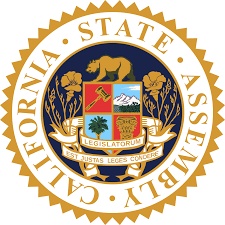 Spectrum
Institute sent a communication to the chief consultant of the Committee
on Aging and Long-Term Care of the California State Assembly. We offered
to provide expert testimony on conservatorship reform at an upcoming
hearing of the committee which will focus on abuses in probate
conservatorship proceedings. We have several specific proposals to offer
elected officials regarding legislation they can adopt to remedy some of
the systemic problems with the current system. Prior to the hearing,
Spectrum Institute will submit a written report to the committee
identifying changes that should occur in legislative policies and
judicial practices to ensure that seniors and people with disabilities
have access to justice in these proceedings.
Spectrum
Institute sent a communication to the chief consultant of the Committee
on Aging and Long-Term Care of the California State Assembly. We offered
to provide expert testimony on conservatorship reform at an upcoming
hearing of the committee which will focus on abuses in probate
conservatorship proceedings. We have several specific proposals to offer
elected officials regarding legislation they can adopt to remedy some of
the systemic problems with the current system. Prior to the hearing,
Spectrum Institute will submit a written report to the committee
identifying changes that should occur in legislative policies and
judicial practices to ensure that seniors and people with disabilities
have access to justice in these proceedings.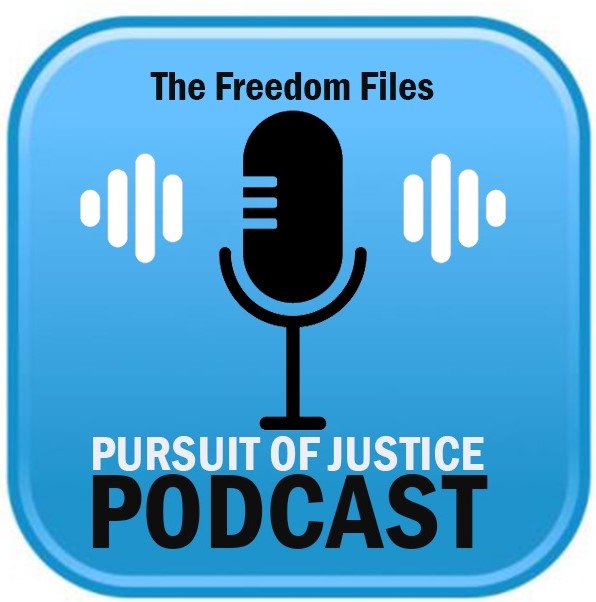 A
communication was sent to the Edward R. Murrow College of Communications
welcoming students to apply for an internship with Spectrum Institute.
The college is part of Washington State University. Students would
assist with audio and video editing for a The Freedom Files – a
Pursuit of Justice Podcast anticipated to launch in February 2021. The
content of the podcast will focus on a wide range of issues involving
liberty and justice for seniors and people with disabilities, including
their right to freedom of choice with matters such as health care,
finances, living arrangements, sexual relationships, marital status,
social interactions, and recreational activities.
A
communication was sent to the Edward R. Murrow College of Communications
welcoming students to apply for an internship with Spectrum Institute.
The college is part of Washington State University. Students would
assist with audio and video editing for a The Freedom Files – a
Pursuit of Justice Podcast anticipated to launch in February 2021. The
content of the podcast will focus on a wide range of issues involving
liberty and justice for seniors and people with disabilities, including
their right to freedom of choice with matters such as health care,
finances, living arrangements, sexual relationships, marital status,
social interactions, and recreational activities.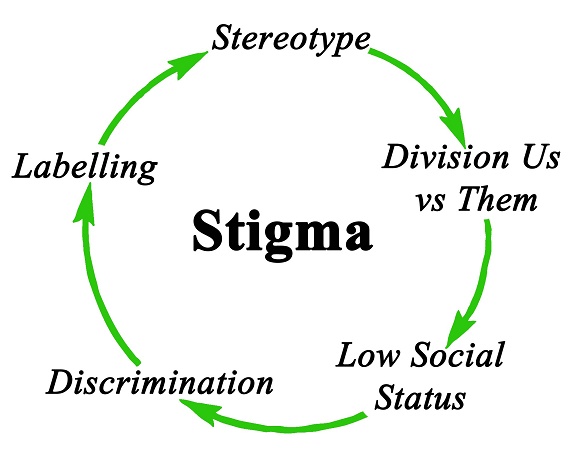 The
Daily Journal published a commentary today written by Thomas F. Coleman,
legal director of Spectrum Institute. It calls out a recent
appellate opinion in California that unnecessarily and inappropriately
used a derogatory term to label a woman with cerebral palsy. She had
filed an appeal from a court order forcing her to have ongoing visits
and mandatory therapy session with her father – someone she accused of
sexually assaulting her. The Court of Appeal reversed the order, ruling
that a superior court judge does not have authority for force an adult
conservatee to associate with a parent over her objections. The ruling
was good, with one exception. The caption of the case referred to the
woman as “an Incompetent Person.” The commentary explains that as
societal attitudes about people with disabilities change, so too must
judicial attitudes. The language that judges use to describe
people with disabilities should be respectful, not perjorative. For a
pdf copy of the commentary,
The
Daily Journal published a commentary today written by Thomas F. Coleman,
legal director of Spectrum Institute. It calls out a recent
appellate opinion in California that unnecessarily and inappropriately
used a derogatory term to label a woman with cerebral palsy. She had
filed an appeal from a court order forcing her to have ongoing visits
and mandatory therapy session with her father – someone she accused of
sexually assaulting her. The Court of Appeal reversed the order, ruling
that a superior court judge does not have authority for force an adult
conservatee to associate with a parent over her objections. The ruling
was good, with one exception. The caption of the case referred to the
woman as “an Incompetent Person.” The commentary explains that as
societal attitudes about people with disabilities change, so too must
judicial attitudes. The language that judges use to describe
people with disabilities should be respectful, not perjorative. For a
pdf copy of the commentary,
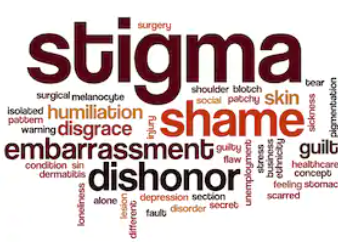 The
Mental Health Project of Spectrum Institute filed a letter today with
Divison Two of the Fourth District Court of Appeal asking the court to
remove the phrase "an Incompetent Person" from the caption of the
court's opinion in an appeal. The court unnecessarily, and
probably unwittingly, labeled Anna N., the appellant in the case, as "an
Incompetent Person." The letter reminded the court that it is the
public policy of the state that judicial officers should not use
disparaging language or engage in discriminatory conduct, whether
intentional or inadvertent. For example, judicial decisions now use the
term "intellectual disability" instead of "mental retardation."
The letter suggests that the pejorative phrase "an Incompetent Person"
could be replaced with an objective phrase such as "a Conservatee."
For a copy of the letter,
The
Mental Health Project of Spectrum Institute filed a letter today with
Divison Two of the Fourth District Court of Appeal asking the court to
remove the phrase "an Incompetent Person" from the caption of the
court's opinion in an appeal. The court unnecessarily, and
probably unwittingly, labeled Anna N., the appellant in the case, as "an
Incompetent Person." The letter reminded the court that it is the
public policy of the state that judicial officers should not use
disparaging language or engage in discriminatory conduct, whether
intentional or inadvertent. For example, judicial decisions now use the
term "intellectual disability" instead of "mental retardation."
The letter suggests that the pejorative phrase "an Incompetent Person"
could be replaced with an objective phrase such as "a Conservatee."
For a copy of the letter, 
 The
Disability and Guardianship Project of Spectrum Institute
The
Disability and Guardianship Project of Spectrum Institute
 Spectrum
Institute received a check for $400 in the mail today from a donor who
wishes to remain anonymous. Enclosed was a note that says “Keep up the
good work.” Please consider making a donation to support our advocacy
efforts promoting justice and equal rights for seniors and people with
disabilities. Although our work is done on a volunteer basis, we need
donations to help pay for our operating expenses. Donations made by
December 31 would be deductible on your 2020 tax return. Information on
how to donate by check or securely by credit card is found at:
Spectrum
Institute received a check for $400 in the mail today from a donor who
wishes to remain anonymous. Enclosed was a note that says “Keep up the
good work.” Please consider making a donation to support our advocacy
efforts promoting justice and equal rights for seniors and people with
disabilities. Although our work is done on a volunteer basis, we need
donations to help pay for our operating expenses. Donations made by
December 31 would be deductible on your 2020 tax return. Information on
how to donate by check or securely by credit card is found at:
 With
a federal grant from the Administration of Community Living, the Idaho
Living Well Project has formed a Quality Assurance Abuse and Neglect
Reporting and Monitoring Workgroup with key stakeholders across the
state. The goal of the workgroup is to protect individuals with
disabilities from, and ultimately prevent, abuse, neglect, and
exploitation by creating a self-advocate informed, integrated,
community-based reporting and monitoring as a component of a larger
quality assurance system. Tina Baldwin, chairperson of the board of
trustees of Spectrum Institute, has been appointed to serve as a member
of the workgroup. A longtime resident of Idaho, Tina has an ongoing
interest in promoting risk reduction and more effective governmental
responses to abuse of people with intellectual and developmental
disabilities. Tina will make sure that adults living under an
order of guardianship are included in the focus of the workgroup.
For more information on the workgroup, see page 7 of this
With
a federal grant from the Administration of Community Living, the Idaho
Living Well Project has formed a Quality Assurance Abuse and Neglect
Reporting and Monitoring Workgroup with key stakeholders across the
state. The goal of the workgroup is to protect individuals with
disabilities from, and ultimately prevent, abuse, neglect, and
exploitation by creating a self-advocate informed, integrated,
community-based reporting and monitoring as a component of a larger
quality assurance system. Tina Baldwin, chairperson of the board of
trustees of Spectrum Institute, has been appointed to serve as a member
of the workgroup. A longtime resident of Idaho, Tina has an ongoing
interest in promoting risk reduction and more effective governmental
responses to abuse of people with intellectual and developmental
disabilities. Tina will make sure that adults living under an
order of guardianship are included in the focus of the workgroup.
For more information on the workgroup, see page 7 of this
 Thomas
F. Coleman, legal director of Spectrum Institute, testified today at a
public hearing by the California State Bar. The hearing focused on the
issues of competence and discipline. Coleman advised the Trustees and
staff that more than 5,000 probate conservatorship cases are initiated
in California each year. Seniors and people with disabilities are
involuntary litigants in these cases. In some cases they are not
provided with legal representation. In some cases they are represented
by a public defender. In other cases private attorneys are appointed to
represent them. Due to their cognitive disabilities, most of these
litigants are unable to recognize violations of ethics or the failure of
their attorneys to provide competent representation. They are not able
to file complaints with the State Bar. As a result, in order to give
litigants with cognitive disabilities access to the State Bar discipline
system, the State Bar should devise pro-active measures to identify a
lack of competent representation or a violation of ethics. Random audits
of a sample of cases throughout the state would be one way to provide a
semblance of access to the complaint system for this class of litigants.
Coleman also urged the State Bar to conduct of survey of public defender
offices that handle such cases. The survey would determine the case
loads of attorneys representing such clients. Some public defenders are
reporting that they have between 200 and 300 open cases at any given
time (including all types of cases). Measures should be taken to require
the head public defender to reduce case loads to a reasonable level.
Thomas
F. Coleman, legal director of Spectrum Institute, testified today at a
public hearing by the California State Bar. The hearing focused on the
issues of competence and discipline. Coleman advised the Trustees and
staff that more than 5,000 probate conservatorship cases are initiated
in California each year. Seniors and people with disabilities are
involuntary litigants in these cases. In some cases they are not
provided with legal representation. In some cases they are represented
by a public defender. In other cases private attorneys are appointed to
represent them. Due to their cognitive disabilities, most of these
litigants are unable to recognize violations of ethics or the failure of
their attorneys to provide competent representation. They are not able
to file complaints with the State Bar. As a result, in order to give
litigants with cognitive disabilities access to the State Bar discipline
system, the State Bar should devise pro-active measures to identify a
lack of competent representation or a violation of ethics. Random audits
of a sample of cases throughout the state would be one way to provide a
semblance of access to the complaint system for this class of litigants.
Coleman also urged the State Bar to conduct of survey of public defender
offices that handle such cases. The survey would determine the case
loads of attorneys representing such clients. Some public defenders are
reporting that they have between 200 and 300 open cases at any given
time (including all types of cases). Measures should be taken to require
the head public defender to reduce case loads to a reasonable level. Spectrum
Institute sent a letter today to the California Supreme Court asking the
court to delete an appellate opinion from the law books. The opinion was
recently published by Division Six of the Second District Court of
Appeal. Very few appellate opinions are published in the official
reports, but when they are, the decisions create binding precedent
throughout the state. An unpublished opinion only binds the immediate
parties to the case. In this instance, the Court of Appeal went out of
its way to publish an opinion that unfortunately, perhaps inadvertently,
undermines the constitutional and statutory requirement that a
conservatorship not be imposed on an adult unless less restrictive
alternatives have been considered and are found to be unworkable. This
opinion dismisses this important safeguard in way that sends the wrong
signal to judges and attorneys in California. To read our letter,
Spectrum
Institute sent a letter today to the California Supreme Court asking the
court to delete an appellate opinion from the law books. The opinion was
recently published by Division Six of the Second District Court of
Appeal. Very few appellate opinions are published in the official
reports, but when they are, the decisions create binding precedent
throughout the state. An unpublished opinion only binds the immediate
parties to the case. In this instance, the Court of Appeal went out of
its way to publish an opinion that unfortunately, perhaps inadvertently,
undermines the constitutional and statutory requirement that a
conservatorship not be imposed on an adult unless less restrictive
alternatives have been considered and are found to be unworkable. This
opinion dismisses this important safeguard in way that sends the wrong
signal to judges and attorneys in California. To read our letter,
 An
excellent article about the right to counsel in guardianship restoration
of rights proceedings was published yesterday in the Voice of
Experience – a monthly e-newsletter of the American Bar
Association. The article explains that in nearly half of the states, an
adult living under an order of guardianship is not given a lawyer to
help get his or her rights restored. It argues that counsel should be
provided in all such cases and that appointed attorneys should serve as
zealous advocates to promote the client’s stated wishes. To read the
article,
An
excellent article about the right to counsel in guardianship restoration
of rights proceedings was published yesterday in the Voice of
Experience – a monthly e-newsletter of the American Bar
Association. The article explains that in nearly half of the states, an
adult living under an order of guardianship is not given a lawyer to
help get his or her rights restored. It argues that counsel should be
provided in all such cases and that appointed attorneys should serve as
zealous advocates to promote the client’s stated wishes. To read the
article,
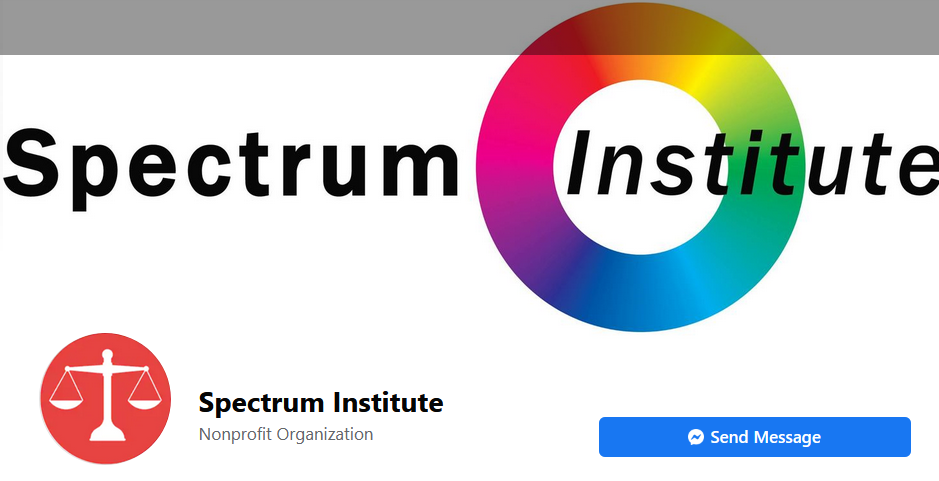
 A
communication has been sent to the Executive Committee of the Trusts and
Estates Section (TEXCOM) of the California Lawyers Association. We have
asked the committee to endorse the principles of the
A
communication has been sent to the Executive Committee of the Trusts and
Estates Section (TEXCOM) of the California Lawyers Association. We have
asked the committee to endorse the principles of the
 Spectrum
Institute is initiating a
Spectrum
Institute is initiating a
 Over
the past few years, the Daily Journal newspaper has published 24
commentaries written by Thomas F. Coleman, legal director of Spectrum
Institute. The paper is read by thousands of attorneys and judges
throughout California. Until today, Coleman's commentaries have
been available only to paid subscribers. Because of their
educational value to a wider audience, the editor of the paper has
removed the "paywall" and has placed all of Coleman's commentaries in a
publicly available area of the newspaper's website. Here are the links
to the articles.
Over
the past few years, the Daily Journal newspaper has published 24
commentaries written by Thomas F. Coleman, legal director of Spectrum
Institute. The paper is read by thousands of attorneys and judges
throughout California. Until today, Coleman's commentaries have
been available only to paid subscribers. Because of their
educational value to a wider audience, the editor of the paper has
removed the "paywall" and has placed all of Coleman's commentaries in a
publicly available area of the newspaper's website. Here are the links
to the articles. A
note of appreciation was receied today from attorney Lanny Davis.
Davis is currently representing Bradford Lund, grandson of the late Walt
Disney, in a
A
note of appreciation was receied today from attorney Lanny Davis.
Davis is currently representing Bradford Lund, grandson of the late Walt
Disney, in a  A
commentary by Thomas F. Coleman titled "Jury Trials Are an Elusive Right
for Proposed Conservatees" was published today in the Daily Journal.
The legal newspaper is read by thousands of judges and attorneys
throughout California. The article explores reasons why public
defenders and court-appointed attorneys do not demand jury trials for
their clients in probate conservatorship proceedings. The article
also discusses the new guidebook on jury instructions and explains that
it is being sent to the California Judicial Council with a request to
develop and publish approved instructions for all four types of probate
conservatorship cases. To read the op-ed article,
A
commentary by Thomas F. Coleman titled "Jury Trials Are an Elusive Right
for Proposed Conservatees" was published today in the Daily Journal.
The legal newspaper is read by thousands of judges and attorneys
throughout California. The article explores reasons why public
defenders and court-appointed attorneys do not demand jury trials for
their clients in probate conservatorship proceedings. The article
also discusses the new guidebook on jury instructions and explains that
it is being sent to the California Judicial Council with a request to
develop and publish approved instructions for all four types of probate
conservatorship cases. To read the op-ed article,
 A
page has been added to our website expressing appreciation to the men
and women whose conservatorship cases have provided examples of
injustices and recognizing the attorneys who have been zealously
advocating for equal rights and justice in conservatorship proceedings.
A
page has been added to our website expressing appreciation to the men
and women whose conservatorship cases have provided examples of
injustices and recognizing the attorneys who have been zealously
advocating for equal rights and justice in conservatorship proceedings.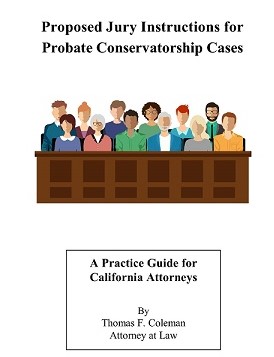 Attorney
Thomas F. Coleman has developed a jury instruction guidebook for public
defenders and appointed counsel who represent proposed conservatees in
California's probate courts. The initial edition of the guidebook
focuses on adults with developmental disabilities who must respond to
petitions seeking a limited conservatorship of the person. Updated
editions will include new sections for limited conservatorships of the
estate, general conservatorships of the person, and general
conservatorships of the estate. A book published by the California
Judicial Councl contains approved jury instructions for most types of
civil cases, including mental health conservatorships. Probate
conservatorship cases are conspicuously absent from the book, despite
the fact that more than 5,000 such cases are filed annually in the
state. There are no jury instructions for limited conservatorships
despite the fact that the Legislature created this special type of
conservatorship for adults with developmental disbilities 40 years ago.
To access the new guidebook,
Attorney
Thomas F. Coleman has developed a jury instruction guidebook for public
defenders and appointed counsel who represent proposed conservatees in
California's probate courts. The initial edition of the guidebook
focuses on adults with developmental disabilities who must respond to
petitions seeking a limited conservatorship of the person. Updated
editions will include new sections for limited conservatorships of the
estate, general conservatorships of the person, and general
conservatorships of the estate. A book published by the California
Judicial Councl contains approved jury instructions for most types of
civil cases, including mental health conservatorships. Probate
conservatorship cases are conspicuously absent from the book, despite
the fact that more than 5,000 such cases are filed annually in the
state. There are no jury instructions for limited conservatorships
despite the fact that the Legislature created this special type of
conservatorship for adults with developmental disbilities 40 years ago.
To access the new guidebook,
 Thomas
F. Coleman, founder and executive director of Spectrum Institute was
interviewed by the hosts of "Let's Talk Autism" about the origin and
development of his advocacy on issues involving disability, abuse, and
guardianship. The show is a production of Autism Live.
To watch the seven-minute video,
Thomas
F. Coleman, founder and executive director of Spectrum Institute was
interviewed by the hosts of "Let's Talk Autism" about the origin and
development of his advocacy on issues involving disability, abuse, and
guardianship. The show is a production of Autism Live.
To watch the seven-minute video,
 The
Daily Journal published a commentary today focusing on Britney Spears
and tens of thousands of other conservtees whose rights are being
violated by the probate conservatorship system in California. The
op-ed article was written by Thomas F. Coleman, legal director of
Spectrum Institute. It focuses heavily on the court's denial of
Britney's right to be represented by counsel of her choice in the legal
proceeding. As a result of the court summarily ruling that she
lacked the capacity to retain counsel, Britney has been forced to pay
millions of dollars in legal fees to this court-imposed attorney over
the past several years. To read the commentary,
The
Daily Journal published a commentary today focusing on Britney Spears
and tens of thousands of other conservtees whose rights are being
violated by the probate conservatorship system in California. The
op-ed article was written by Thomas F. Coleman, legal director of
Spectrum Institute. It focuses heavily on the court's denial of
Britney's right to be represented by counsel of her choice in the legal
proceeding. As a result of the court summarily ruling that she
lacked the capacity to retain counsel, Britney has been forced to pay
millions of dollars in legal fees to this court-imposed attorney over
the past several years. To read the commentary,
 A
rally by fans supporting Britney Spears will gather outside a courthouse
in Los Angles on November 10 to demand that the performer be freed from
the confines of a court ordered conservatorship. One of the
grievances listed by the
A
rally by fans supporting Britney Spears will gather outside a courthouse
in Los Angles on November 10 to demand that the performer be freed from
the confines of a court ordered conservatorship. One of the
grievances listed by the
 Spectrum
Institute submitted a request to the California Department of Aging
today for any records in its possession regarding the number of older
adults who are in probate conservatorships in the state. "
Spectrum
Institute submitted a request to the California Department of Aging
today for any records in its possession regarding the number of older
adults who are in probate conservatorships in the state. " Without
affording her an evidentiary hearing, a judge in Solano County removed
Elizabeth H. from the home she had lived in for many years with her
mother. Elizabeth, who is 28 years old, has Down syndrome.
Two weeks earlier, the same judge placed Elizabeth under an order of
temporary conservatorship -- again without an evidentiary hearing.
At the earlier hearing, the judge appointed the public defender to
represent Elizabeth but did not continue the case in order to allow the
public defender time to appear and defend her. Once the public
defender did make an appearance, he demanded an evidentiary hearing on
the issue of Elizabeth's right to remain in her family home. Even
though the right to a hearing is protected, both by statute and
constitutional due process, the request was ignored by the judge.
The public defender, Joseph Reyes, then filed a petition with the Court
of Appeal seeking to have the removal order vacated on constitutional
grounds. A friend of Elizabeth reached out to Thomas F. Coleman,
legal director of Spectrum Institute, for help. Coleman contacted
the public defender and the two attorneys collaborted on arguments for
the reply brief which was due in a few days. For a copy of the
reply brief that attorney Reyes filed in the Court of Appeal,
Without
affording her an evidentiary hearing, a judge in Solano County removed
Elizabeth H. from the home she had lived in for many years with her
mother. Elizabeth, who is 28 years old, has Down syndrome.
Two weeks earlier, the same judge placed Elizabeth under an order of
temporary conservatorship -- again without an evidentiary hearing.
At the earlier hearing, the judge appointed the public defender to
represent Elizabeth but did not continue the case in order to allow the
public defender time to appear and defend her. Once the public
defender did make an appearance, he demanded an evidentiary hearing on
the issue of Elizabeth's right to remain in her family home. Even
though the right to a hearing is protected, both by statute and
constitutional due process, the request was ignored by the judge.
The public defender, Joseph Reyes, then filed a petition with the Court
of Appeal seeking to have the removal order vacated on constitutional
grounds. A friend of Elizabeth reached out to Thomas F. Coleman,
legal director of Spectrum Institute, for help. Coleman contacted
the public defender and the two attorneys collaborted on arguments for
the reply brief which was due in a few days. For a copy of the
reply brief that attorney Reyes filed in the Court of Appeal,

 Spectrum
Institute has been promoting the appointment of attorneys to represent
conservatees in appellate proceedings as a necessity under the
Spectrum
Institute has been promoting the appointment of attorneys to represent
conservatees in appellate proceedings as a necessity under the
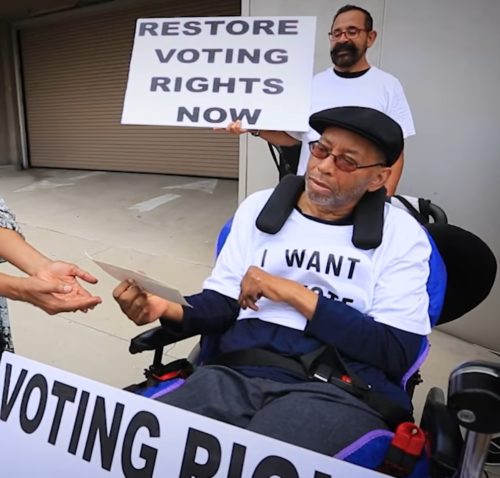 Mad
in America, an online magazine with stories advancing the need for
profound changes in the field of psychiatry, published a story today
about voting rights of people with mental disabilites. The story
gives a significant mention to the work of Spectrum Institute using the
Americans with Disabilities Act to secure voting rights for conservatees
in California. To read the story,
Mad
in America, an online magazine with stories advancing the need for
profound changes in the field of psychiatry, published a story today
about voting rights of people with mental disabilites. The story
gives a significant mention to the work of Spectrum Institute using the
Americans with Disabilities Act to secure voting rights for conservatees
in California. To read the story,
 Tina
Baldwin, Chairperson of the Board of Trustees of Spectrum Institute,
made a presentation today to the Joint Legislative Executive Committee
on Planning for Aging and Disability Issues. Tina stressed that
individuals with devlopmental disabilities have a legal right to mental
health therapy, especially during a pandemic. She advised
committee members that "
Tina
Baldwin, Chairperson of the Board of Trustees of Spectrum Institute,
made a presentation today to the Joint Legislative Executive Committee
on Planning for Aging and Disability Issues. Tina stressed that
individuals with devlopmental disabilities have a legal right to mental
health therapy, especially during a pandemic. She advised
committee members that "
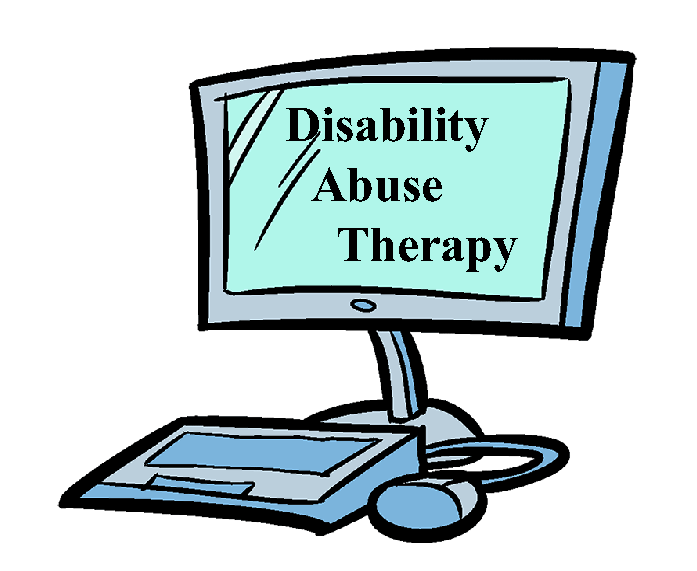 A
new page on the website of Spectrum Institute focuses on disabiity and
abuse as well as disability and therapy. The page includes links
to commentaries and research papers written by Thomas F. Coleman, the
organization's executive director. Although the Disability and
Abuse Project was recently discontinued, Spectrum Institute will
continue to engage in education and advocacy on these issues,
particularly as they affect the lives of adults who are living under an
order of guardianship or conservatorship. To access the new
webpage,
A
new page on the website of Spectrum Institute focuses on disabiity and
abuse as well as disability and therapy. The page includes links
to commentaries and research papers written by Thomas F. Coleman, the
organization's executive director. Although the Disability and
Abuse Project was recently discontinued, Spectrum Institute will
continue to engage in education and advocacy on these issues,
particularly as they affect the lives of adults who are living under an
order of guardianship or conservatorship. To access the new
webpage,
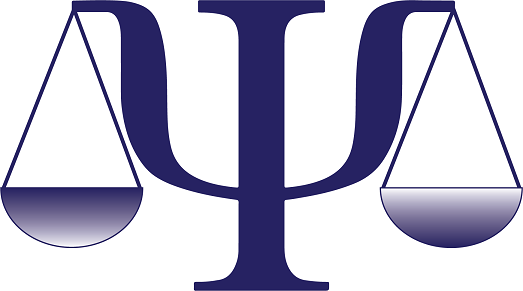 After
15 months of reviewing capacity assessment laws and procedures
applicable to probate conservatorship proceedings, a report has been
sent to the Governor, Chief Justice, and Legislature in California.
The study was authorized by the board of tustees of Spectrum Institute.
Throughout the process, topical reports and proposed recommendations
were sent to 25 workgroup members for review and feedback. A draft
of the full report also was sent to the workgroup for review and
comment. The workgroup included lawyers, psychologists, and a
variety of other professionals, as well as advocates and individuals
whose lives have been personally affected by these proceedings.
The report, written by Thomas F. Coleman, has received excellent reviews
from advocates and educators whose activities have focused on
conservatorship and guardianship proceedings and on issues involving the
legal capacity of seniors and people with disabilities to make decisions
in their lives. Staff at the
After
15 months of reviewing capacity assessment laws and procedures
applicable to probate conservatorship proceedings, a report has been
sent to the Governor, Chief Justice, and Legislature in California.
The study was authorized by the board of tustees of Spectrum Institute.
Throughout the process, topical reports and proposed recommendations
were sent to 25 workgroup members for review and feedback. A draft
of the full report also was sent to the workgroup for review and
comment. The workgroup included lawyers, psychologists, and a
variety of other professionals, as well as advocates and individuals
whose lives have been personally affected by these proceedings.
The report, written by Thomas F. Coleman, has received excellent reviews
from advocates and educators whose activities have focused on
conservatorship and guardianship proceedings and on issues involving the
legal capacity of seniors and people with disabilities to make decisions
in their lives. Staff at the
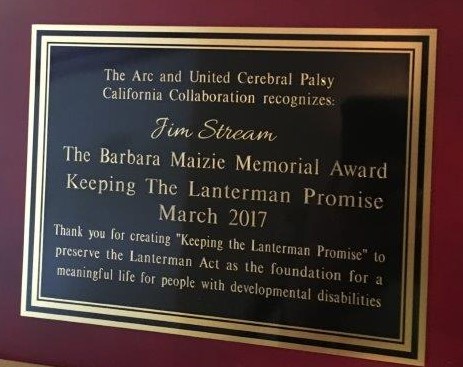 Jim
Stream passed away on
Jim
Stream passed away on 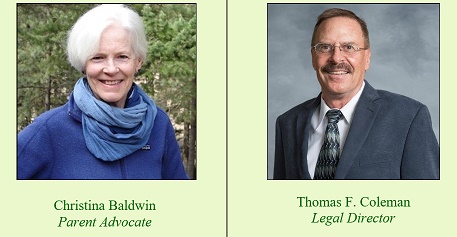 Tina
Baldwin and Thomas Coleman are addressing Washington's Certified
Professional Guardianship Board at its meeting today. Tina is an advisor
to the Disability and Guardianship Project of Spectrum Institute and Tom
is the organization’s founder and legal director. Both submitted
written materials to the board in advance of the meeting.
They encouraged the
board to make available to guardians the
Tina
Baldwin and Thomas Coleman are addressing Washington's Certified
Professional Guardianship Board at its meeting today. Tina is an advisor
to the Disability and Guardianship Project of Spectrum Institute and Tom
is the organization’s founder and legal director. Both submitted
written materials to the board in advance of the meeting.
They encouraged the
board to make available to guardians the
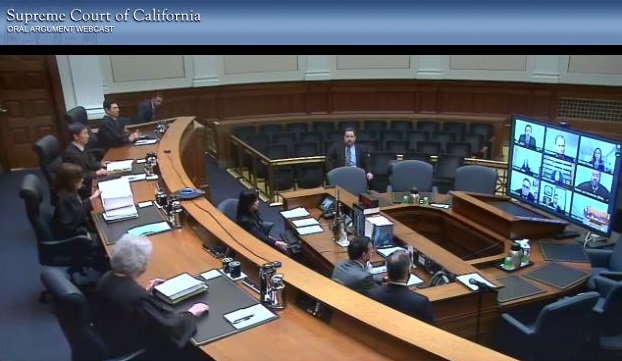 The
amicus curiae brief of Spectrum Institute and all other briefs
filed in the Conservatorship of O.B. are now available of the website of
the California Supreme Court.
The
amicus curiae brief of Spectrum Institute and all other briefs
filed in the Conservatorship of O.B. are now available of the website of
the California Supreme Court.
 Spectrum
Institute filed a letter to the California Supreme Court today urging
the justices to grant review of an appeal by Bradford Lund, grandson of
the late Walt Disney. The underlying issue in the appeal involves a
decision by Los Angeles Superior Court Judge David Cowan prohibiting Mr.
Lund from participating in litigation involving his inheritance and
appointing a guardian ad litem (GAL) to represent the interests of Mr.
Lund in the litigation over his objection. The order effectively makes
Mr. Lund a bystander in his own case and interferes with his right to
have his own attorneys advocate for him in the proceeding. The decision
to appoint a GAL was made without an evidentiary hearing and was based
on the judge’s perception that Mr. Lund has a disability that precludes
him from directly participating in the litigation through his own
attorneys. Mr. Lund contends that the judge’s actions not only violate
his right to due process under the federal constitution, but also
constitute illegal discrimination on the basis of a perceived disability
in violation of federal and state civil rights statutes. Spectrum
Institute is urging the Supreme Court to take the case to determine
whether Mr. Lund has the right to challenge the appointment of the GAL
through an appeal in state court. For the past year, Spectrum Institute
has been
Spectrum
Institute filed a letter to the California Supreme Court today urging
the justices to grant review of an appeal by Bradford Lund, grandson of
the late Walt Disney. The underlying issue in the appeal involves a
decision by Los Angeles Superior Court Judge David Cowan prohibiting Mr.
Lund from participating in litigation involving his inheritance and
appointing a guardian ad litem (GAL) to represent the interests of Mr.
Lund in the litigation over his objection. The order effectively makes
Mr. Lund a bystander in his own case and interferes with his right to
have his own attorneys advocate for him in the proceeding. The decision
to appoint a GAL was made without an evidentiary hearing and was based
on the judge’s perception that Mr. Lund has a disability that precludes
him from directly participating in the litigation through his own
attorneys. Mr. Lund contends that the judge’s actions not only violate
his right to due process under the federal constitution, but also
constitute illegal discrimination on the basis of a perceived disability
in violation of federal and state civil rights statutes. Spectrum
Institute is urging the Supreme Court to take the case to determine
whether Mr. Lund has the right to challenge the appointment of the GAL
through an appeal in state court. For the past year, Spectrum Institute
has been 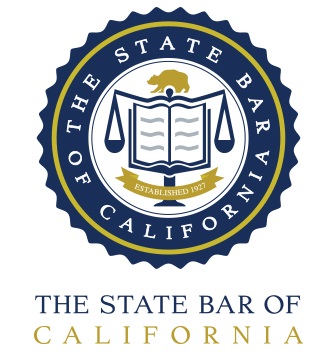 Thomas
F. Coleman, legal director of Spectrum Institute, will speak during the
public comment segment of the meeting of the Board of Trustees of the
California State Bar on November 24, 2020. The meeting will be held in
Los Angeles. Coleman will encourage the State Bar to take two actions in
2020: (1) support our right-to-counsel bill to ensure that seniors and
other people with disabilities have effective representation of counsel
in probate conservatorship proceedings; and (2) take pro-active measures
to ensure that the State Bar’s complaint system is accessible to people
with cognitive and communication disabilities. For a copy of his written
submission,
Thomas
F. Coleman, legal director of Spectrum Institute, will speak during the
public comment segment of the meeting of the Board of Trustees of the
California State Bar on November 24, 2020. The meeting will be held in
Los Angeles. Coleman will encourage the State Bar to take two actions in
2020: (1) support our right-to-counsel bill to ensure that seniors and
other people with disabilities have effective representation of counsel
in probate conservatorship proceedings; and (2) take pro-active measures
to ensure that the State Bar’s complaint system is accessible to people
with cognitive and communication disabilities. For a copy of his written
submission, 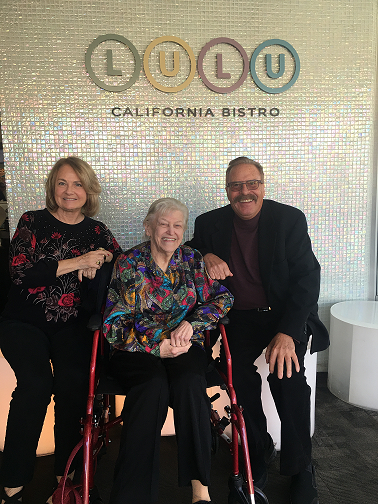 Theresa
Jankowski and Sharon Holmes have agreed to serve as advisors to the
Disability and Guardianship Project. Theresa knows firsthand what it is
like to be unfairly targeted by a conservatorship proceeding. She also
knows what it is like when a judge refuses to accept your chosen
attorney and forces an appointed attorney on you – one that refuses to
advocate for your stated wishes and who fails to defend your rights. As
a retired career management employee of the FBI, she also knows how to
fight back and
Theresa
Jankowski and Sharon Holmes have agreed to serve as advisors to the
Disability and Guardianship Project. Theresa knows firsthand what it is
like to be unfairly targeted by a conservatorship proceeding. She also
knows what it is like when a judge refuses to accept your chosen
attorney and forces an appointed attorney on you – one that refuses to
advocate for your stated wishes and who fails to defend your rights. As
a retired career management employee of the FBI, she also knows how to
fight back and 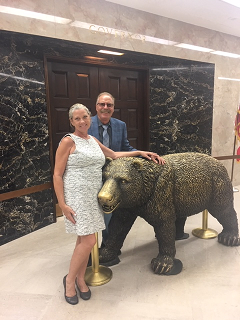 Attorneys
Thomas F. Coleman and Lisa MacCarley will be meeting with legislators in
Sacramento on January 17 to line up support for the right-to-counsel
bill developed by Spectrum Institute. Letters were sent to one
Attorneys
Thomas F. Coleman and Lisa MacCarley will be meeting with legislators in
Sacramento on January 17 to line up support for the right-to-counsel
bill developed by Spectrum Institute. Letters were sent to one
 Spectrum
Institute sent a notice today to the ADA coordinator for the California
Supreme Court. The notice alerts the court that a litigant may
need counsel to be apointed as an accommodation to ensure that she can
access the services of the Supreme Court. The woman was not
provided counsel in the probate conservatorship proceedings in the
superior court nor was she given counsel in proceedings before the Court
of Appeal. To read the notice,
Spectrum
Institute sent a notice today to the ADA coordinator for the California
Supreme Court. The notice alerts the court that a litigant may
need counsel to be apointed as an accommodation to ensure that she can
access the services of the Supreme Court. The woman was not
provided counsel in the probate conservatorship proceedings in the
superior court nor was she given counsel in proceedings before the Court
of Appeal. To read the notice,
 The
Disability and Guardianship Project of Spectrum Institute submitted
written comments today to the Board of Trustees of the California State
Bar. This communication is the most recent of many others sent to State
Bar officials over the past few years. The Trustees are being asked to
recognize that seniors and other adults with disabilities are not
receiving the legal services to which they are entitled by due process,
the mandates of the Americans with Disabilities Act, and the Rules of
Professional Conduct. A copy of the communication has been sent to the
California Supreme Court since it is the supervisory agency to which the
State Bar is accountable. For a copy of the comments and supporting
materials,
The
Disability and Guardianship Project of Spectrum Institute submitted
written comments today to the Board of Trustees of the California State
Bar. This communication is the most recent of many others sent to State
Bar officials over the past few years. The Trustees are being asked to
recognize that seniors and other adults with disabilities are not
receiving the legal services to which they are entitled by due process,
the mandates of the Americans with Disabilities Act, and the Rules of
Professional Conduct. A copy of the communication has been sent to the
California Supreme Court since it is the supervisory agency to which the
State Bar is accountable. For a copy of the comments and supporting
materials,  A
letter was sent today to the presiding judges of the 58 superior courts
in the State of California. The letter was transmitted by email through
the ADA coordinator at each court.
A
letter was sent today to the presiding judges of the 58 superior courts
in the State of California. The letter was transmitted by email through
the ADA coordinator at each court.  Thomas
F. Coleman, legal director of the Disability and Guardianship Project of
Spectrum Institute, will be speaking to the Fair Employment and Housing
Council (FEHC) at its meeting in Sacramento on October 23.
Thomas
F. Coleman, legal director of the Disability and Guardianship Project of
Spectrum Institute, will be speaking to the Fair Employment and Housing
Council (FEHC) at its meeting in Sacramento on October 23.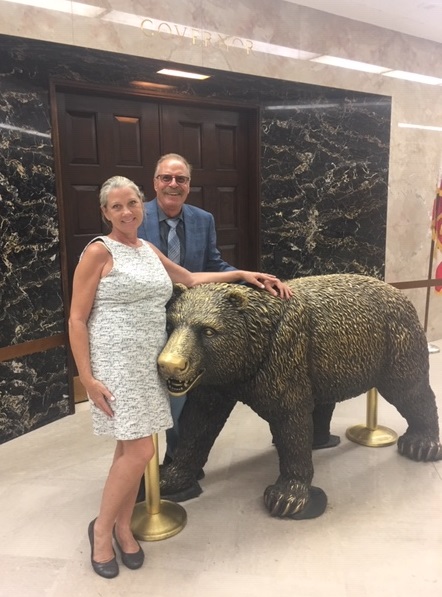
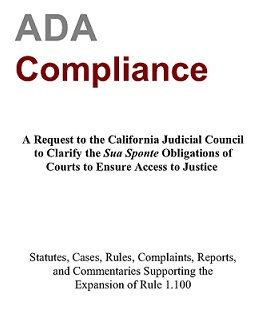 Spectrum
Institute has alerted the California Judicial Council that its court
rules and educational materials on ADA accommodations are misinforming
judges and court personnel of their duties under the Americans with
Disabilities Act.
Spectrum
Institute has alerted the California Judicial Council that its court
rules and educational materials on ADA accommodations are misinforming
judges and court personnel of their duties under the Americans with
Disabilities Act.
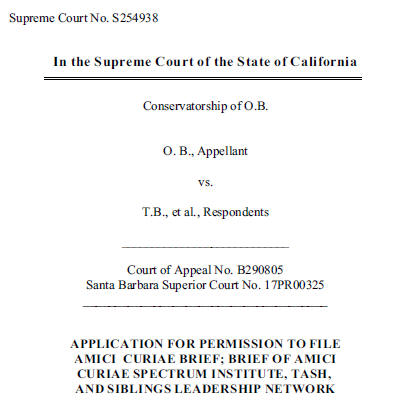 Spectrum
Institute, TASH, and the Siblings Leadership Network have submitted a
friend-of-the-court brief to the California Supreme Court. The
amicus curiae brief asks the Court to require closer scrutiny by
appellate courts when a conservatee alleges that an order establishing a
conservatorship is not supported by clear and convincing evidence.
Spectrum
Institute, TASH, and the Siblings Leadership Network have submitted a
friend-of-the-court brief to the California Supreme Court. The
amicus curiae brief asks the Court to require closer scrutiny by
appellate courts when a conservatee alleges that an order establishing a
conservatorship is not supported by clear and convincing evidence.

 Spectrum
Institute filed
Spectrum
Institute filed 
 New
Conservatorship Legislation is Needed in California
New
Conservatorship Legislation is Needed in California 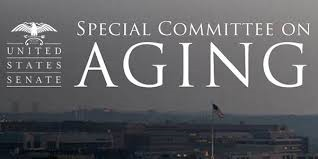
 Spectrum
Institute has sent a
Spectrum
Institute has sent a 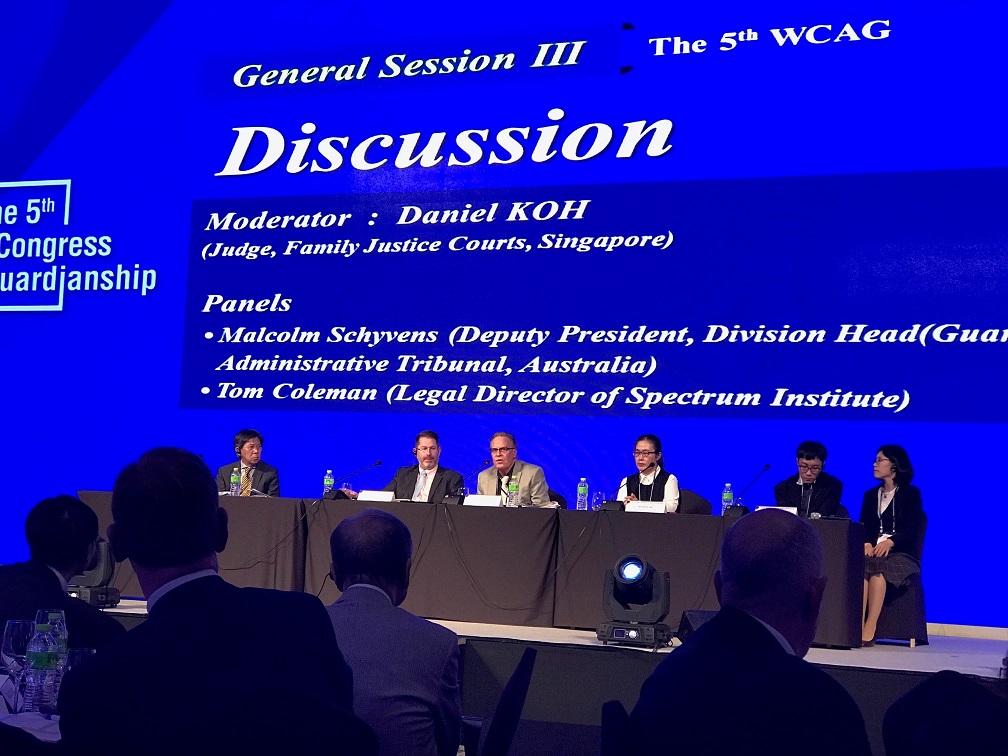
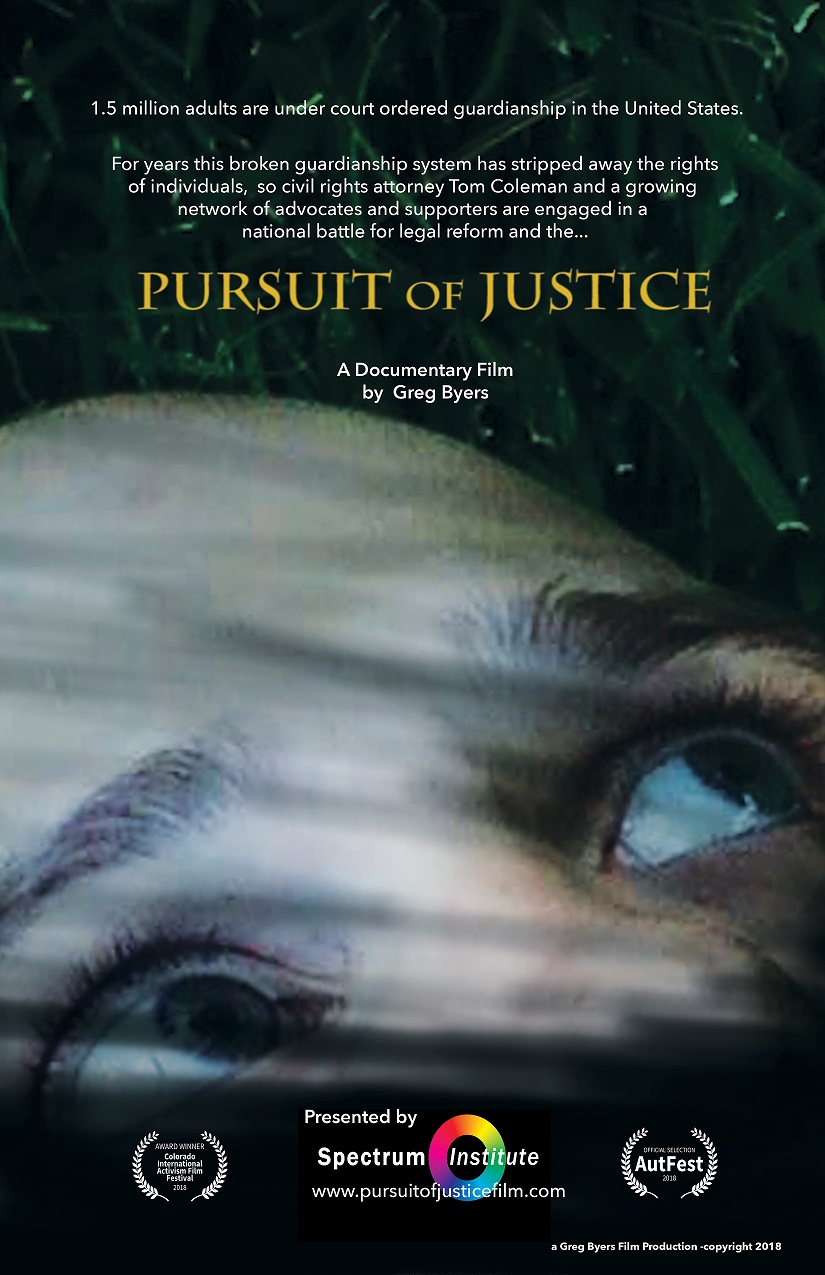

 The World Congress on Adult
Guardianship, to be held this October in South Korea,
will show our documentary film -- Pursuit of Justice
-- during a plenary session on the second day of the
conference. About 500 people from around the world are
expected to attend. Producer Tom Wright's award winning
documentary film -- Edith+Eddie -- will also be
shown during a plenary session on the first day. Dr. Nora
J. Baladerian will speak on two panels at the conference
and attorney Thomas F. Coleman will speak on another one.
This is a great opportunity to share our insights and
suggestions on abuse, disability, and guardianship to
like-minded educators, advocates, and government agency
officials from all parts of the world. For the program of
the conference,
The World Congress on Adult
Guardianship, to be held this October in South Korea,
will show our documentary film -- Pursuit of Justice
-- during a plenary session on the second day of the
conference. About 500 people from around the world are
expected to attend. Producer Tom Wright's award winning
documentary film -- Edith+Eddie -- will also be
shown during a plenary session on the first day. Dr. Nora
J. Baladerian will speak on two panels at the conference
and attorney Thomas F. Coleman will speak on another one.
This is a great opportunity to share our insights and
suggestions on abuse, disability, and guardianship to
like-minded educators, advocates, and government agency
officials from all parts of the world. For the program of
the conference, 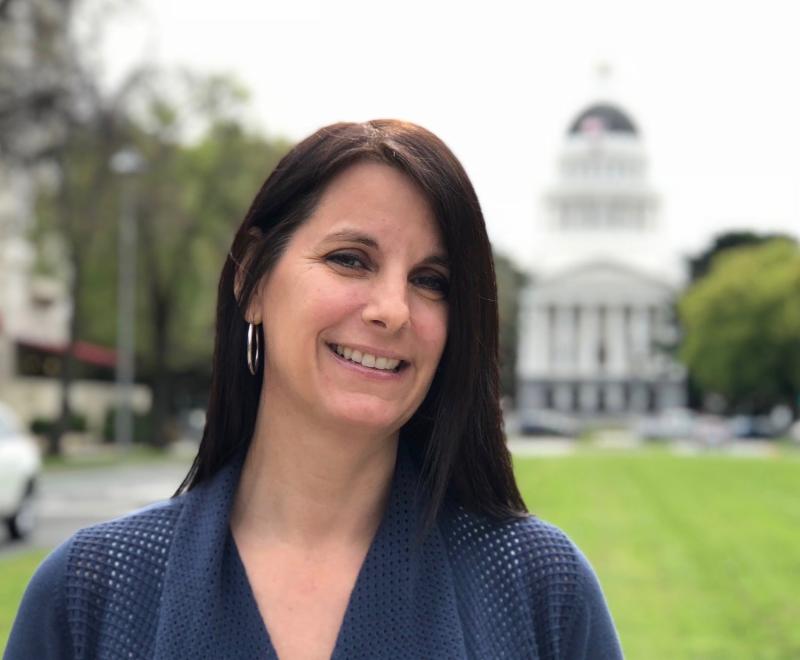 Teresa Anderson has
been added to the
Teresa Anderson has
been added to the  Last year, it was brought to our attention
by
Last year, it was brought to our attention
by  .
.

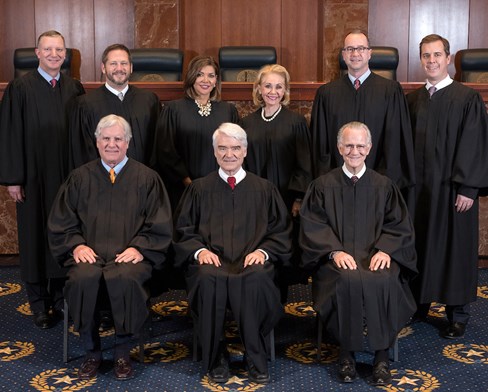 Spectrum Institute has
filed a complaint today with the Supreme Court of Texas
alleging that the state's guardianship system is
operating in violation of the mandates of the Americans
with Disabilities Act and Section 504 of the
Rehabilitation Act of 1973. These statutes apply
federal nondiscrimination protections to public entities,
which include state and local courts. The Supreme
Court of Texas has administrative and supervisory
authority over the judges who preside in guardianship
cases and the attorneys who are appointed to represent
litigants with disabilities in these proceedings.
Spectrum Institute has
filed a complaint today with the Supreme Court of Texas
alleging that the state's guardianship system is
operating in violation of the mandates of the Americans
with Disabilities Act and Section 504 of the
Rehabilitation Act of 1973. These statutes apply
federal nondiscrimination protections to public entities,
which include state and local courts. The Supreme
Court of Texas has administrative and supervisory
authority over the judges who preside in guardianship
cases and the attorneys who are appointed to represent
litigants with disabilities in these proceedings.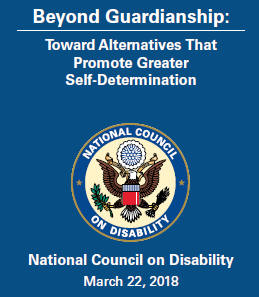 The National
Council on Disability issued a report today highlighting
the need for major reforms to guardianship systems
operated by state courts throughout the nation. The report emphasizes
that the requirements of Americans with Disabilities Act
apply to guardianship proceedings, that due process is
being denied to many respondents with disabilities, and
that attorneys should be provided to advocate for and
defend such respondents. For excerpts from the
report,
The National
Council on Disability issued a report today highlighting
the need for major reforms to guardianship systems
operated by state courts throughout the nation. The report emphasizes
that the requirements of Americans with Disabilities Act
apply to guardianship proceedings, that due process is
being denied to many respondents with disabilities, and
that attorneys should be provided to advocate for and
defend such respondents. For excerpts from the
report, 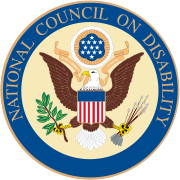 At a
At a
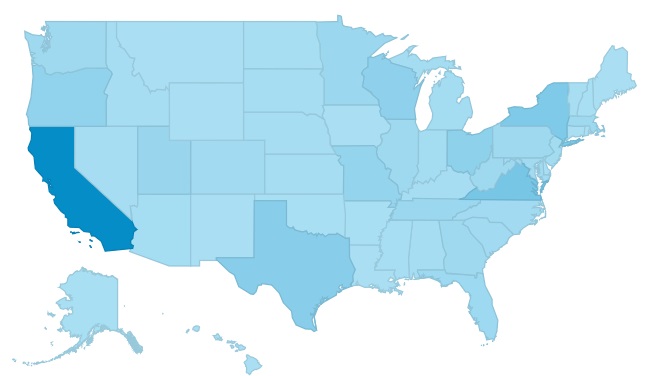
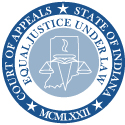 The Indiana Court of Appeal recently issued
a decision allowing a victim of alleged abuse to testify
using a form of facilitated communication (FC). The
court reviewed prior precedents on the issue and ruled
that the victim does not have to prove that FC in
general is a scientifically validated form of
communication. Rather, it need only be shown that
the communication method works for the victim in a
specific case and that the victim is in fact the author
of the messages being conveyed through the facilitated
testimony. The trial court only needs to assure
itself that it is the victim who is testifying, not the
person assisting the victim in the FC process. For
a copy of the court's opinion,
The Indiana Court of Appeal recently issued
a decision allowing a victim of alleged abuse to testify
using a form of facilitated communication (FC). The
court reviewed prior precedents on the issue and ruled
that the victim does not have to prove that FC in
general is a scientifically validated form of
communication. Rather, it need only be shown that
the communication method works for the victim in a
specific case and that the victim is in fact the author
of the messages being conveyed through the facilitated
testimony. The trial court only needs to assure
itself that it is the victim who is testifying, not the
person assisting the victim in the FC process. For
a copy of the court's opinion, 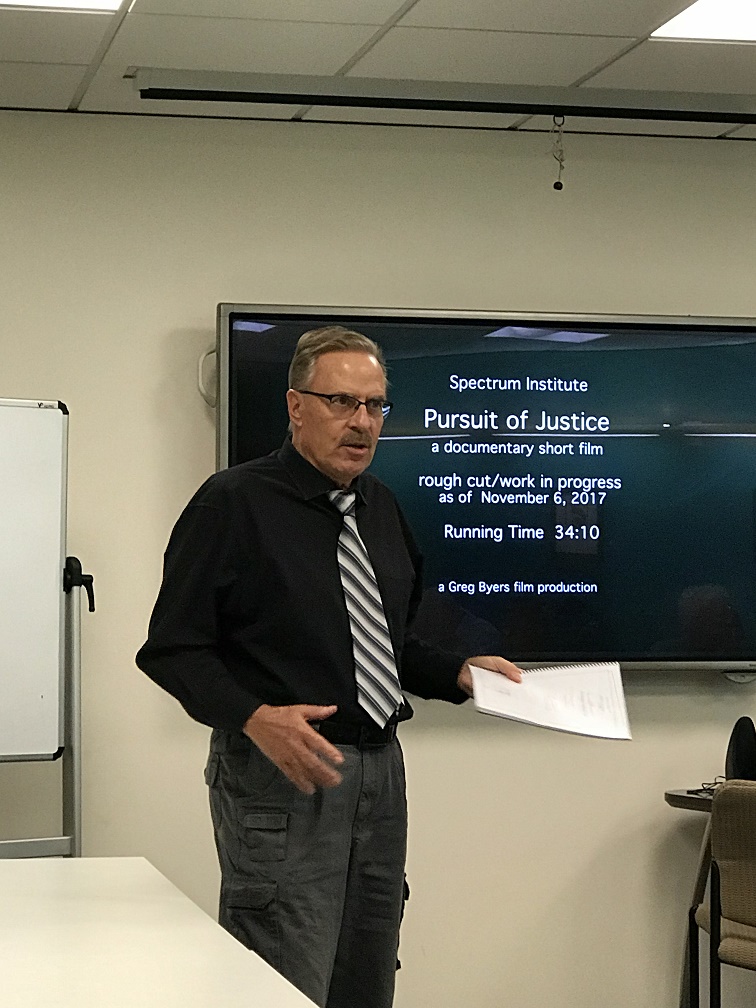 Thomas
F. Coleman, legal director of Spectrum Institute, is in
Seattle today along with Greg Byers, a filmmaker who is
producing a documentary on the guardianship reform
activities over the last few years of Coleman and a small
but growing network of advocates. A rough cut of
the film -- Pursuit of Justice -- is being shown
to a focus group to get feedback that will assist Byers
in the final editing process. The film, which is
about 34 minutes in length, was shot on locations in
California (Los Angeles, Lancaster, Joshua Tree, San
Diego, Sacramento, San Francisco) and in Washington
(Seattle and Olympia) as well as in Maryland and
Washington D.C. It highlights injustices to
Thomas
F. Coleman, legal director of Spectrum Institute, is in
Seattle today along with Greg Byers, a filmmaker who is
producing a documentary on the guardianship reform
activities over the last few years of Coleman and a small
but growing network of advocates. A rough cut of
the film -- Pursuit of Justice -- is being shown
to a focus group to get feedback that will assist Byers
in the final editing process. The film, which is
about 34 minutes in length, was shot on locations in
California (Los Angeles, Lancaster, Joshua Tree, San
Diego, Sacramento, San Francisco) and in Washington
(Seattle and Olympia) as well as in Maryland and
Washington D.C. It highlights injustices to  A
complaint will be filed tomorrow with the Supreme Court
of the State of Washington. It alleges that the
court is violating the Americans with Disabilities Act by
failing to adopt policies and procedures to ensure access
to justice for people with disabilities involved in adult
guardianship proceedings.
A
complaint will be filed tomorrow with the Supreme Court
of the State of Washington. It alleges that the
court is violating the Americans with Disabilities Act by
failing to adopt policies and procedures to ensure access
to justice for people with disabilities involved in adult
guardianship proceedings.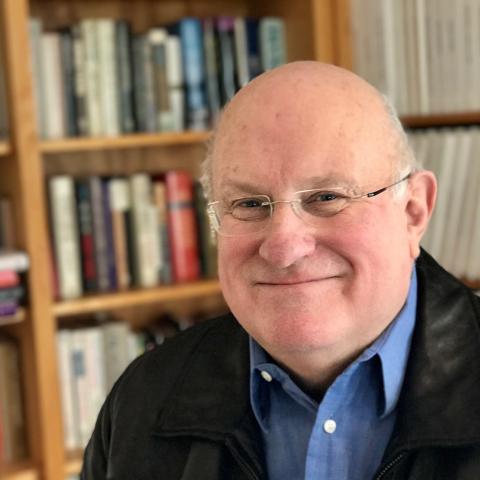 Tom
Wright, an advisor to the Disability and Guardianship
Project, was one of the producers who worked on the
film. He and lead producer Laura Checkoway will be
in Washington D.C. on June 12-14
Tom
Wright, an advisor to the Disability and Guardianship
Project, was one of the producers who worked on the
film. He and lead producer Laura Checkoway will be
in Washington D.C. on June 12-14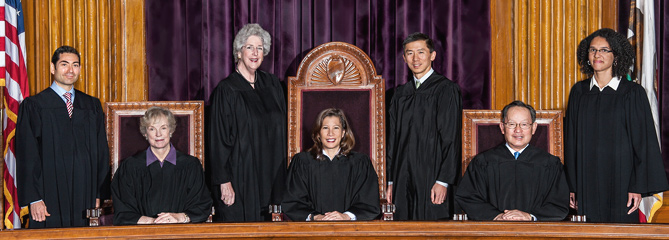
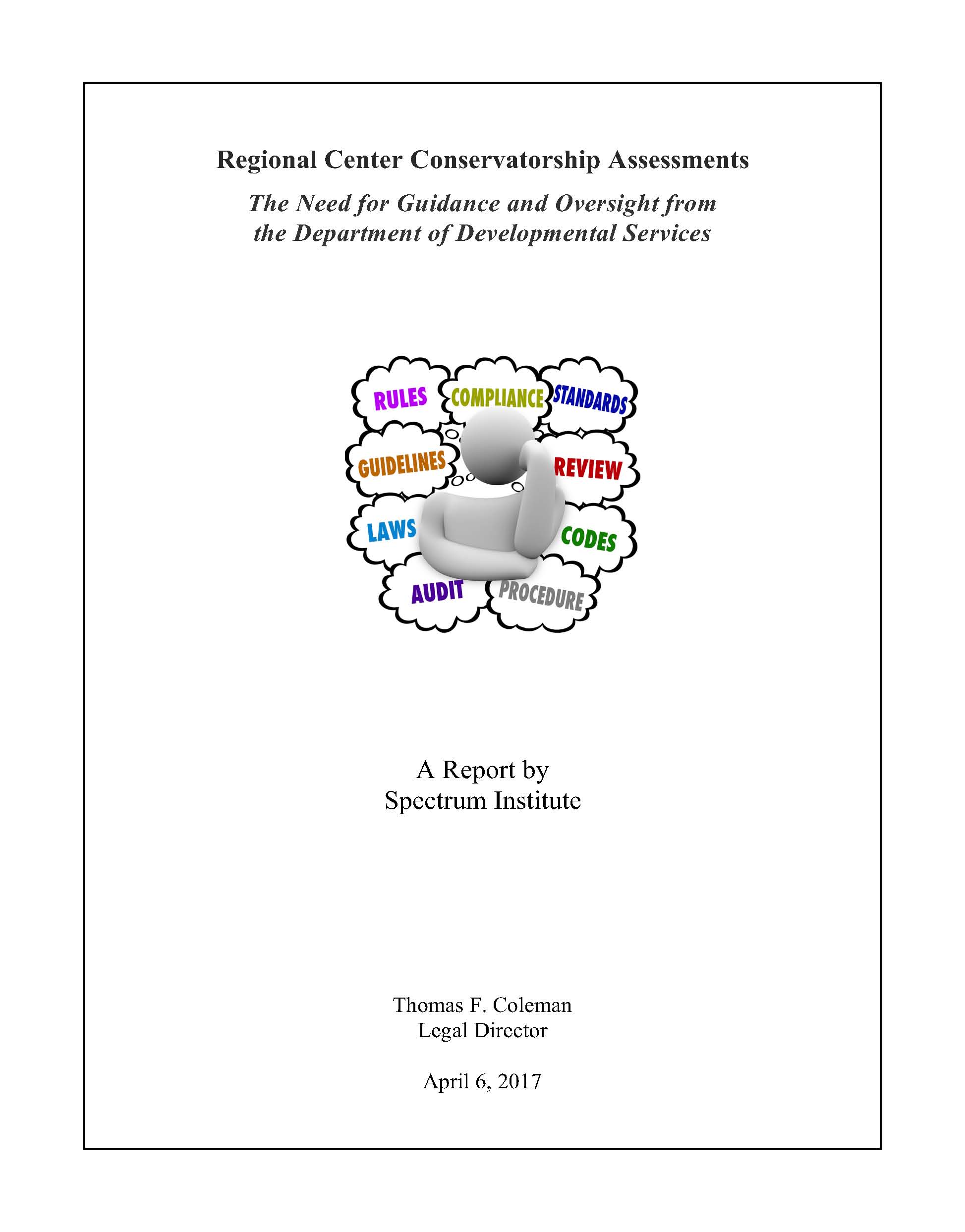 A report was released
today titled "Regional Center Conservatorship
Assessments: The Need for Guidance and Oversight from the
Department of Developmental Services."
A report was released
today titled "Regional Center Conservatorship
Assessments: The Need for Guidance and Oversight from the
Department of Developmental Services."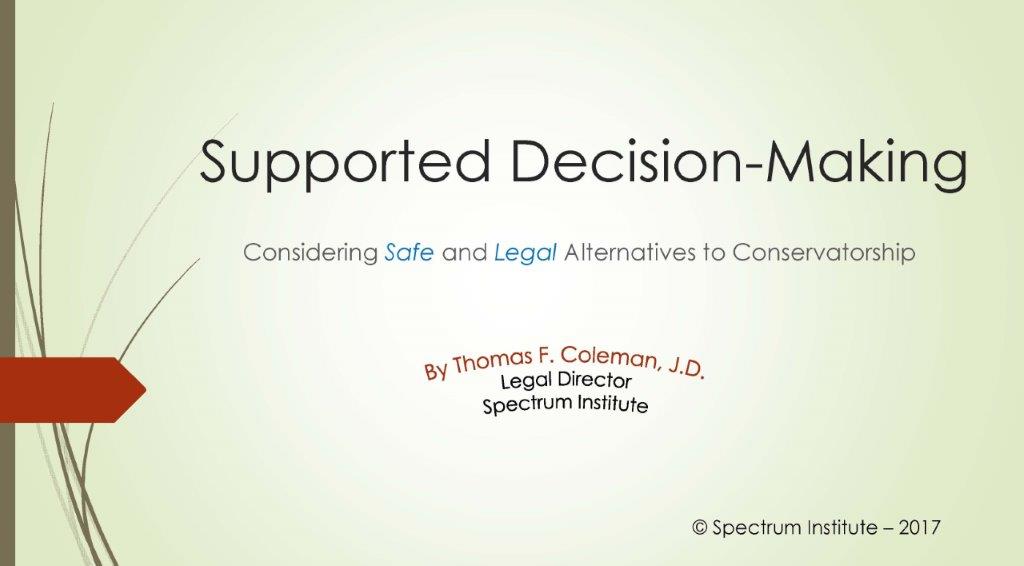
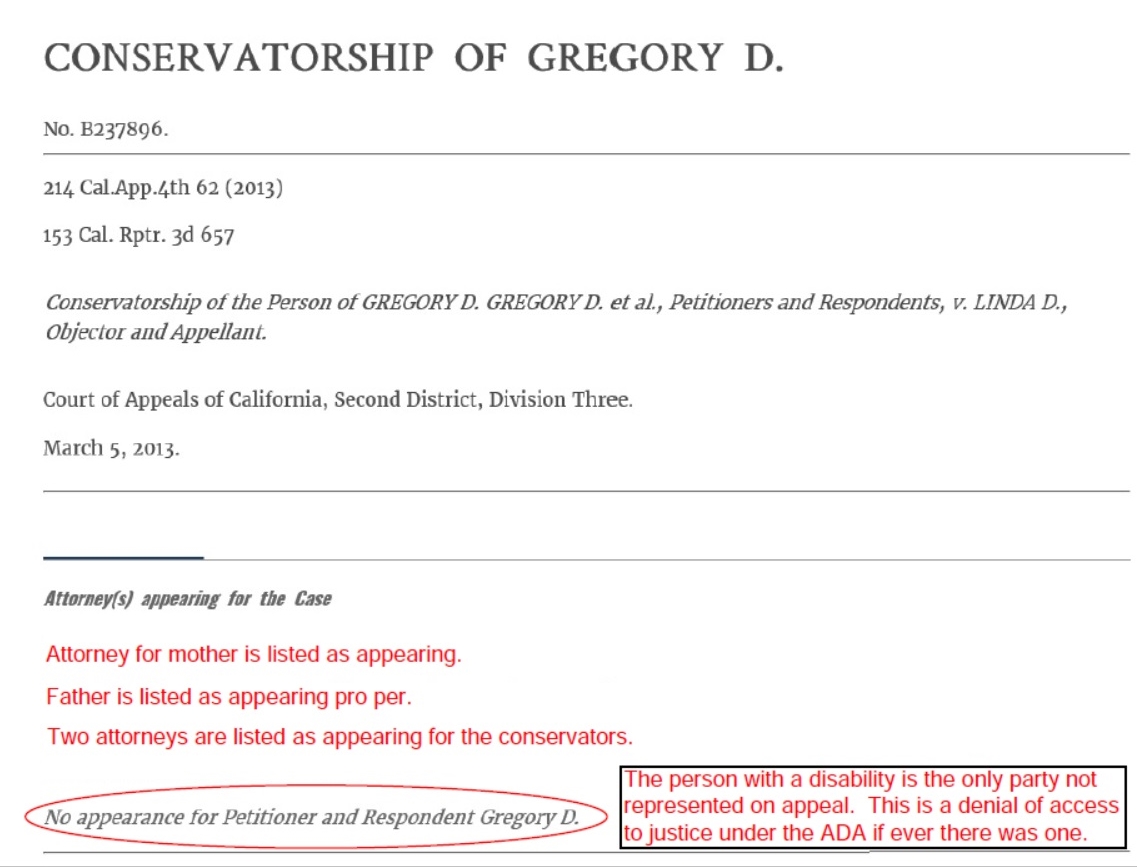 Spectrum
Institute will be sending letters to officials in
California to correct a systemic flaw in appellate
procedure when an appeal involves a litigant with a
cognitive or developmental disability who is not
represented by counsel on appeal. We are asking
California and national organizations to lend their names
to our letters. For more information about the
problem and how we suggest it may be solved,
Spectrum
Institute will be sending letters to officials in
California to correct a systemic flaw in appellate
procedure when an appeal involves a litigant with a
cognitive or developmental disability who is not
represented by counsel on appeal. We are asking
California and national organizations to lend their names
to our letters. For more information about the
problem and how we suggest it may be solved,  About
three dozen documents were added to the Digital Law
Library today. The documents include letters
and commentaries written by Thomas F. Coleman since the
library was created on November 1, 2016. To access
the compendium which lists and summarizes the documents
and provides a link to each one online,
About
three dozen documents were added to the Digital Law
Library today. The documents include letters
and commentaries written by Thomas F. Coleman since the
library was created on November 1, 2016. To access
the compendium which lists and summarizes the documents
and provides a link to each one online, 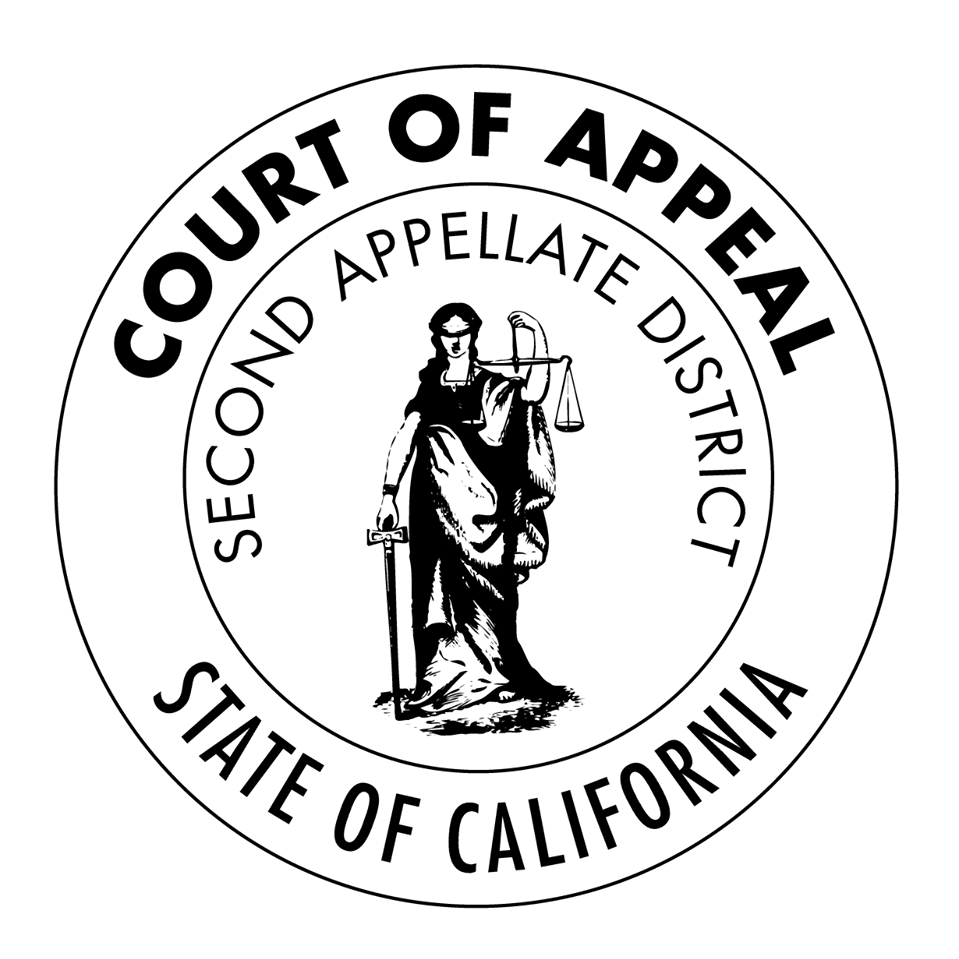 Spectrum
Institute sent a letter today to the California Court of
Appeal asking for permission to file a
friend-of-the-court brief in the case of Parisio v.
County of Los Angeles. The brother of Michael J.
Parisio Jr. (aka Mickey) contacted Spectrum Institute in
2012 to help save his brother Mickey from alleged abuse
by Mickey's parents who were also his conservators.
We got involved and were successful in having APS remove
Mickey from the home of his parents and have him admitted
to a hospital for care. APS contacted the probate
court which bungled the abuse investigation. Mickey
was returned to his parents and a few weeks later he was
dead. The autopsy report listed the reason for
death as "undetermined" pending further
investigation into the level of care by the
parents.
Spectrum
Institute sent a letter today to the California Court of
Appeal asking for permission to file a
friend-of-the-court brief in the case of Parisio v.
County of Los Angeles. The brother of Michael J.
Parisio Jr. (aka Mickey) contacted Spectrum Institute in
2012 to help save his brother Mickey from alleged abuse
by Mickey's parents who were also his conservators.
We got involved and were successful in having APS remove
Mickey from the home of his parents and have him admitted
to a hospital for care. APS contacted the probate
court which bungled the abuse investigation. Mickey
was returned to his parents and a few weeks later he was
dead. The autopsy report listed the reason for
death as "undetermined" pending further
investigation into the level of care by the
parents.  The current and planned
activities of the project have been summarized on one
page for the convenience of those who are interested in
our work. To read about our activities,
The current and planned
activities of the project have been summarized on one
page for the convenience of those who are interested in
our work. To read about our activities, 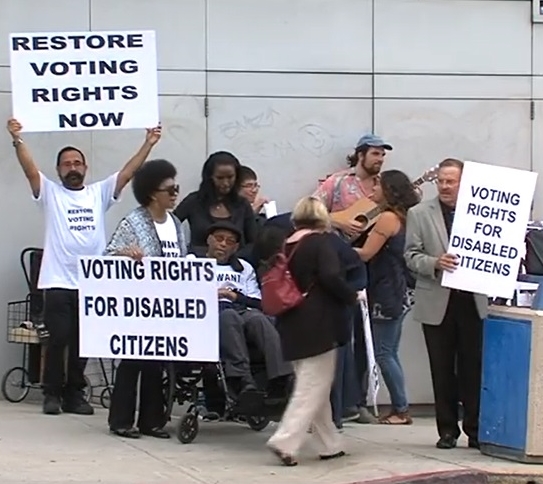

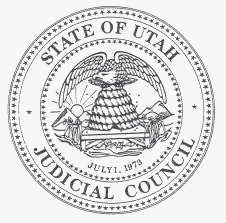 A
A  Thomas
F. Coleman, legal director of Spectrum Institute travels
today to Seattle, Washington. Documentary filmmaker
Greg Byers (left) is traveling with Coleman.
Thomas
F. Coleman, legal director of Spectrum Institute travels
today to Seattle, Washington. Documentary filmmaker
Greg Byers (left) is traveling with Coleman. 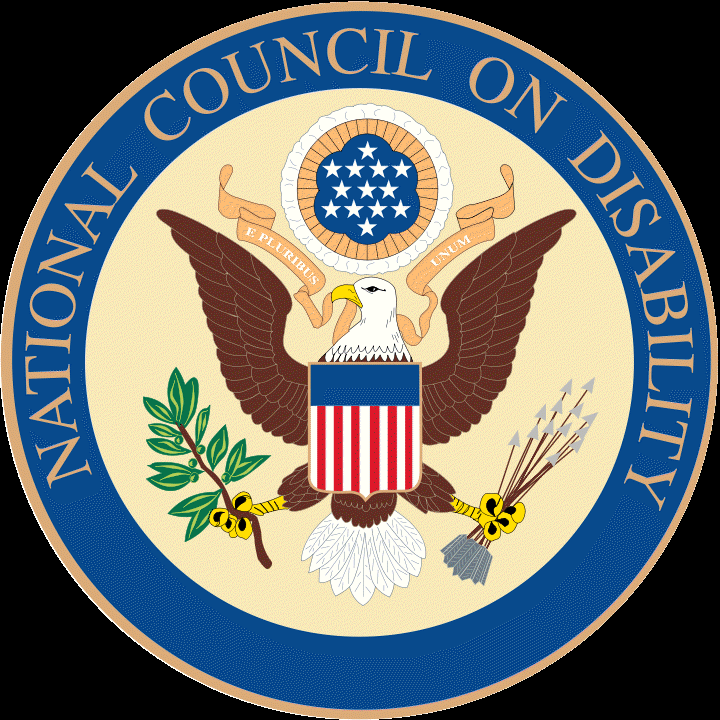 A
letter was sent today to the National Council on
Disability. Guardianship reform is an issue to be
addressed at its quarterly meeting on February 11 and
12. We are bringing to the Council's attention our
numerous publications on the issue of guardianship
reform, especially those that explain how state
guardianship systems must comply with various federal
constitutional and statutory provisions. To reach
the letter,
A
letter was sent today to the National Council on
Disability. Guardianship reform is an issue to be
addressed at its quarterly meeting on February 11 and
12. We are bringing to the Council's attention our
numerous publications on the issue of guardianship
reform, especially those that explain how state
guardianship systems must comply with various federal
constitutional and statutory provisions. To reach
the letter,  Attorney
Thomas F. Coleman is available to speak to your agency or
organization about the Americans with Disabilities Act
and how it requires courts to appoint counsel to provide
effective advocacy services for guardianship respondents,
to train the attorneys, and to monitor their
performance. Coleman has more than
four decades of experience educating and advocating for
various civil rights causes, the most recent of which
involves access to justice for people with intellectual
and developmental disabilities in guardianship
proceedings. For a description of
the presentation,
Attorney
Thomas F. Coleman is available to speak to your agency or
organization about the Americans with Disabilities Act
and how it requires courts to appoint counsel to provide
effective advocacy services for guardianship respondents,
to train the attorneys, and to monitor their
performance. Coleman has more than
four decades of experience educating and advocating for
various civil rights causes, the most recent of which
involves access to justice for people with intellectual
and developmental disabilities in guardianship
proceedings. For a description of
the presentation,